KASELEHLIE PRESS



By Bill Jaynes The Kaselehlie Press
October 16, 2024
Pohnpei—Under the theme “Right to Foods for a Better Life and a Better Future,” the FSM Department of Resources and Development (FSM R&D) held a major event at the Kolonia Gymnasium to celebrate World Food Day. Over 200 students from all of Pohnpei’s high schools participated in the event, which was designed to promote access to nutritious food for all, with an emphasis on locally grown and harvested foods.
World Food Day is an annual event observed globally on October 16 to promote awareness and action for those suffering from hunger and to emphasize the need for sustainable food systems. Established by the United Nations Food and Agriculture Organization (FAO) in 1979, the day focuses on ensuring food security, improving nutrition, and advocating for access to healthy and sustainable food for all.
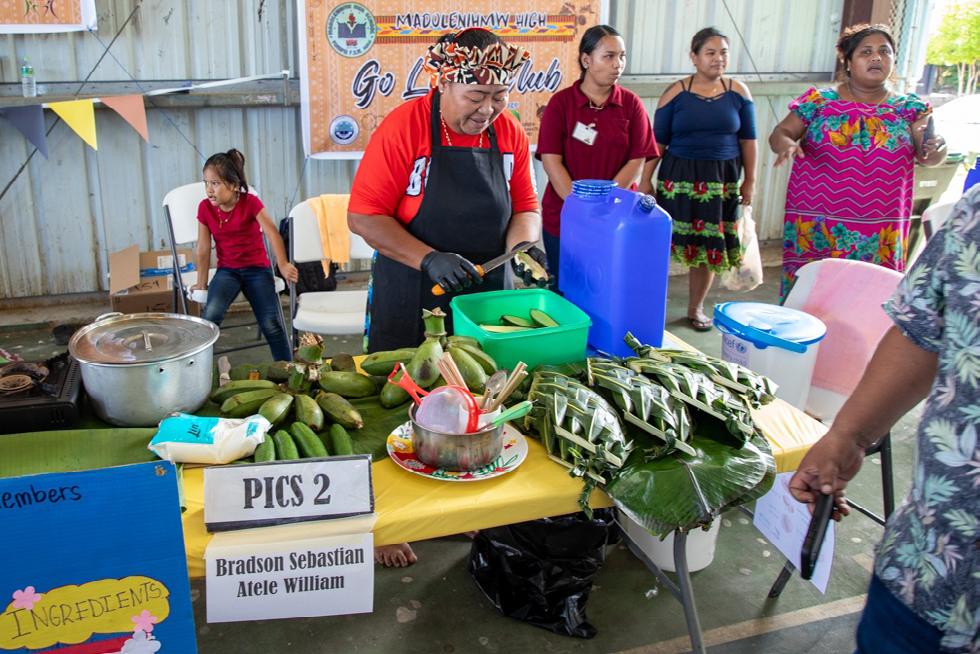
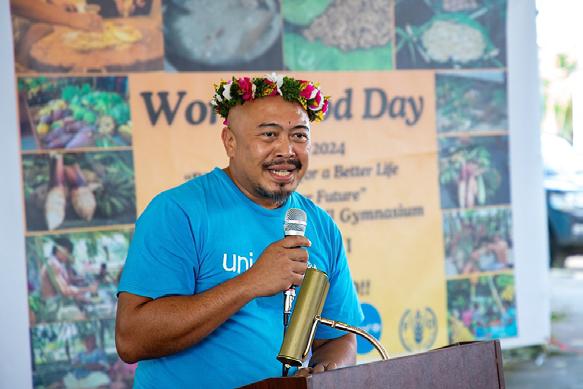
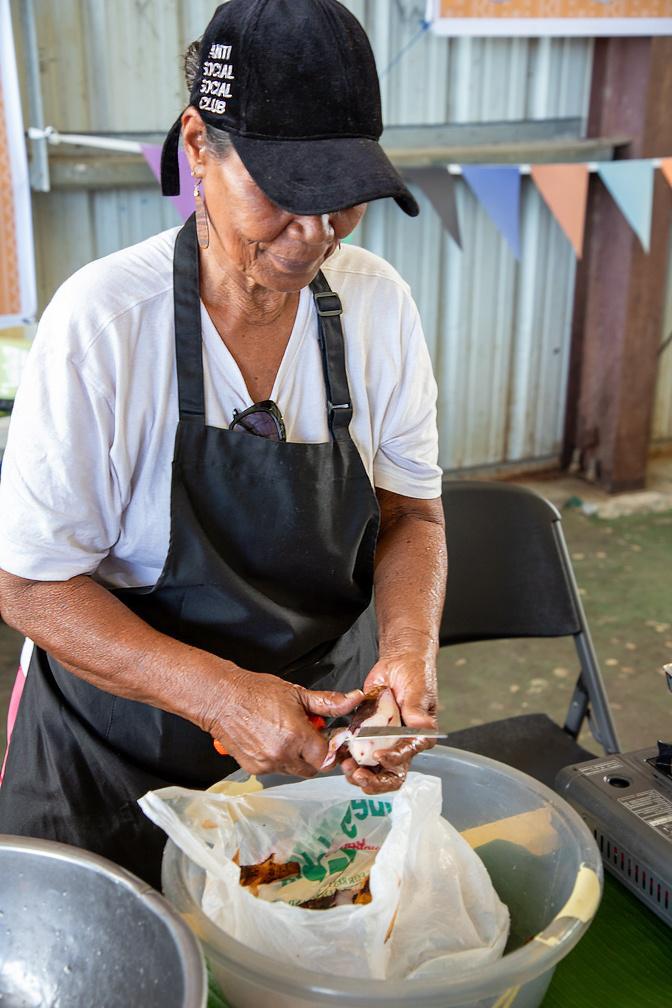
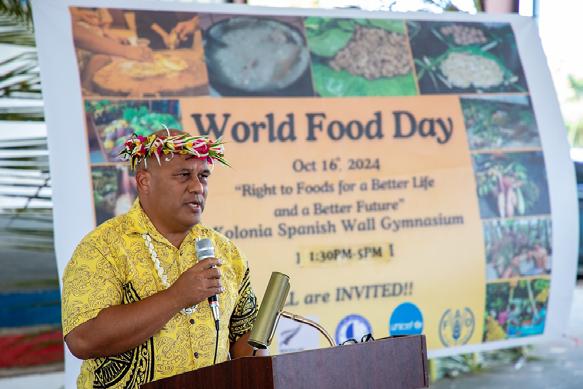
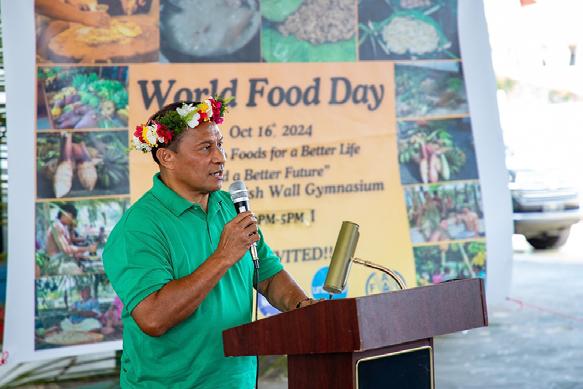
By Bill Jaynes
The Kaselehlie Press
October 20, 2024
Pohnpei—After conducting a requested surprise cash count of the seven approved FSM Government collection agencies, the Office of the National Public Auditor (ONPA) has indicated that it may be referring one deficiency to its Compliance Investigation Division (CID). The CID is the division of ONPA that conducts investigations which could lead to referrals to the FSM Department of Justice for possible criminal prosecution.
The audit uncovered that on June 21, 2024, the Quarantine collection point did not deposit its collections of $323 with the FSM Treasury as required. Auditors recommended that the Secretary of the Department of Finance and Administration (DOFA) should step in and ensure that the money is recovered and deposited. They also recommended that DOFA should work with the Department of Resources and Development (R&D) to establish mechanisms to ensure that all future deposits are properly made.
Secretary Akinaga of FSM R&D responded, saying that her department has initiated steps to ensure that the $323 is recovered and deposited, having charged the Quarantine Officer in Charge with making this a priority. She also mentioned that R&D is conducting an internal review of its cash handling and deposit procedures.
Secretary of DOFA Nakanaga said in her response that she agrees with the finding and the recommendation to forward the matter to the CID of ONPA for further action.
The surprise cash count of the Customs and Tax Administration (CTA) and the FSM Postal Service revealed that reconciliations of banked deposits were not performed in a timely manner. ONPA noted that the DOFA reconciliation team, consisting of three employees, is responsible for the timely reconciliation of 54 FSM bank accounts. However, the reconciliation team does not have online banking access. Apparently, only the Secretary of DOFA and the Assistant Secretary of Treasury have online banking access. The team had to

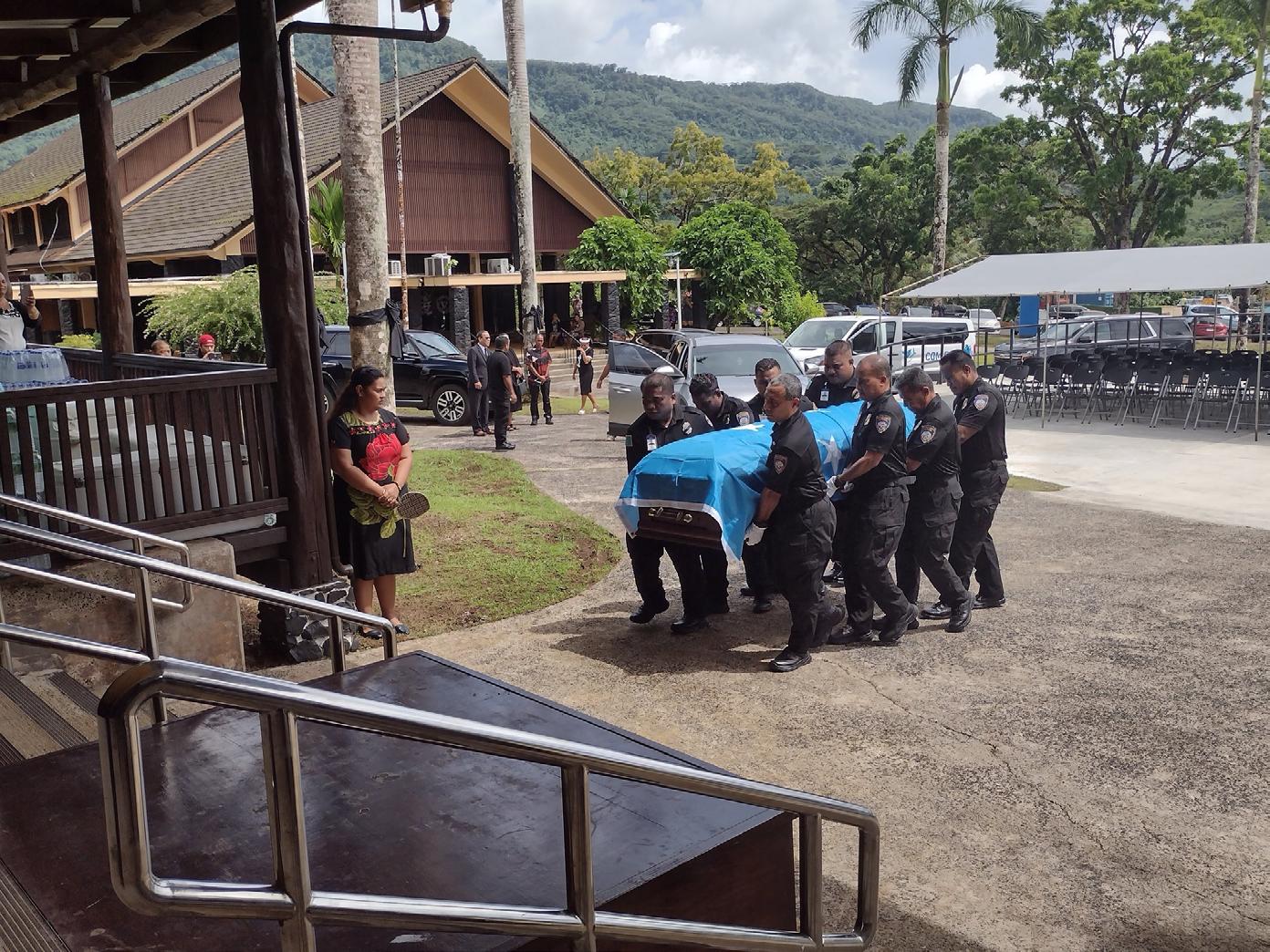
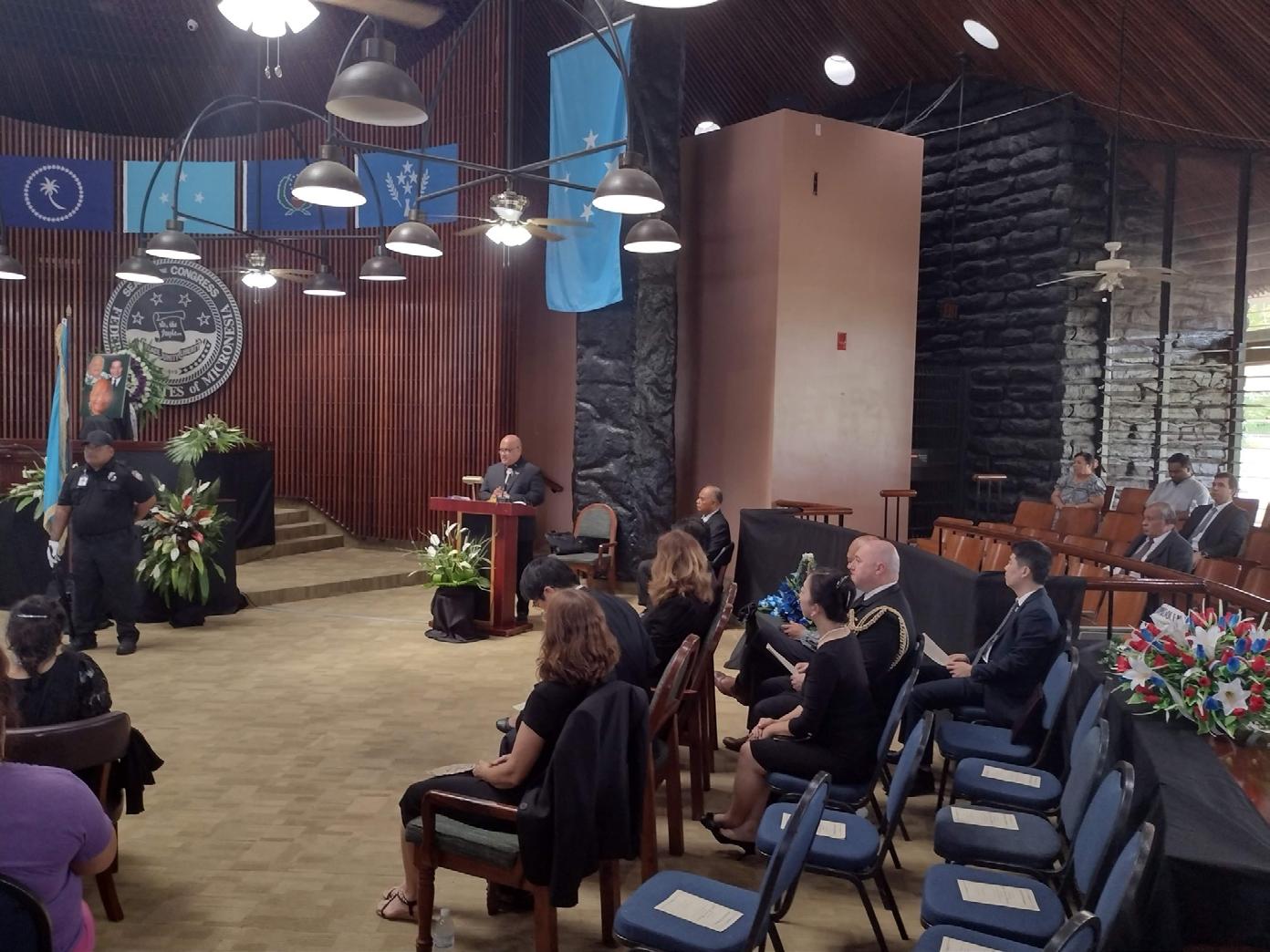
Pohnpei Public Information
October 14, 2024
Palikir, Pohnpei—Governor Stevenson A. Joseph, accompanied by First Lady Dr. Aina Garstang, solemnly participated in the state funeral services honoring the life and legacy of the late John Richard Haglelgam, the second President of the Federated States of Micronesia (FSM). Governor Joseph and the First Lady joined President H.E. Wesley W. Simina and the First Lady of the FSM at Pohnpei International Airport to receive the body of the late President Haglelgam, beginning a series of ceremonial tributes.


At the FSM Congress chamber, Governor Joseph delivered heartfelt welcoming remarks, paying tribute to President Haglelgam’s enduring contributions to the nation. Reflecting on the remarkable journey of the late President, Governor Joseph said,”John Richard Haglelgam’s story is one we all know so well, yet it bears repeating as a testament to the power of determination, resilience, and service. He was a boy from the remote islands of Micronesia, born when the dream of an independent nation seemed distant. But through sheer willpower, a relentless pursuit of education, and an unwavering belief in the potential of his people, he rose to the highest office in the land.”
Governor Joseph concluded his remarks by expressing gratitude for President Haglelgam’s legacy, which will continue to inspire generations of Micronesians to strive for progress and unity.
The Pohnpei State Government joins the people of FSM in mourning the loss of a true statesman and a beloved leader whose life embodied the spirit of service and the vision of a brighter future for all.

By Bill Jaynes The Kaselehlie Press
October 19, 2024
Pohnpei—Thirty-eight boat owners and Pohnpei Fishing Club members registered to participate in the 16th Annual Vital Tournament on October 4. Thirty-three boat owners actually showed up for a beautiful day of fishing, and some impressive catches were made. Vital, FSM's petroleum company, awarded $100 fuel vouchers to all participating boat owners, in addition to offering substantial cash prizes for winning fish, which always generates excitement among anglers and ensures a large turnout.
Alex Ysam landed the biggest fish of the day, a 113.2-pound marlin, earning him $550. It wasn’t the only marlin caught that day—another was just short of the 100-pound minimum fish size regulation established by the club.
The second-largest fish, for a $450 prize, was an 87.4-pound yellowfin tuna caught by Trishia Panuelo. Will Cognack’s 75.4-pound yellowfin earned the $350 third-place prize. A sailfish weighing 66.4 pounds, well over the club's 50-pound minimum, won third place for $200. The angler, listed only as Robinson in the club’s records, was missing a last name. Kenty Spencer, a member of the well-known Spencer angling family, secured sixth place with a 52.2-pound yellowfin, winning $150.
Prizes of $100 and $50 were awarded for the biggest fish in five other species categories that didn't qualify for the overall largest fish prizes.
Kenty Spencer caught another large yellowfin, weighing in at 50 pounds, taking first place in the yellowfin category. His fish was followed closely by a 46.8-pound yellowfin caught by Lensileen Nicholas.
Though there was a bit of confusion in the skipjack category results after the weigh-in, when the dust settled, Rodney Phillip’s 17-pound skipjack took first place, followed closely by Andrew Sipos with a 16.8-pound skipjack.
Hilarko David caught the largest wahoo of the day at 21.4 pounds, which was also the only wahoo caught in the
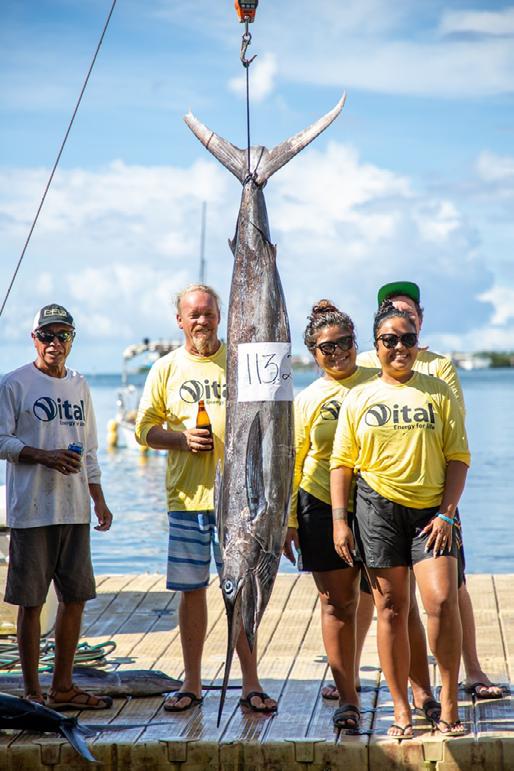
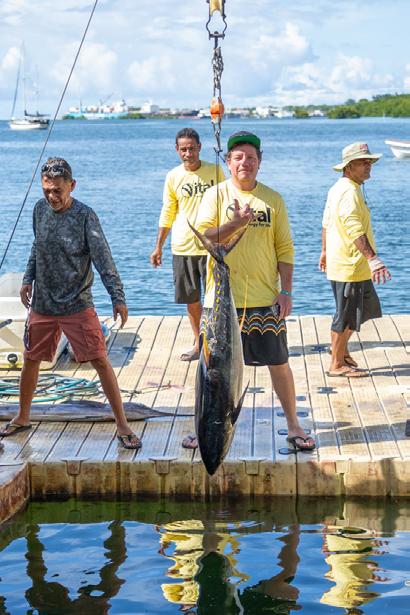
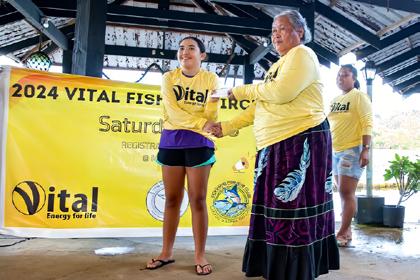
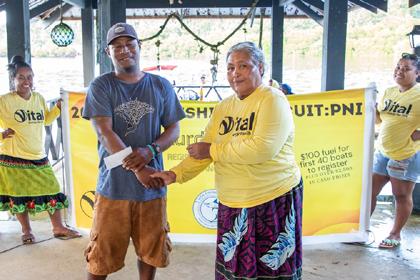
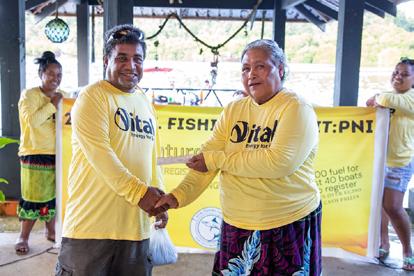
tournament.
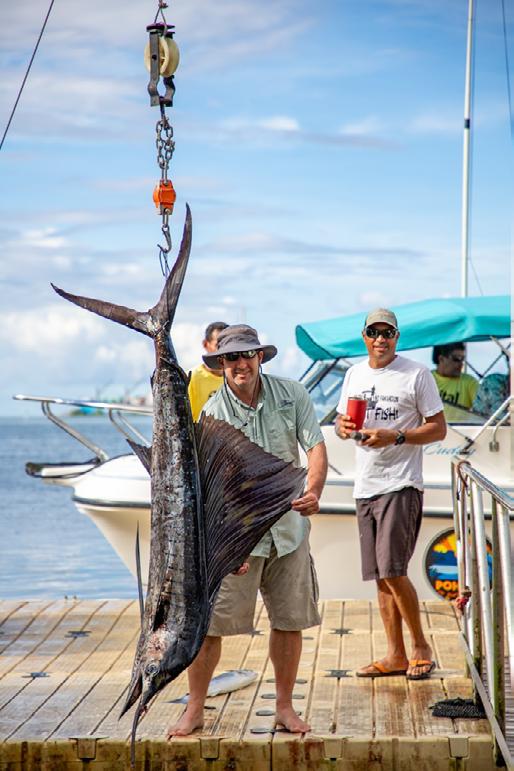
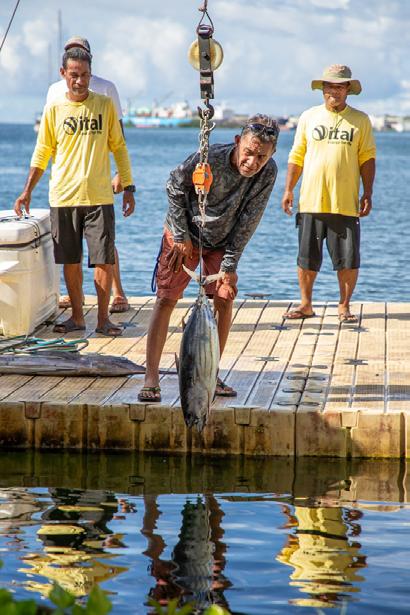
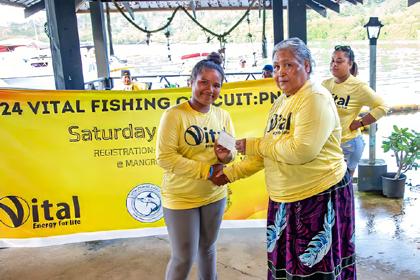
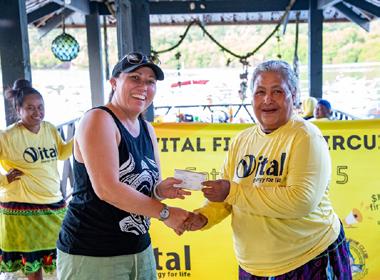
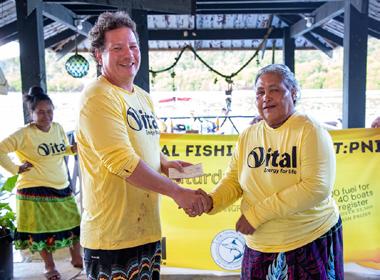
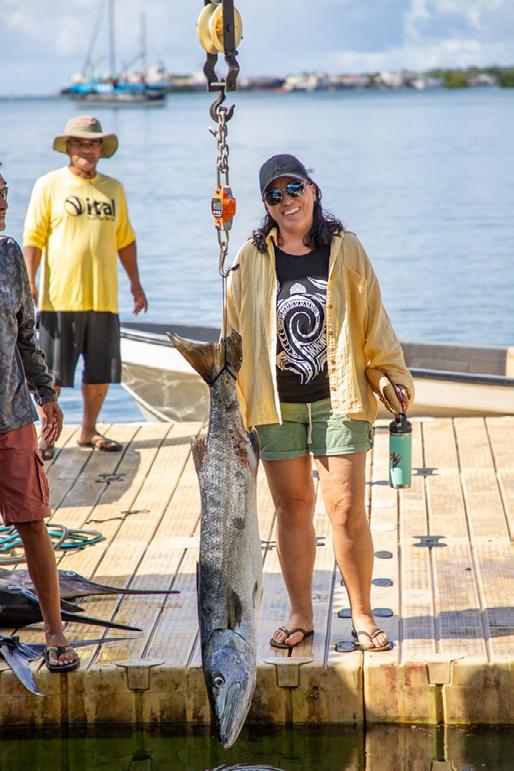
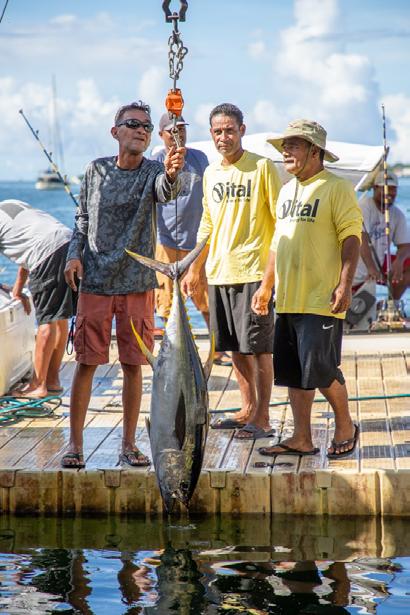
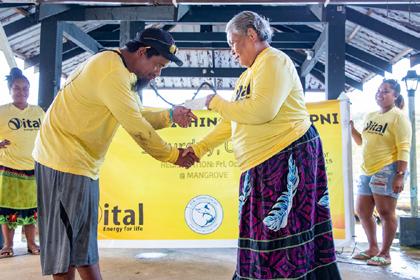
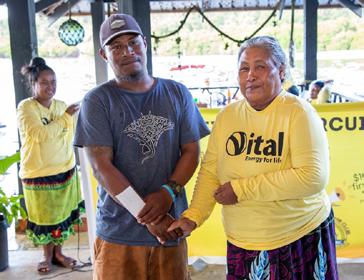
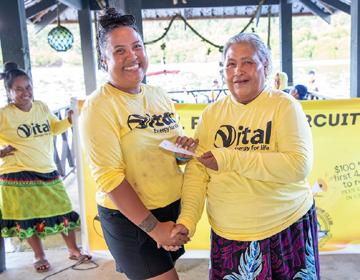
Two grand trevallies (GT) were caught, both winning prizes. Anna Rose Abraham landed a well-sized 10.4-pound GT for first prize, while Wagner Martin's 1.6-pound GT took second prize.
Lara-Trott landed a massive 33.6-pound barracuda, earning top honors in that category. The runner-up was Pauli Saimon with an 8.8-pound “barri”.
Lensileen Nicholas received a $125 check as the top lady angler for her 21.4-pound yellowfin.
Aria Wichman was awarded $25 as the top junior angler for her 15-pound dogtooth tuna, which, for statistical purposes, the club
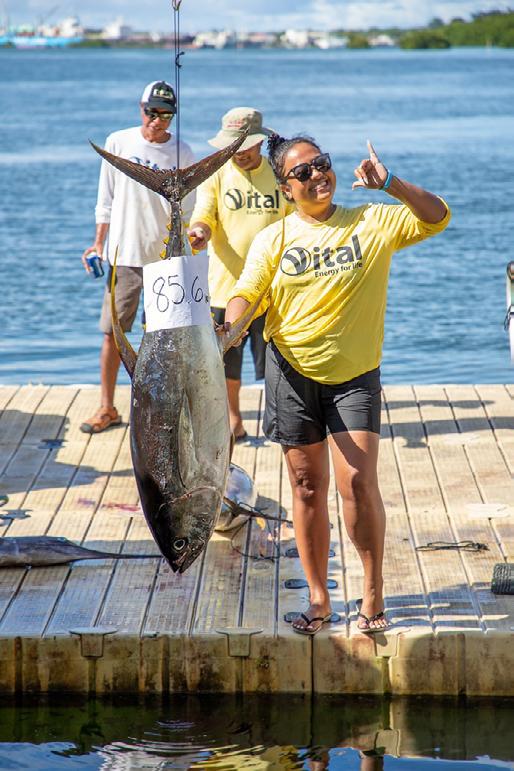
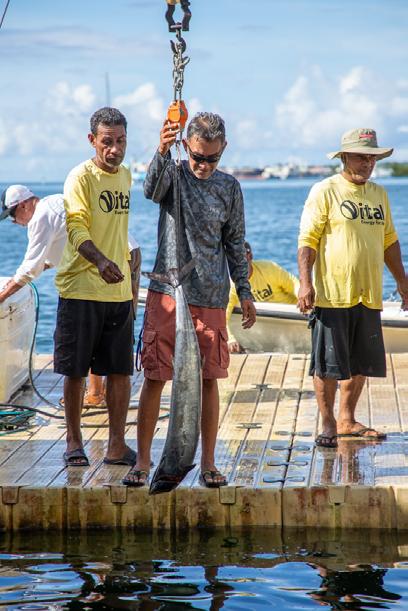
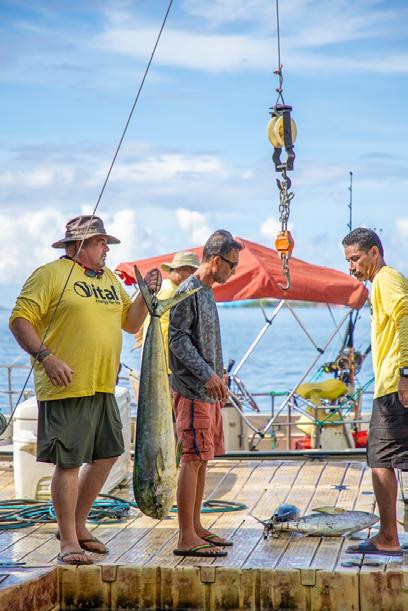
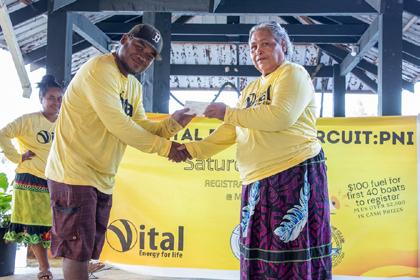
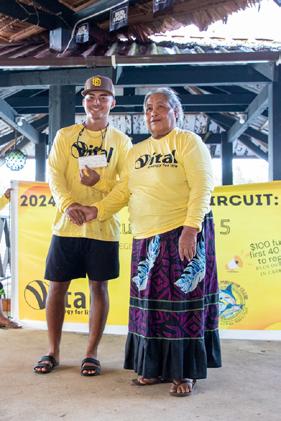
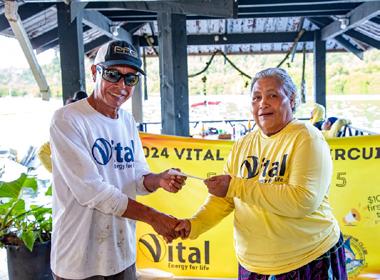
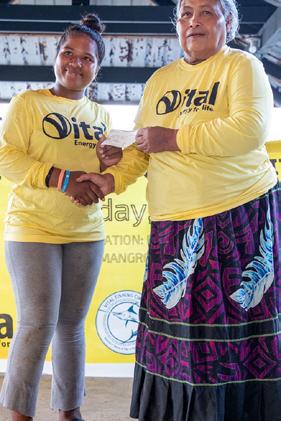
classifies as part of the yellowfin tuna family.
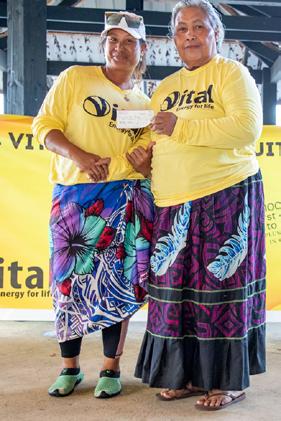
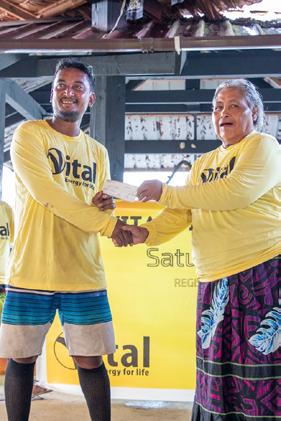
There were no injuries, accidents, or lost boaters. The club takes pride in its strict safety requirements. During check-out for each tournament, the club ensures that every boat has proper safety equipment, including an EPIRB (Emergency Position Indicating Radio Beacon).
The next tournament, the Budweiser Tournament, is scheduled for October 19, 2024. However, official results can sometimes be slow to arrive from the club, so we will cover that tournament in the next issue of The Kaselehlie Press on November 6, 2024.

Continued from front page
The event, which included demonstration kiosks, culminated with a segment entitled “Taste of Tradition and Nutrition: Parent Local Recipe Showdown,” which kicked off immediately following speeches during the formal ceremony.
The event was a collaborative effort by FSM R&D, with partners including the United Nations Food and Agriculture Organization (FAO), United Nations Children’s Fund (UNICEF), and the College of Micronesia-FSM Center for Entrepreneurship. Representatives from each of the four resident embassies to the FSM attended, as did Governor Stevenson Joseph and Vice President Aren Palik.
Governor Joseph gave the opening speech. He explained that the reason the Pohnpei State Government was not participating in the event was based on Pohnpeian tradition. He reminded attendees that harvests in Pohnpei are cyclical, and that Pohnpeians are currently in the process of harvesting yams for presentation as the first fruits to the traditional leaders. He said that when that process is completed, Pohnpei will have its own food day in December, and he encouraged everyone to attend that celebration. He challenged the national organizers to consider Pohnpei’s traditions when scheduling future events, as this event was held in Pohnpei.
Since before taking office, Governor Joseph has made food security a high priority for Pohnpei. He said that Pohnpei’s decision not to participate this year does not in any way indicate a lack of support, especially for local food cultivation. “My generation grew up on processed food. And you can see how we are right now. We're fat. We don't look healthy. I have high blood pressure because of that. At that time, our parents thought it was a miracle because they didn’t have to get up at five o'clock in the morning to boil bananas and taro anymore. They just bought bread in the store or cooked rice early in the morning, and that's what we ate before we went to school. And it tastes good, I have to admit. But we need to realize that it's not good for our bodies... It is my hope that you, the younger generation, will take that to heart and start now.”
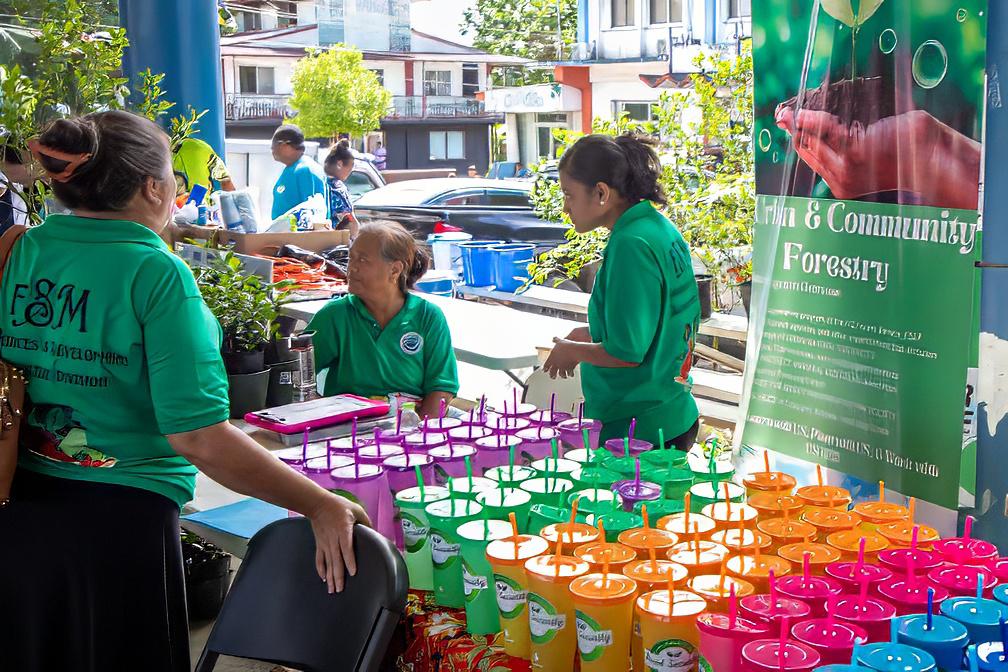
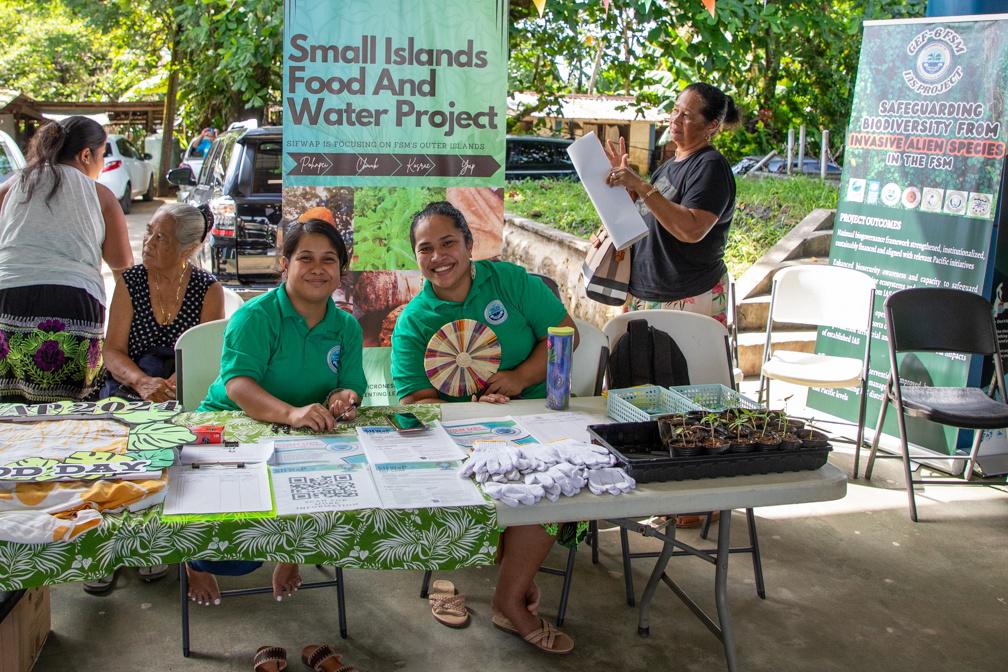
President Palik opened his speech by telling the Governor that the national government will seriously consider adjusting future events to coincide with the first harvest.
“As representatives of various sectors, including education, government, and international partners, you exemplify the strength of collaboration,” he continued. “It is through our collective efforts that we can develop innovative solutions, advocate policies, and promote sustainable practices that support our local communities... Let us work in unison to create a future where everyone has access to nutritious food, where our children can thrive, and where communities can prosper.”
In his speech, UNICEF Country Representative Cromwell Bacareza provided disturbing statistics on the prevalence of non-communicable diseases (NCDs), particularly obesity in the FSM, and noted that the FSM has committed to reducing obesity by 5 percent. “Today's agenda not only celebrates our achievements but also strengthens our resolve,” he said. “Let us remember that our commitment to providing clean water, nutritious food, and promoting good hygiene practices is a shared responsibility, one that starts with us. Through strong leadership and collective efforts, we can close gaps in access and practice to achieve children's rights to water and nutritious
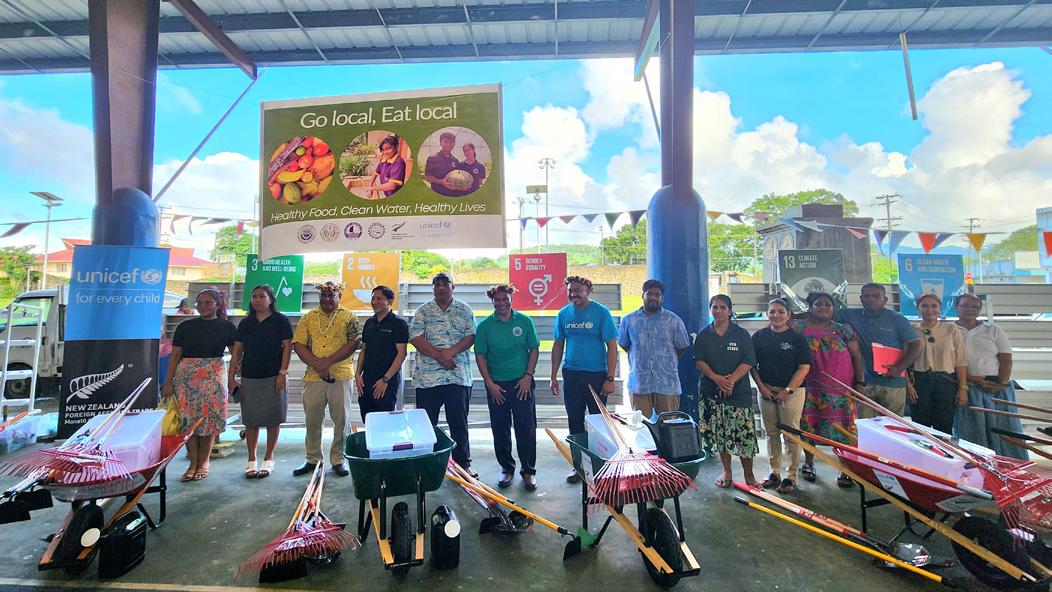
UNICEF supplied WASH and nutrition starter kits to the participating schools. The starter kits which include tools for gardening, safe food handling, and promoting clean water and sanitation are a key part of UNICEF’S support for the Go Local clubs, helping students focus on healthy food production and hygiene practices.
food.”
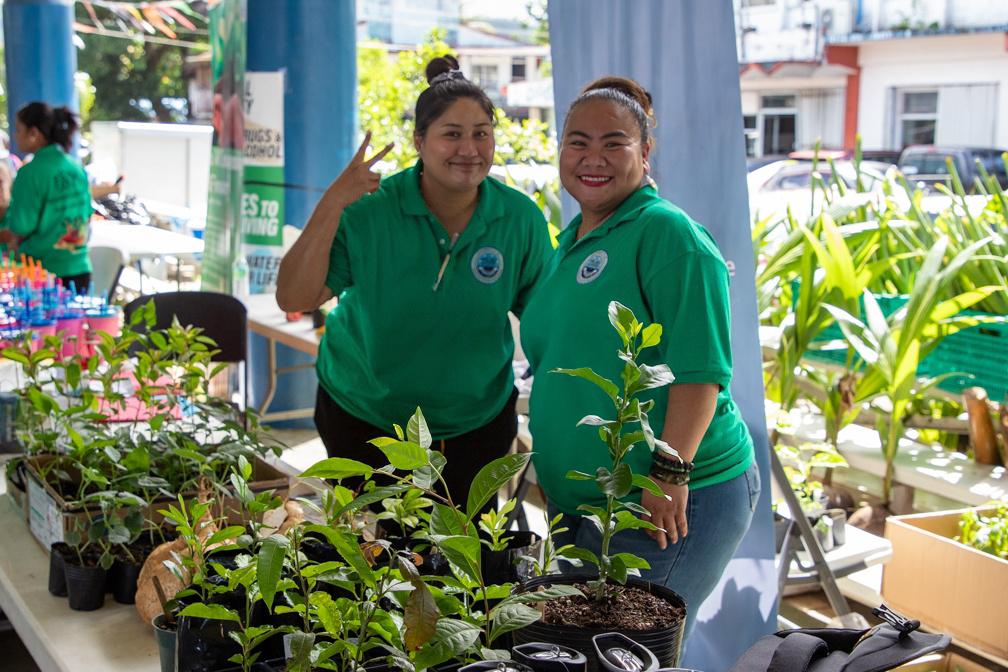
After the formal ceremony, the cooking showdown began. Contestants from each of the represented high schools had two hours to prepare recipes featuring banana, taro, yam, sweet potato, or breadfruit. The dishes they prepared were judged on taste, creativity and innovation, presentation, speed and simplicity of preparation, teamwork, nutritional value, and costeffectiveness.
The team of Meereina Inatio and her father, representing Calvary Christian Academy, was awarded first place. D-Shawn Frederick and his teacher won second place, representing Nanpei Memorial High School. Bradson Sebastian and his aunt took third place for Pacific Islands Central School.
The 200-plus students who attended the event didn’t simply idle for two hours while the two-person teams cooked. Presenters gave lively demonstrations and hosted agriculture-based games during that time.
Organizers called the World Food Day event a resounding success in their efforts to promote the importance of food security and the high value of local foods.
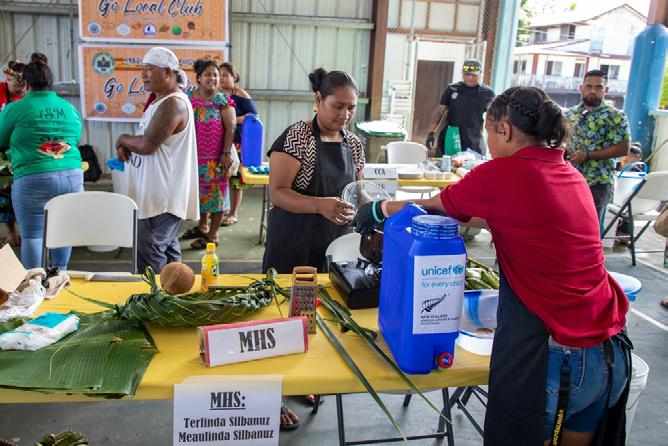
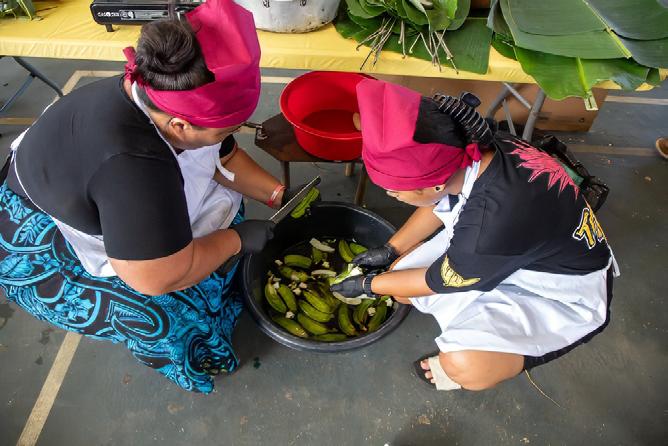
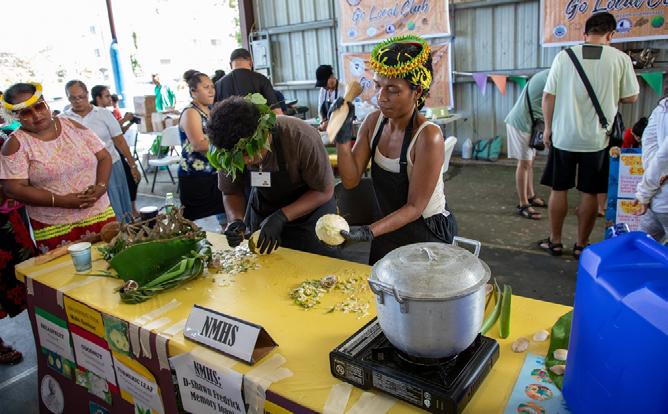
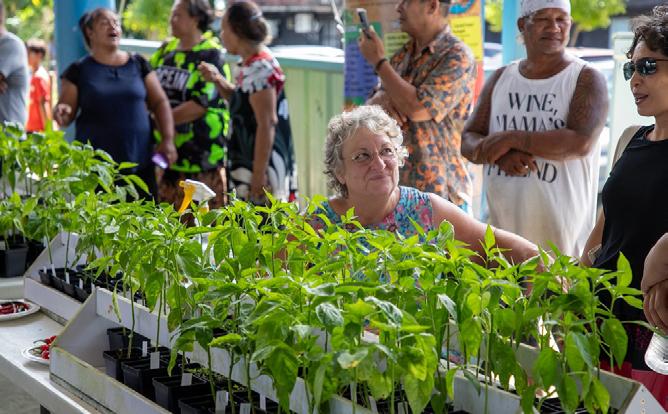
World Bank
October 15, 2024
Suva, Fiji— The World Bank today launched its latest Pacific Economic Update, calling for a major boost in investment to address the region’s slowing economic growth. The report, Diminishing Growth amid Global Uncertainty: Ramping Up Investment in the Pacific, underscores the urgent need for targeted investment to create jobs, improve infrastructure, and build resilience against climate change amid global uncertainty. These actions are crucial for improving the livelihoods of Pacific communities and narrowing the income gap with higher-income nations.
The report highlights that growth across the Pacific has fallen to 3.6 percent in 2024, down from 5.8 percent in 2023 as the post-pandemic rebound fades. Growth is settling into a slower pace, signaling a weaker outlook compared to past performance. This
Continued from front page
wait for those officials to provide bank statements either electronically or by mail, which were received on the 25th of each month.
ONPA stated that DOFA may not detect unauthorized transactions or potential fraud quickly if the bank reconciliations are not completed in a timely manner. While no evidence of fraud was listed, the potential for it was highlighted given the situation.
ONPA’s third finding emphasized that internal controls, such as Standard Operating Procedures, which were absent or outdated at some collection points, are critical for maintaining consistency, efficiency, safety, and compliance.
Lastly, the cash count revealed that at the CTA Kolonia Field Office and CTA Post Office, there was poor and improper use of safe custody facilities to secure collected revenues and receipts. At the
slowdown is attributed to weaker investment, increasing climate risks, and structural challenges, all amid continuing global uncertainty that continues to hold back progress. The report emphasizes that without immediate action to ramp up investment, Pacific nations may struggle to reduce poverty or generate new economic opportunities for the region’s people.
“The Pacific faces mounting challenges, but there is also an opportunity for transformation,” said Stephen N. Ndegwa, World Bank Country Director for the Pacific and PNG. “By prioritizing investments in key sectors and increasing efficiency, Pacific countries can unlock economic growth that directly benefits local communities, creates jobs, and strengthens resilience to the impacts of climate change.”
Click here for continuation on page 8
Kolonia Field Office, there was no safe, as it had been stolen during a previous break-in. ONPA auditors noted that at the CTA-Post Office station, a cash drawer was available to the clerk, but it did not have a lock. Additionally, sequenced receipts were not filed in a secured lockable box but left in open filing cabinets.
Secretary Nakanaga wrote in her response that the audit activities went beyond the scope of the original request for the review. She mentioned that they had expected the surprise cash count to be completed within three months to allow DOFA ample time to prepare its action plans on internal controls before the end of the fiscal year.
However, she agreed with the first three findings of the inspection and stated that her department is taking action to address these issues. She only partially agreed with the final finding, stating that the blank checks are not pre-numbered and "have been stored in the Treasury all these years. Our corrective action plan is being implemented to improve the storage facilities and to ensure that secure lockable boxes are available at all times to safeguard all collections."

Country: Federated States of Micronesia
Project: Pacific Islands Regional Oceanscape Program – Economic Resilience (PROPER)
Grant No.: IDA-E371-FM
Assignment Title: Environment & Social Officer
Reference No. (as per Procurement Plan): FM-NORMA-450785-CS-INDV
The National Government of the Federated States of Micronesia (FSM) has applied for financing from the World Bank toward the cost of the Pacific Island Oceanscape Program – Second Phase for Economic Resilience and intends to apply part of the proceeds for consulting services.
The consulting services (“the Services”) include supporting the implementation of Environment and Social (E&S) aspects of the project. The Officer will be guided, trained, and mentored to undertake the assignment by the Environment and Social Specialists based in the Central Implementation Unit (CIU), for an initial twelve (12) months period commencing approximately in November 2024. This is a full-time position and may be extended based on “satisfactory performance” i.e. satisfactory performance as determined through a performance evaluation against agreed key performance indicators and availability of funds. The position supports the FSMPROPER Project implementation phases of the project.
The detailed Terms of Reference (TOR) for the assignment DOFA website at dofa.gov.fm or at the NORMA website at norma.fm.
The FSM National Oceanic Resource Management Authority (NORMA) now invites eligible individuals (“Consultants”) to indicate their interest in providing the Services. Interested Consultants should provide information demonstrating that they have the required qualifications and relevant experience to perform the Services (attach curriculum vitae, copies of degrees and relevant certificates with description of experience in similar assignments, similar conditions, etc.).
The criteria for selecting the Consultant are:
Required experience and educational background:
• Associate Degree in social science, environmental science, or related fields from a recognized accredited institution.
• At least 3 years of working experience in government or project financed by international agencies, NGO or private sector.
• Experience in coordination with different agencies, organizing stakeholder’s meetings, facilitation.
• Good communication skill including oral and written communication skills in the substantive and technical areas as described in scope of services.
• Proficiency in using Microsoft applications.
• Fluency in written and spoken English and other state languages spoken in FSM.
• The successful candidate must be willing to work for extended periods without direct supervision and be able to travel to states and sub-project sites.
• Bachelor’s Degree in Environment/ Fisheries Sciences or Social Sciences or related fields with 2 years of work experience
• Knowledge of FSM national and State law related to Environment and familiarity with WB Environment and Social Framework.
• Experience in environmental and social impact risk assessment, mitigation.
• Training in Environmental & Social Risk Management Sector from a development agency or similar.
• Demonstrated ability to work under pressure and pay attention to detail.
• Ability to learn quickly, and organized and detail-oriented person.
• Demonstrated ability to work collaboratively, interactively, and proactively within complex team and stakeholder arrangements.
• Working experience in multicultural environment with multi-disciplinary team.
The attention of interested Consultants is drawn to paragraph 3.14, 3.16 and 3.17 of the World Bank’s Procurement Regulations for IPF Borrowers dated September 2023 (“the Regulations”), setting forth the World Bank’s policy on conflict of interest.
Further information can be obtained at the address below during office hours 0800 to 1700 hours Pohnpei local time.
Expressions of interest must be delivered in a written form to the address below (in person, or by mail, or by e-mail) preferably by November 15th, 2024.
FSM National Oceanic Resource Management Authority
Attn: Mr. OKean Ehmes, PROPER Project Manager
PO Box PS 122
Pohnpei, FM 96941
Federated States of Micronesia
Telephone: (691) 320-2700/5181

E-mail: okean.ehmes@norma.fm and copy to crawford.nimea@norma.fm

Country: Federated States of Micronesia
Project: Pacific Islands Regional Oceanscape Program – Economic Resilience (PROPER)
Grant No.: IDA-E371-FM
Assignment Title: State Project Coordinator (either Kosrae, Pohnpei, Yap, or Chuuk State)
The National Government of the Federated States of Micronesia (FSM) has applied for financing from the World Bank toward the cost of the Pacific Island Oceanscape Program – Second Phase for Economic Resilience and intends to apply part of the proceeds for consulting services.
The consulting services (“the Services”) include playing a vital role in ensuring the smooth execution of PROPER Project activities at the state level., for an initial one (1) year period commencing approximately in November 2024. The position will be contracted by the FSM Government but will be based in either Kosrae, Pohnpei, Yap or Chuuk State to service the PROPER State Focal Point and State Working Group comprised mainly of the Project IAs in the State. This is a full-time position and may be extended based on “satisfactory performance” i.e. satisfactory performance as determined through a performance evaluation against agreed key performance indicators and availability of funds. The position supports the FSMPROPER Project implementation phases of the project.
The detailed Terms of Reference (TOR) for the assignment DOFA website at dofa.gov. fm or at the NORMA website at norma.fm.
The FSM National Oceanic Resource Management Authority (NORMA) now invites eligible individuals (“Consultants”) to indicate their interest in providing the Services. Interested Consultants should provide information demonstrating that they have the required qualifications and relevant experience to perform the Services (attach curriculum vitae, copies of degrees and relevant certificates with description of experience in similar assignments, similar conditions, etc.). The criteria for selecting the Consultant are:
Required experience and educational background:
• Bachelor's Degree in a relevant field such as marine or environmental science, fisheries or environmental management, project management, or a related discipline or a relevant Associate Degree with a minimum of three (3) years of practical work experience in project coordination, community engagement, or a related role.
• Exceptional organizational skills with the ability to manage multiple tasks, prioritize effectively, and meet deadlines.
• Excellent written and verbal communication skills in English.
• Proficiency in using standard office software, including word processing, spreadsheets, and presentation tools.
• Familiarity with the context, culture, and local languages of the designated FSM state.
Desirable skills:
• Demonstrated experience in stakeholder engagement, community outreach, or participatory approaches.
• Prior engagement in development of projects or working within the fisheries sector.
• Strong interpersonal skills and the ability to collaborate effectively with diverse stakeholders.
The attention of interested Consultants is drawn to paragraph 3.14, 3.16 and 3.17 of the World Bank’s Procurement Regulations for IPF Borrowers dated September 2023 (“the Regulations”), setting forth the World Bank’s policy on conflict of interest.
Further information can be obtained at the address below during office hours 0800 to 1700 hours Pohnpei local time.
Expressions of interest must be delivered in a written form to the address below (in person, or by mail, or by e-mail) preferably by November 15th, 2024.
FSM National Oceanic Resource Management Authority
Attn: Mr. OKean Ehmes, PROPER Project Manager
PO Box PS 122
Pohnpei, FM 96941
Federated States of Micronesia
Telephone: (691) 320-2700/5181

E-mail: okean.ehmes@norma.fm and copy to crawford.nimea@norma.fm
October 14, 2024
Pohnpei—On October 14, 2024, Pohnpei State Public Health, with support from UNICEF, conducted a social listening training workshop for personnel from Pohnpei State Public Health and the Micronesia Red Cross Society (MRCS). The workshop aimed to support the management of misinformation and disinformation on health issues, including immunization, non-communicable diseases, maternal and child health, and HIV/AIDS.
Social listening involves systematically monitoring relevant community discourse, feedback, and sentiments across various online, offline, and on-ground platforms to inform communication and service quality. In the context of immunization, it can identify barriers to vaccine demand, mistrust, dissatisfaction with service quality, fears, and misinformation about vaccines in communities. Implementing social listening in near real-time can help gather negative rumors for government immunization programs, providing useful insights for effective community engagement, communication campaigns, and quality service delivery.
During the COVID-19 pandemic, social listening was one of the effective tools that helped manage negative rumors, misinformation, myths, and disinformation in Pohnpei State. This contributed to a deeper understanding of community concerns, fears, and feedback that guided communication and other responses.
Pohnpei State Health Educator, Ms. Sylvia Benjamin, recounts how social listening is positively impacting her public health education programs. She said, “I have learned so many positive things about how social listening can help capture useful community sentiments and other information to assist me as a Health Educator. I will be using this tool to monitor feedback from the community and address healthrelated concerns.”
Another participant, Johner, also remarked, “This training from UNICEF is so important to me as it will help me identify program areas that need improvement, and also help our communities fully understand the information they receive.”
This training not only equipped Sylvia and her colleagues with innovative tools but also reinforced their commitment to fostering better community health through active social listening and community engagement. The impact of social listening tools promises to resonate throughout the community, paving the way for improved public health initiatives and a more informed population.
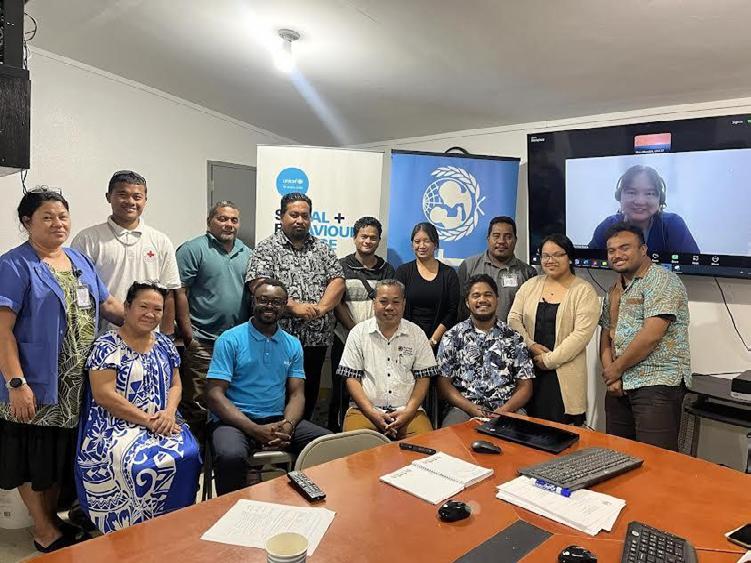
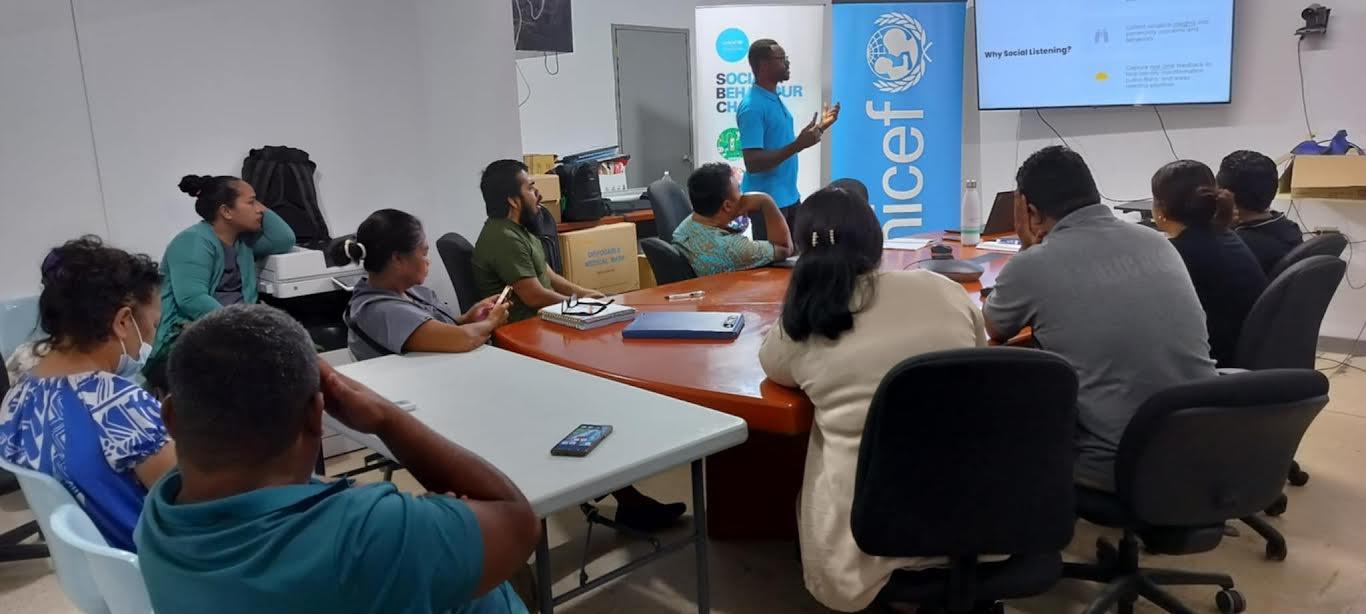
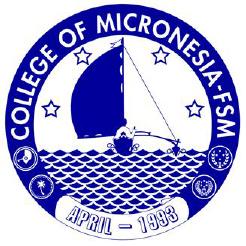



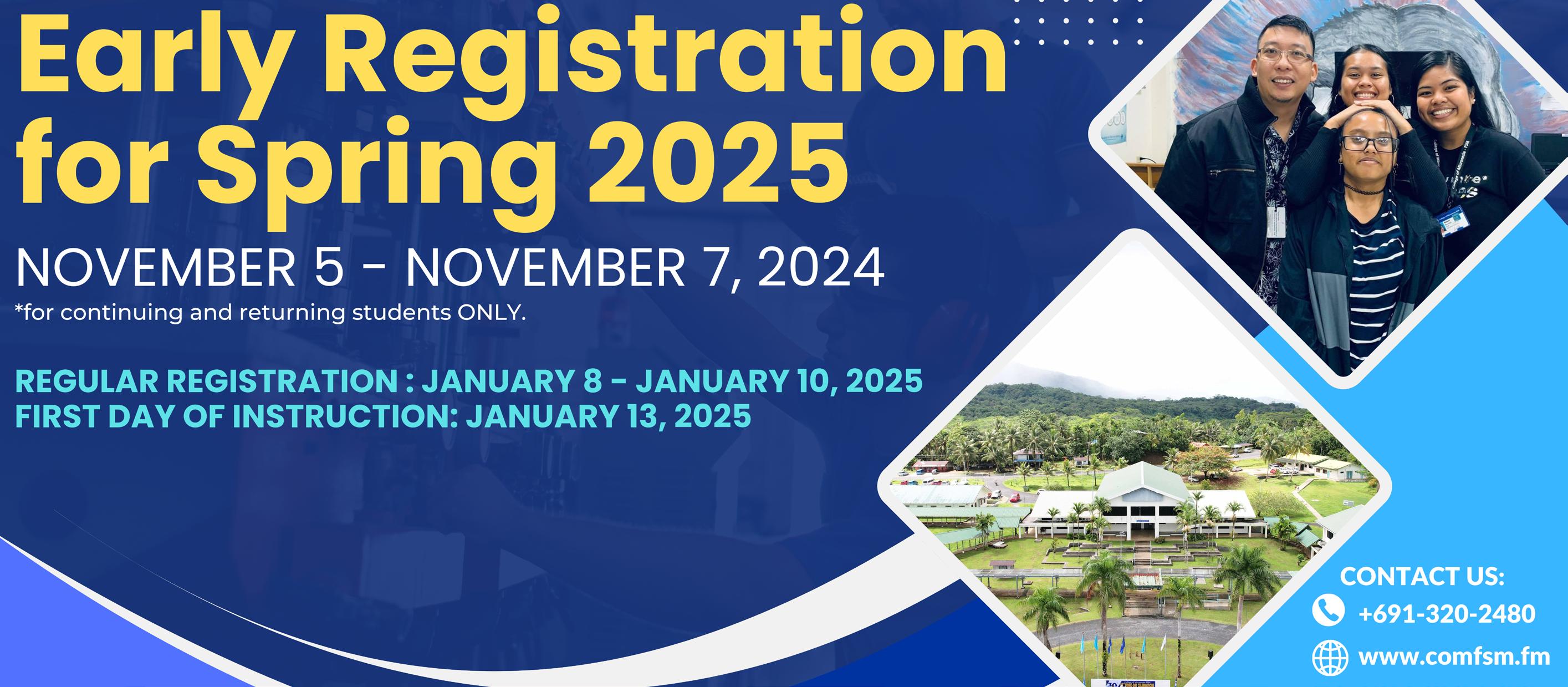



October 13, 2024
Suva, Fiji—The Australasian Institute of Clinical Governance (AICG) is pleased to announce the launch of a newly adapted version of its Certificate in Clinical Governance, tailored specifically to address the unique healthcare needs of Pacific Island countries and territories (PICTs). This initiative, developed in collaboration with The Pacific Community (SPC), marks a significant step toward enhancing healthcare systems across the Pacific region.
The updated Certificate reflects the distinctive realities of life, health, and healthcare across PICTs, focusing on addressing critical regional challenges and supporting sustainable development goals. The programme has been designed to be culturally relevant, incorporating insights and examples that resonate with healthcare professionals working in the Pacific.
Empowering Healthcare Professionals in the Pacific
Through this partnership, AICG and SPC aim to empower healthcare professionals in clinical governance by providing them with the tools and knowledge necessary to build safer, more resilient healthcare systems. The adapted Certificate includes course materials and case studies tailored to the healthcare practices and culture within PICTs, such as governance frameworks, leadership, scope of practice and whistleblowing.
“Clinical governance fosters a holistic, patient-centred approach essential for addressing the unique health challenges faced by PICTs. The AICG is honoured to have worked in close partnership with the Pacific Community to contextualise our clinical governance courses to provide targeted educational value for participants,” says AICG Chief Executive Officer Beverley Sutton.
Tailored for Healthcare Realities
Incorporating regional insights, the Certificate ensures that participants gain practical skills and knowledge applicable to their unique healthcare environments. Focusing on patient safety, care quality, and global healthcare standards, this programme is designed to support the
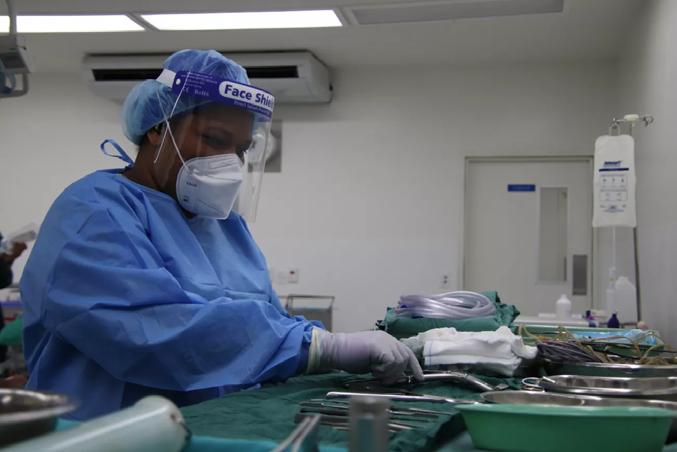
healthcare goals of PICTs while fostering the development of robust healthcare systems.
Dr Ana Akau’ola, Medical Superintendent for the Vaiola Hospital in Tonga and Chair for the 15th Pacific Directors of Clinical Services, says, "Clinical governance is critical for promoting excellence, safety, and accountability by prioritising patientcentred care, and we welcome this collaboration and partnership as it indicates that we are not only talking about sustainable solutions, but we are actioning it and creating opportunities for our healthcare professionals through professional development as such."
As the Pacific faces ongoing healthcare challenges, this collaboration between AICG and The Pacific Community is an essential step toward building a stronger, safer future for healthcare in the region. Professionals who complete the Certificate will be equipped to make meaningful contributions to their local healthcare systems while aligning with broader global standards.
Dr Berlin Kafoa, Director of the Public Health Division at SPC, said, "Accessing professional development in country is critical and even more so in the Pacific as we face challenges with retaining health staff who would usually leave their countries to pursue further studies so providing sustainable solutions such as a Pacific contextualised Course for health professionals addresses this issue. Collaboration in health is important, and we look forward to working with AICG".
For more information about the newly adapted Certificate in Clinical Governance or to enrol in the programme, visit aicg.edu.au or contact AICG at info@aicg.edu.au
Country: Federated States of Micronesia
Project: Pacific Islands Regional Oceanscape Program –Economic Resilience (PROPER)
Grant No.: IDA-E371-FM
Assignment Title: Monitoring and Evaluation Officer
Reference No. (as per Procurement Plan): FM-NORMA-450783CS-INDV
The National Government of the Federated States of Micronesia (FSM) has applied for financing from the World Bank toward the cost of the Pacific Island Oceanscape Program – Second Phase for Economic Resilience and intends to apply part of the proceeds for consulting services.
The consulting services (“the Services”) include coordinating the development and updating of the overall M&E strategy for the FSM PROPER Project and subsequently implementing, reporting on, and managing it in collaboration with project partners, for an initial one (1) year period commencing approximately in November 2024. This is a full-time position and may be extended based on “satisfactory performance” i.e. satisfactory performance as determined through a performance evaluation against agreed key performance indicators and availability of funds. The position supports the FSMPROPER Project implementation phases of the project.
The detailed Terms of Reference (TOR) for the assignment DOFA website at dofa.gov. fm or at the NORMA website at norma.fm.
The FSM National Oceanic Resource Management Authority (NORMA) now invites eligible individuals (“Consultants”) to indicate their interest in providing the Services. Interested Consultants should provide information demonstrating that they have the required qualifications and relevant experience to perform the Services (attach curriculum vitae, copies of degrees and relevant certificates with description of experience in similar assignments, similar conditions, etc.).
The criteria for selecting the Consultant are:
Required experience and educational background:
• Bachelor's Degree in a relevant field such as economics, development studies, statistics, or a related discipline OR a relevant Associates Degree with five (5) years of proven related experience.
• Demonstrated understanding of quantitative and qualitative data analysis methods and related tools.
• Strong analytical skills with the ability to interpret and present complex data in a clear and concise manner.
• Excellent written and verbal communication skills in English.
Desirable skills:
• Experience in working with development projects or initiatives in the Pacific region.
• Understanding of fisheries.
• Knowledge of the context of FSM.
• Experience using data collection and analysis software and tools.
• Familiarity with fisheries management concepts and practices.
The attention of interested Consultants is drawn to paragraph 3.14, 3.16 and 3.17 of the World Bank’s Procurement Regulations for IPF Borrowers dated September 2023 (“the Regulations”), setting forth the World Bank’s policy on conflict of interest.
Further information can be obtained at the address below during office hours 0800 to 1700 hours Pohnpei local time.
Expressions of interest must be delivered in a written form to the address below (in person, or by mail, or by e-mail) preferably by November 15th, 2024.
FSM National Oceanic Resource Management Authority
Attn: Mr. OKean Ehmes, PROPER Project Manager
PO Box PS 122
Pohnpei, FM 96941
Federated States of Micronesia
Telephone: (691) 320-2700/5181

E-mail: okean.ehmes@norma.fm and copy to crawford.nimea@norma.fm

October 7, 2024
PALIKIR, POHNPEI—Following months of endless budget hearings and weeks of discussions with the national departments, agencies and office, the 23rd Congress of the Federated States of Micronesia on September 27, 2024, passed Congressional Act (CA) 23-130 for the National Government Budget for Fiscal Year 2025.
Through CA 23-130, a budget of $124,176,672 is appropriated from the FSM general fund for fiscal year ending September 30, 2025 to fund the operations of all branches of the FSM National Government; National Public Auditor; Agencies; Boards: National Authorities and Commissions; Special Programs; Grants, Subsidies, and Contributions; and Capital and Human Resources Development.
Included within the National Budget are the Compact Sector Grants which are allocated as follows: -
- $ 7,618,319: Education sector;
- 881,148: Health sector;
- $ 1,014,456: Environment sector;
- $ 619,030: Private Sector Development sector;
- $ 1,565,948: Public Sector Capacity Building sector;
- $ 303,470: Enhanced Reporting and Accountability sector;
- $ 29,019,059: Infrastructure sector; and finally
$ 10,220,000: Compact Sector Infrastructure Management Fund (IMF) grant.
The bulk of the Compact Sector Grants is invested in the Infrastructure Sector, the National Budget Act amended sections 10 and 11 to reflect the infrastructure funding breakdown. Section 10 is now for the Compact Infrastructure Sector Grant to be
distributed to the National and State Governments to fund Infrastructure Projects and State Project Management Offices. The National Government’s portion of $1,501,749 is reflected in the budget for the Department of Transportation, Communications and Infrastructure for operations of the Project Management Unit which leaves the amount of $27,517,310 to be distributed as follows:
1. National Government: $ - 0 –
2. Chuuk State: $ 11,731,999.
3. Kosrae State: $ 3,248,967.
4. Pohnpei State: $ 7,779,264
5. Yap State: $ 4,757,080.
Section 11 is specific to the Compact Sector Infrastructure Maintenance Fund (IMF) Grant which is to be deposited into the National and State IMF subaccounts as follows:
a. National Government: $1,022,000.
b. Chuuk State: $3,883,600.
c. Kosrae State: $1,112,958.
d. Pohnpei State: $ 2,586,682.
e. Yap State: $ 1,614,760.
The remaining $72,935,242 from domestic revenue is what will fund the operations of all branches of the FSM National Government; National Public Auditor; Agencies; Boards: National Authorities and Commissions; Special Programs; Grants, Subsidies, and Contributions; and Capital and Human Resources Development for fiscal year 2025. Congressional Act 130 has been signed into Public Law No. 23-121 and is available on the Congress website at www.cfsm.gov.fm


October 7, 2024
Palikir, Pohnpei--During its recently adjourned Fifth Regular Session, the Congress of the Federated States of Micronesia enacted a congressional measure to establish criteria and procedures to allow the withdrawal of funds from the Compact Trust Fund.
Passage of Congressional Act (CA) 23-132, established legal guidance, criteria and procedures for a state or the national government to request the withdrawal of funds from the Compact Trust Fund according to the provisions agreed to in the 2023 Trust Fund Agreement (TFA). The Act spells out the process and requirements for a state government to submit a request for a distribution to the FSM National Government, which after review then submits the request to the Joint Trust Fund Committee (JTFC). According to the 2023 TFA, distributions from the Compact Trust Fund are only allowed under certain circumstances and if certain criteria are met. The established criteria for distribution requests are:
Resiliency Distribution pursuant to Article 18 of the 2023 TFA;
Continued from page 5
The Pacific Economic Update offers six key recommendations to drive investment and ensure local communities benefit from economic growth. These include greater
Special Needs Distribution pursuant to Article 19 of the 2023 TFA; or Unspent Economic Assistance Distribution pursuant to Article 20 of the 2023 TFA.
Resiliency Distribution
According to Article 18 of the 2023 Compact Trust Fund Agreement, Resiliency Distribution funds can be used in the Compact sector grant areas to address increase in costs due to inflation. Any remaining money not used to cover inflation costs may be used for the environment and infrastructure sectors.
An annual deadline of July 15 is set for the national government to submit a Resiliency Distribution budget request to the Joint Trust Fund Committee. The budget request must include a detailed description of:
Total amount requested, including the amount being requested to help offset inflation and any additional amount beyond the inflation adjustment for environment and infrastructure sectors; Description of how the amount will be used and allocated among sectors Proposed expenditures; and For any amount allocated to the
investment in high-potential sectors like agriculture, sustainable tourism, and the blue economy, which can create jobs and support rural livelihoods. Improving infrastructure—such as roads, ports, and energy systems— will boost connectivity, enabling businesses to expand and creating more job opportunities.

infrastructure sector, a description of which projects included in the Infrastructure Development Plan (IDP) would be funded.
The JTFC as set, must issue a decision by August 30th to approve, partially approve or deny the request.
According to Article 19 of the 2023 Compact Trust Fund Agreement, Special Needs Distribution funds can only be used in the Compact sector grant areas to address ‘unforeseen singular expenses of the FSM Government relating to projects that cannot reasonably be financed from other sources of revenue.’ The budget request must include a detailed description with:
The amount requested; A description of how the amount would be used only for unforeseen singular expenses relating to projects in support of the sectors described in Section 261(a) of the 2023 Amended Compact; and
An explanation of why other sources of revenue cannot be used for such expense.
Unspent Economic Assistance
Building fiscal and climate resilience is also critical. Investing in climateresilient infrastructure, improving disaster preparedness, and building up financial reserves will protect communities from future shocks and ensure stability. Attracting private investment will require regulatory reforms to make it easier for businesses to operate, which will promote growth in key sectors and foster local development.
Finally, enhancing access to finance, particularly for small businesses, will be essential for promoting sustainability and driving long-term growth. The report stresses the need to leverage international financial support to drive high-impact projects that directly benefit Pacific communities.
The Economic Update highlights that with the right policies boosting investment, Pacific nations can overcome current economic challenges, build a more resilient future, and create tangible benefits for communities, businesses, and governments across the region.
According to Article 20 of the 2023 Compact Trust Fund Agreement, Unspent Economic Assistance Distribution means a transfer of funds from the Compact Trust Fund to support Compact sectors or other sectors as mutually decided by the Governments of the US and the FSM. A request for an Unspent Economic Assistance Distribution can be made at any time, and should include the following:
Total amount requested;
Description of how the amount would be allocated among the sectors; Proposed expenditures; description of how the allocation would further one or more of the multiyear objectives of the relevant sector as well as one or more of the goals and broad strategies as described in the approved Strategic Development Plan; and For any amount allocated to the infrastructure sector, a description of which projects in the IDP would be funded.
Congressional Act No. 23-132 has been transmitted to the President to sign into law or it automatically becomes law 30 days from transmittal.
Notice is hereby given that BYD Company Limited of No.1, Yan’an Road, Kuichong Street, Dapeng New District, Shenzhen, People’s Republic of China, is the sole owner and proprietor in the Federated States of Micronesia and elsewhere of the trade mark below:
BYD V9 which is used in connection with the following goods:
Class 12: Automobiles; motor cars; cars; motor coaches; trucks; lorries; motor buses; forklift trucks; automobile bodies; automobile chassis; motors, electric, for land vehicles; brake pads for automobiles; autonomous cars; self-driving cars.
BYD Company Limited claims all rights in respect to the above trade mark and will take all necessary legal steps against any person, firm or corporation counterfeiting, imitating, violating or otherwise infringing its rights in the Federated States of Micronesia.
MUNRO LEYS
Lawyers & Notaries Public, Pacific House, Butt Street, PO Box 149, Suva, Fiji Email: trademarks@munroleyslaw.com.fj www.munroleyslaw.com
MUNRO LEYS

Pohnpei Public Information
October 10, 2024
NETT, Pohnpei—Governor Stevenson A. Joseph and First Lady Dr. Aina Garstang attended the Nett Constitution Day celebrations at the Pohnpei State Track &
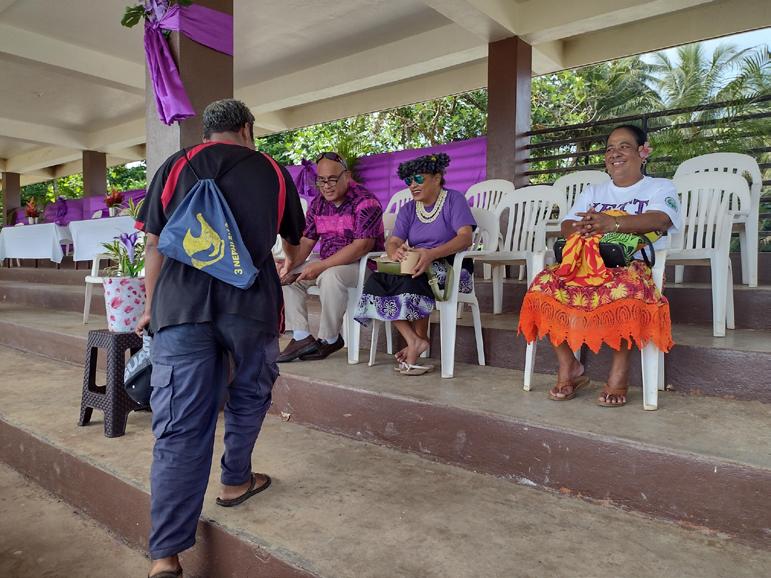
Field (PICS Field), joining the people of Nett Municipality in observing this important day.
The event, commemorating the adoption of the Nett Constitution, brought together a diverse group of participants, including Nett District Administrator Daniel Edgar, Speaker of the 23rd FSM Congress, Honorable Esmond B. Moses, and members of the Nett Legislative and Judiciary branches. The celebration was further honored by the presence of Wasalapalap Pwoud Lepen Nett, the Nahnmwarki of Nett, whose leadership and cultural influence are deeply respected by the community.
The Governor and First Lady’s presence highlighted their ongoing commitment
Read these DAP Guidelines to ensure that your application meets funding qualification
Complete the online application form
Include an itemized budget and quotations for goods and services
For proposals of a technical nature, attach an appraisal from a technically qualified authority
All questions must be answered, or the proposal will not be considered for funding.
Submit your online application through the DAP SmartyGrants online website: https://dap smartygrants com au/FSMDAP 2024-25
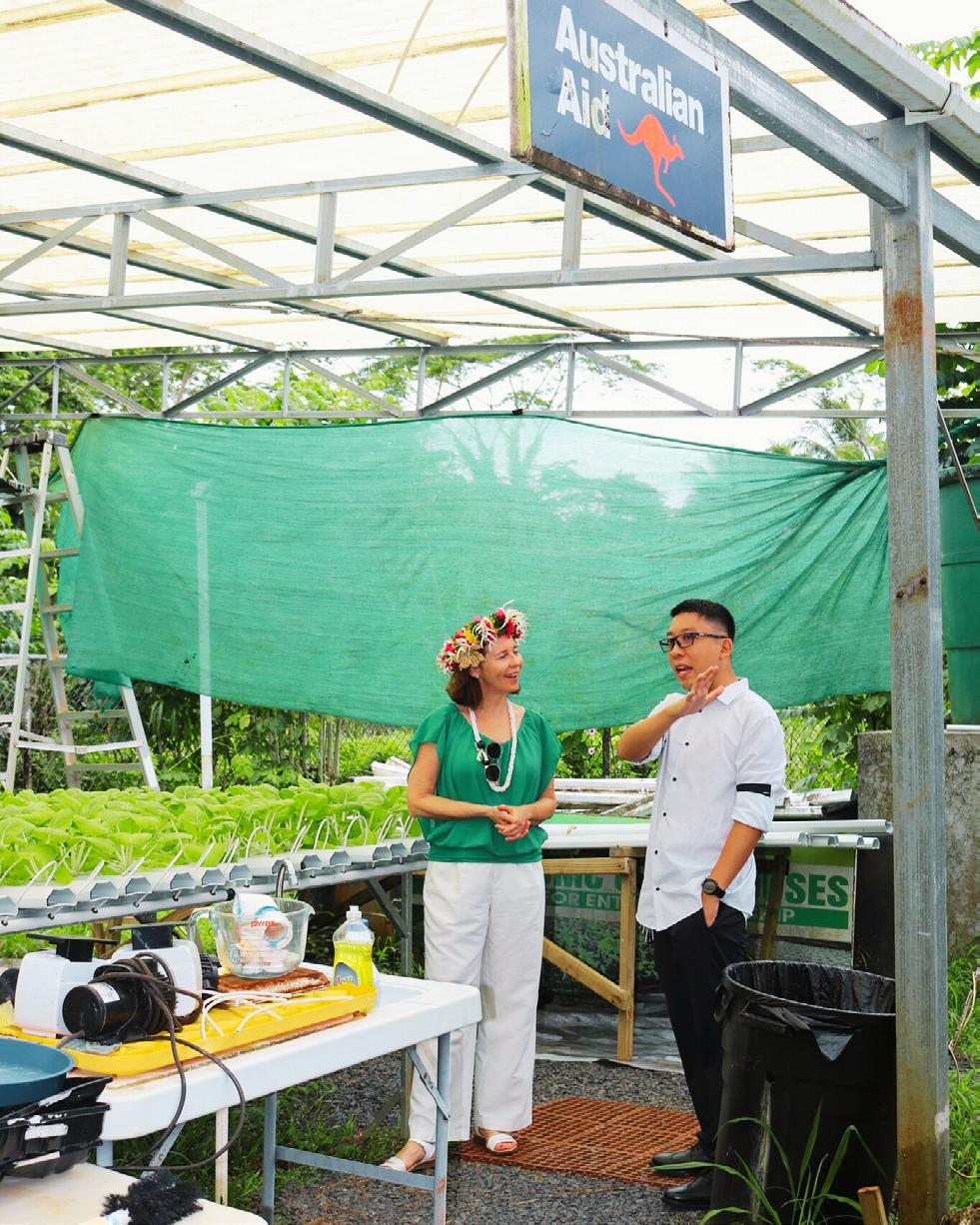
to honoring the cultural and political achievements of Pohnpei's communities. The Pohnpei State Government extends its sincere gratitude to all those who contributed to making this year’s Nett Constitution Day a meaningful and successful event.
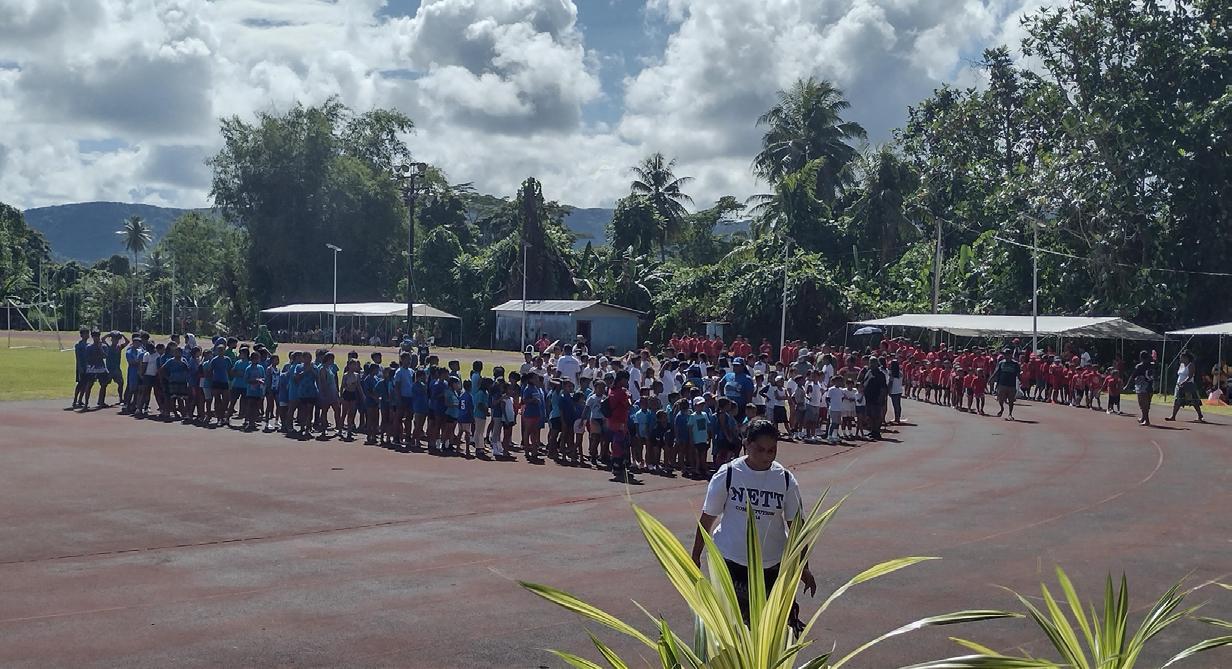
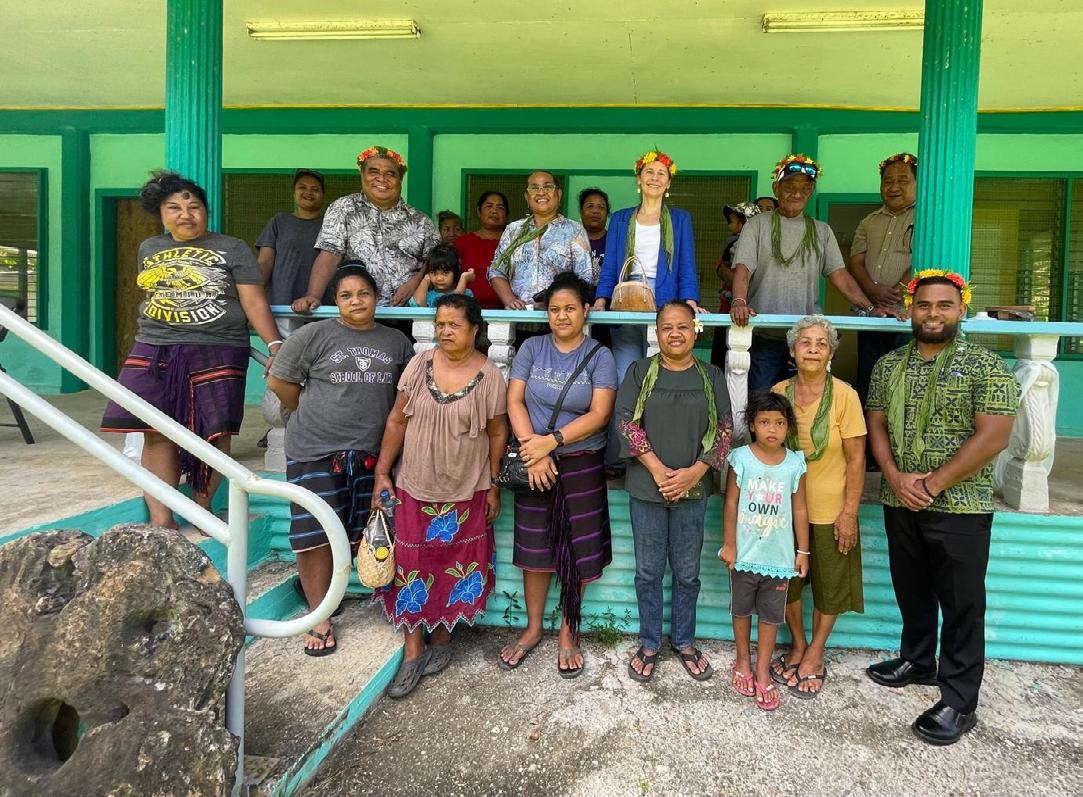
If you have any questions, please contact the Australian Embassy in Pohnpei, Federated States of Micronesia
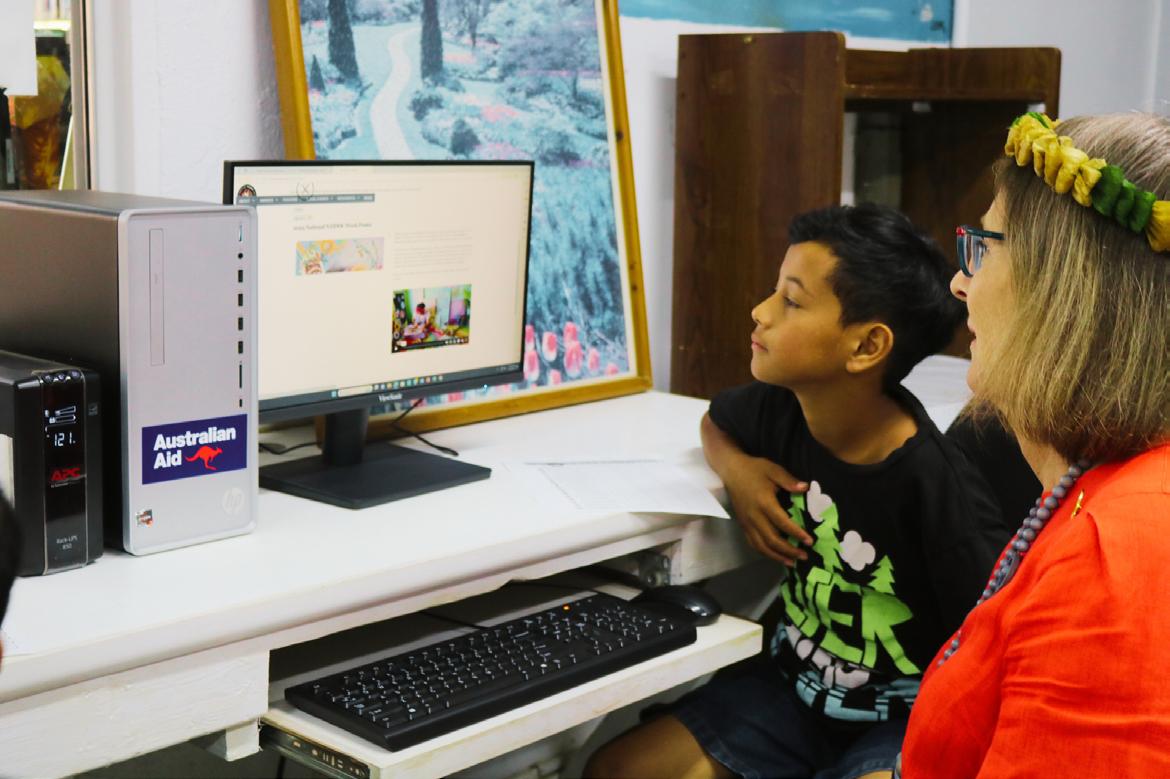
320-5448
2nd Floor, H&E Building, Kolonia, Pohnpei, Federated States of Micronesia 96941
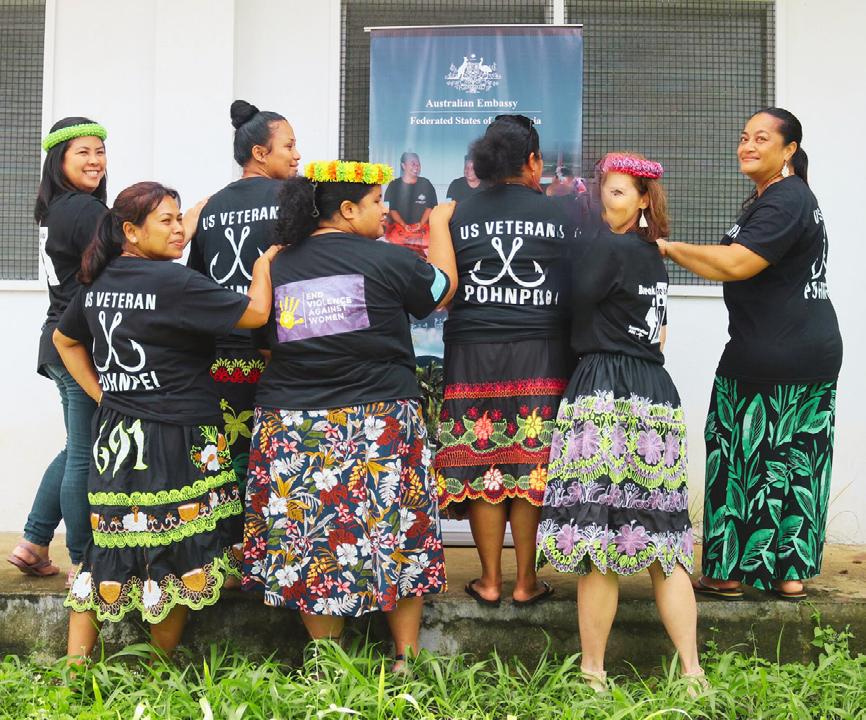
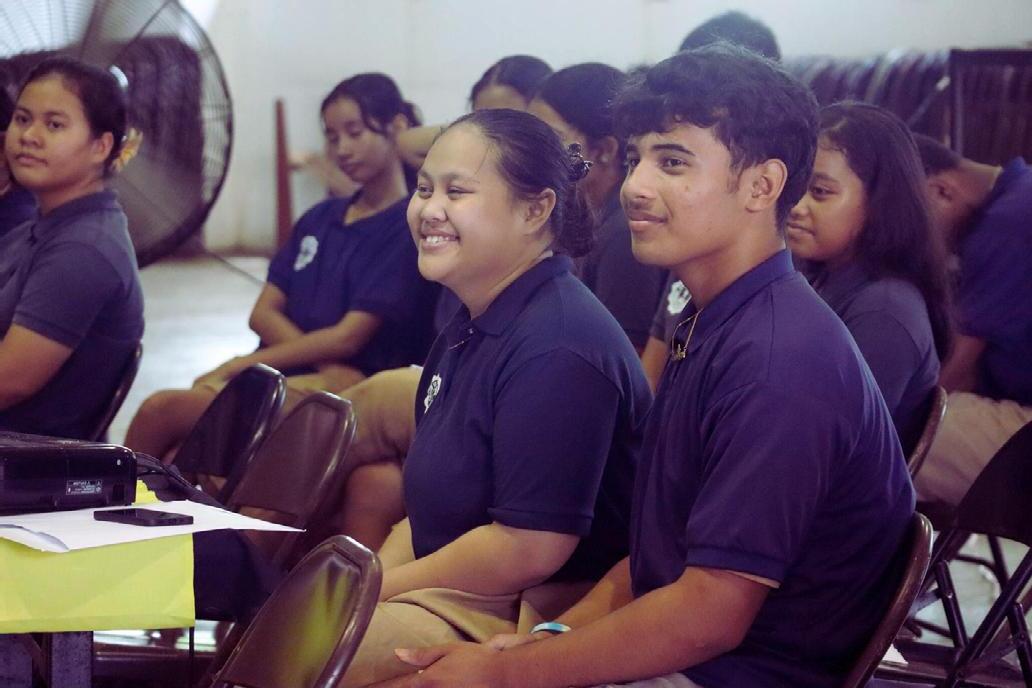
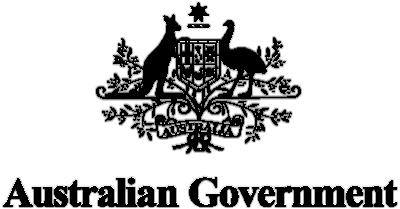
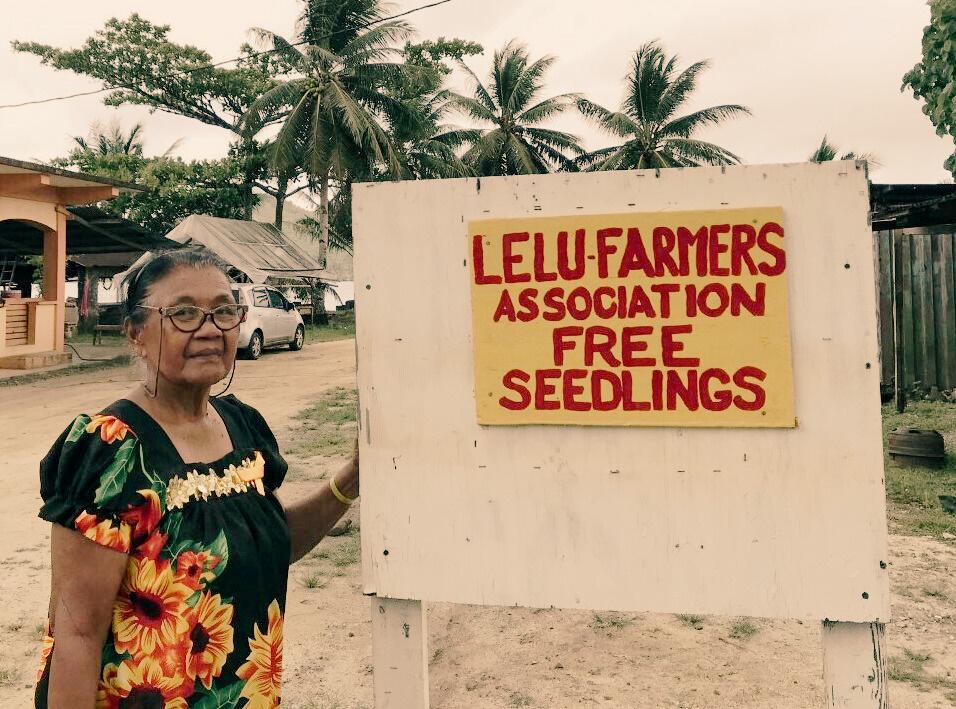
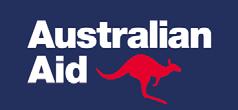

Public Information
October 15, 2024
Kolonia, Pohnpei—
Governor Stevenson A. Joseph welcomed the Pohnpei Islands Central School (PICS) Media Club, along with their advisor, Mr. Alizon Valdez, for an exciting visit to the Governor’s Office today. The Media Club, which produces a monthly newsletter and actively engages the community through its social media channel on Facebook, conducted an interview with the Governor, covering a variety of topics about Pohnpei's future and the role of students in shaping it.
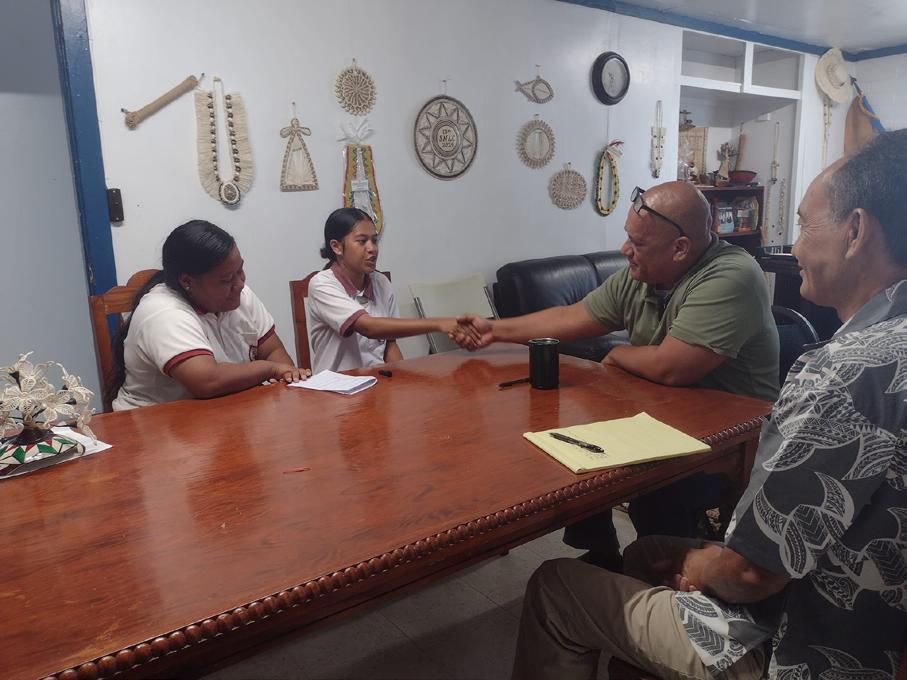
information officer Patrick Pedrus.
Country: Federated States of Micronesia
Project: Pacific Islands Regional Oceanscape Program – Economic Resilience (PROPER)
Grant No.: IDA-E371-FM
Assignment Title: Communications Officer
Reference No. (as per Procurement Plan): FM-NORMA-450782-CS-INDV
The National Government of the Federated States of Micronesia (FSM) has applied for financing from the World Bank toward the cost of the Pacific Island Oceanscape Program – Second Phase for Economic Resilience and intends to apply part of the proceeds for consulting services.
The consulting services (“the Services”) include communicating progress and outcomes of the PROPER Project activities to stakeholders, for an initial one (1) year period commencing approximately in November 2024. This is a full-time position and may be extended based on “satisfactory performance” i.e. satisfactory performance as determined through a performance evaluation against agreed key performance indicators and availability of funds. The position supports the FSM PROPER Project implementation phases of the project. The detailed Terms of Reference (TOR) for the assignment DOFA website at dofa.gov.fm or at the NORMA website at norma.fm.
During the interview, the students had a lively and engaging conversation with Governor Joseph, who shared his insights and enthusiasm for the future of Pohnpei. Chief of Staff Benjamin Rodriguez was also present with Governor Joseph, as well Public
Governor Joseph ended the interview with an inspiring message directed to all students in Pohnpei: "To Engage!" He emphasized the importance of active participation by young people, stating, “As the future of our island and nation, it will be incumbent on students today to participate and get involved. Your engagement shapes the future of Pohnpei.”
The Governor’s Office eagerly awaits the release of the interview, which will be available on the PICS Media Club’s Facebook page. Once published, we will share the interview for the wider public to view and support the young voices of our island.
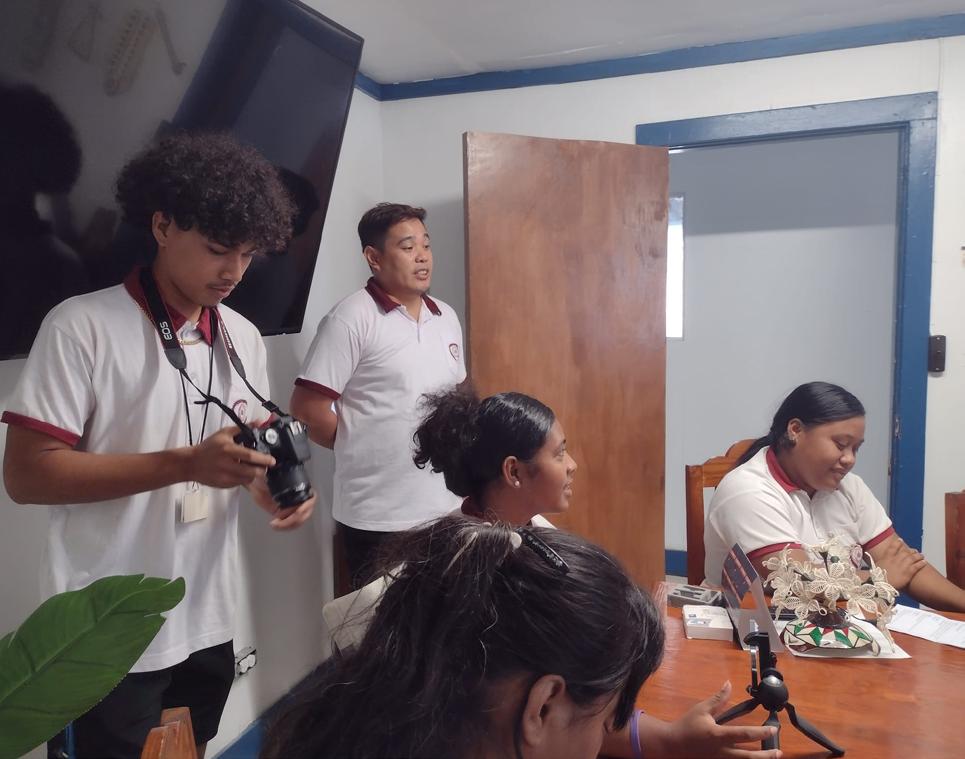
For more information, follow the PICS MEDIA CLUB on Facebook.
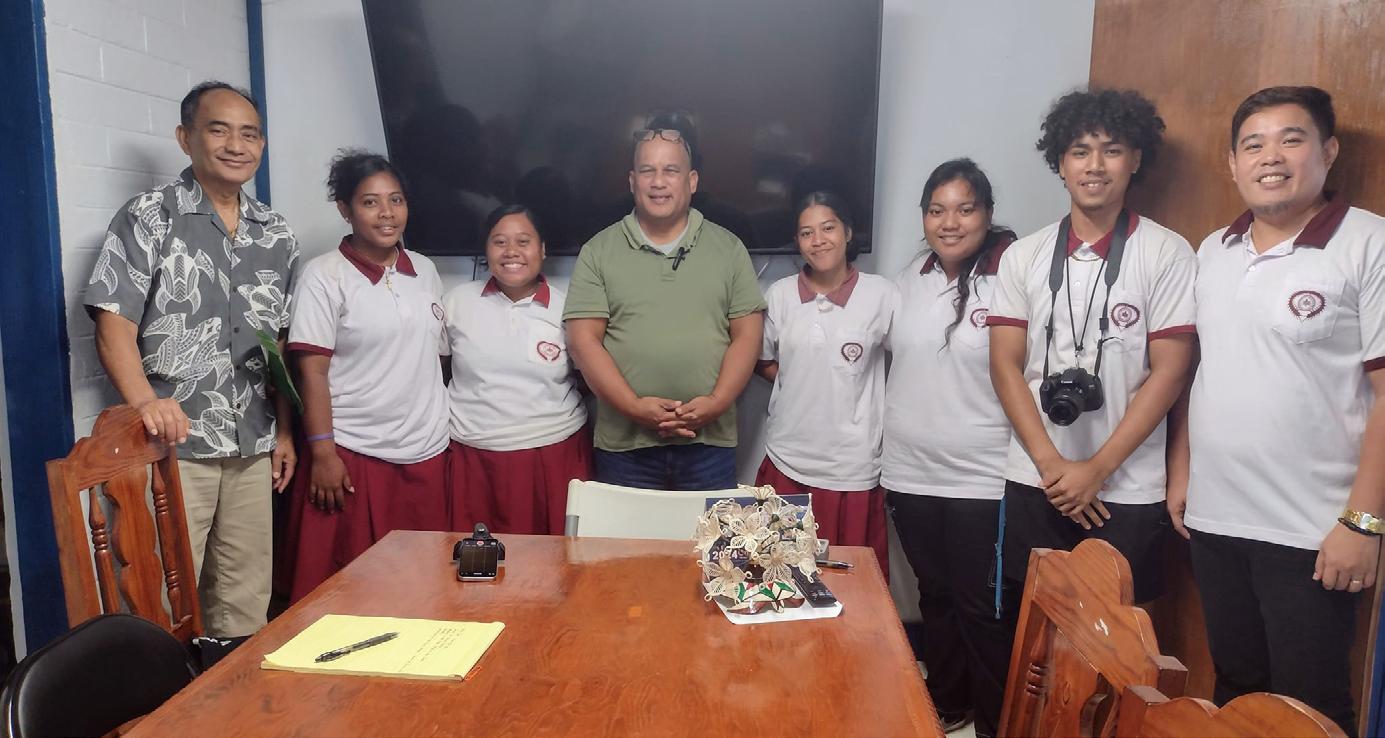
The FSM National Oceanic Resource Management Authority (NORMA) now invites eligible individuals (“Consultants”) to indicate their interest in providing the Services. Interested Consultants should provide information demonstrating that they have the required qualifications and relevant experience to perform the Services (attach curriculum vitae, copies of degrees and relevant certificates with description of experience in similar assignments, similar conditions, etc.).
The criteria for selecting the Consultant are:
Required experience and educational background:
• Bachelor’s Degree in communications, journalism, public relations, or a related field OR an Associates degree in a related field with five (5) years of related experience.
• Strong writing, editing, and content creation skills with an ability to adapt messages for different audiences.
• Proficiency in using communication tools and platforms, including social media, websites, and presentation software.
• Excellent interpersonal and networking skills for effective stakeholder engagement.
• Understanding of the context and culture of FSM.
• Proficiency in English, both written and verbal communication.
Desirable skills:
• Experience in community engagement or outreach activities.
• Familiarity with the reality of one or more States and knowledge of local languages.
• Familiarity with the Pacific region’s cultural dynamics and communication preferences.
• Experience in designing and implementing successful communication campaigns.
• Experience in website maintenance and updating.
• Proficiency in graphic design software or multimedia production tools.
The attention of interested Consultants is drawn to paragraph 3.14, 3.16 and 3.17 of the World Bank’s Procurement Regulations for IPF Borrowers dated September 2023 (“the Regulations”), setting forth the World Bank’s policy on conflict of interest.
Further information can be obtained at the address below during office hours 0800 to 1700 hours Pohnpei local time.
Expressions of interest must be delivered in a written form to the address below (in person, or by mail, or by e-mail) preferably by November 15th, 2024.
FSM National Oceanic Resource Management Authority
Attn: Mr. OKean Ehmes, PROPER Project Manager
PO Box PS 122
Pohnpei, FM 96941
Federated States of Micronesia Telephone: (691) 320-2700/5181
E-mail: okean.ehmes@norma.fm and copy to crawford.nimea@ norma.fm


October 11, 2024
Nett, Pohnpei—
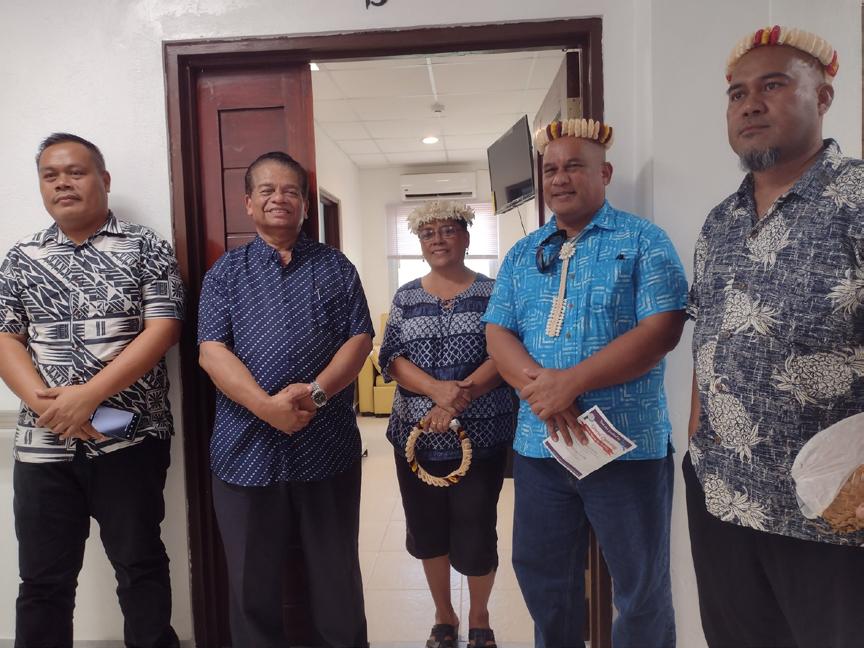
The Pohnpei State Government proudly announces the official opening of the 16-bed wing at Pohnpei State Hospital, a project funded by the Federated States of Micronesia (FSM) National Government in partnership with the Asian Development Bank (ADB). This state-of-the-art facility officially turned over to the Pohnpei State Government in 2022, represents a significant leap forward in the state’s healthcare infrastructure.
The event, attended by government dignitaries, healthcare professionals, and community members, was warmly welcomed by the Director of the Department of Health and Social Services, Mr. Stuard Penias after an opening prayer by Rev. Nolenster
Notice is hereby given that BYD Company Limited of No.1, Yan'an Road, Kuichong Street, Dapeng New District, Shenzhen, People's Republic of China, is the sole owner and proprietor in the Federated States of Micronesia and elsewhere of the trade mark below:
BYD ATTO
which is used in connection with the following goods:
Class 12: Automobiles; motor cars; cars; motor coaches; trucks; lorries; motor buses; forklift trucks; automobile bodies; automobile chassis; motors, electric, for land vehicles; brake pads for automobiles; autonomous cars; self-driving cars.
BYD Company Limited claims all rights in respect to the above trade mark and will take all necessary legal steps against any person, firm or corporation counterfeiting, imitating, violating or otherwise infringing its rights in the Federated States of Micronesia.
MUNRO LEYS
Lawyers & Notaries Public, Pacific House, Butt Street, PO Box 149, Suva, Fiji Email: trademarks@munroleyslaw.com.fj www.munroleyslaw.com
MUNRO LEYS
Charley. Director Penias expressed his gratitude to all who played a role in the completion of this project celebrated the potential it brings to enhance medical services for the people of Pohnpei and shared news of forthcoming generous donations from the World Health Organization to the Pohnpei State Hospital.
Governor Stevenson A. Joseph, in his address, conveyed heartfelt thanks to the FSM National Government for its critical support in making this facility a reality. He gave special recognition to former FSM Congressman Ferny Perman, whose leadership as Chairman of the Committee on Health at the 22nd FSM Congress was instrumental in securing this project. Governor Joseph emphasized the transformative impact the new wing would have on healthcare delivery in Pohnpei and congratulated Director Penias and his dedicated staff for their commitment to serving the public.
In his remarks, Senator Shelten Neth, Chairman of the Committee on Health at the 11th Pohnpei Legislature, also congratulated the Department of Health and Social Services for their hard work in bringing this project to fruition. Senator Neth, who was accompanied by fellow Senators Herolyn S. Movick and Tendy Liwy, highlighted the Governor’s recent address at the Pacific Health Gathering in Alaska, where Governor Joseph remarked, "Health is wealth." Senator Neth reaffirmed this statement, expressing his optimism that the new hospital wing will lead to improved health outcomes for the people of Pohnpei.
The event concluded with closing
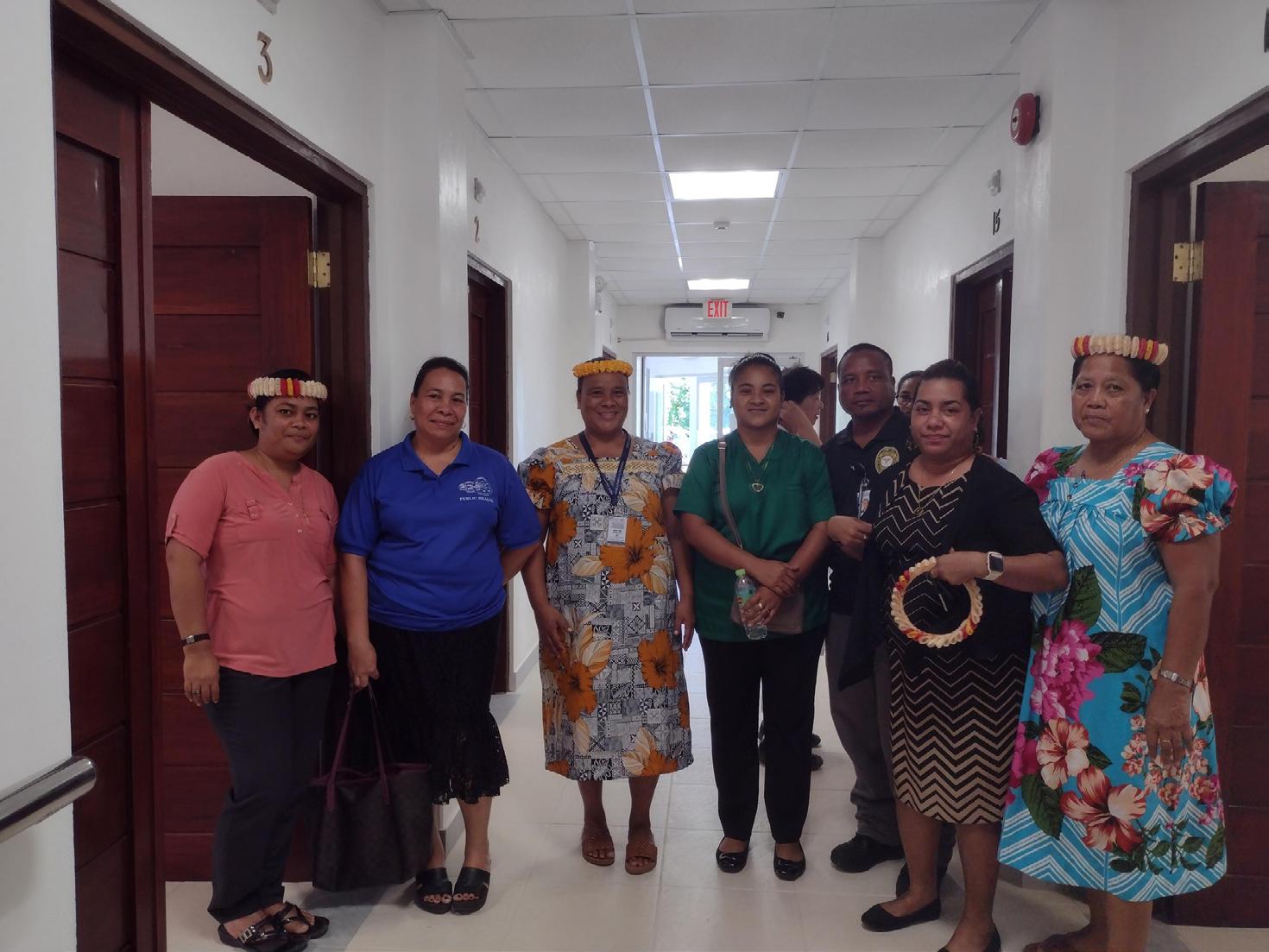
prayers by Deacon Martin and a tour of the new facilities, which are expected to improve the hospital’s ability to provide high-quality care to Pohnpei’s growing population. The new wing represents a significant milestone in Pohnpei’s journey toward better healthcare services, underscoring the importance of investing in the health of its people.
Thank you, Pohnpei State Department of Health and Social Services for photographs, not taken by PIO.
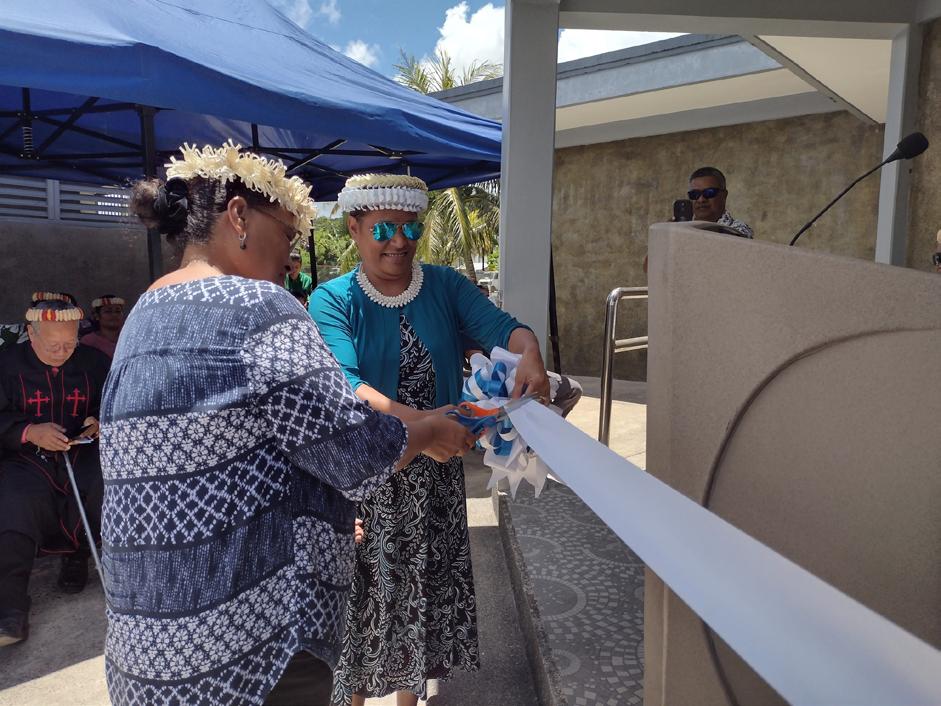
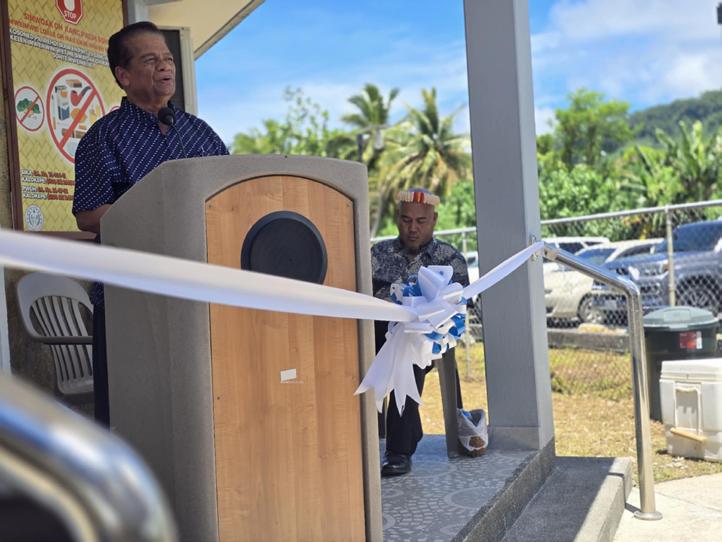
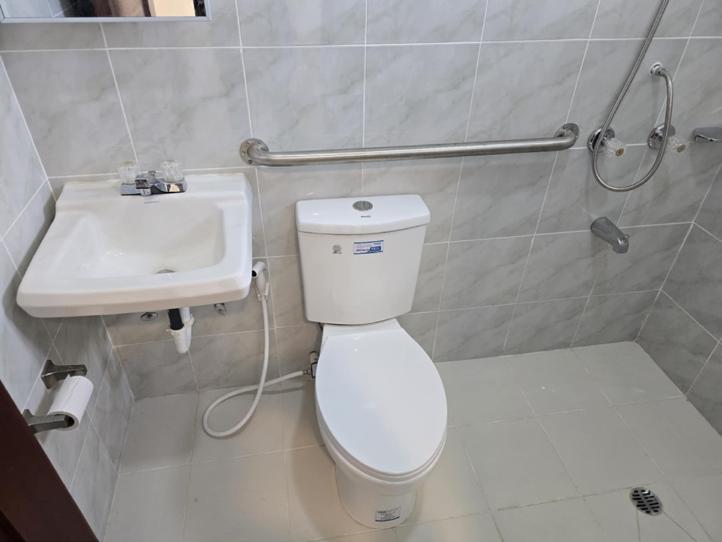
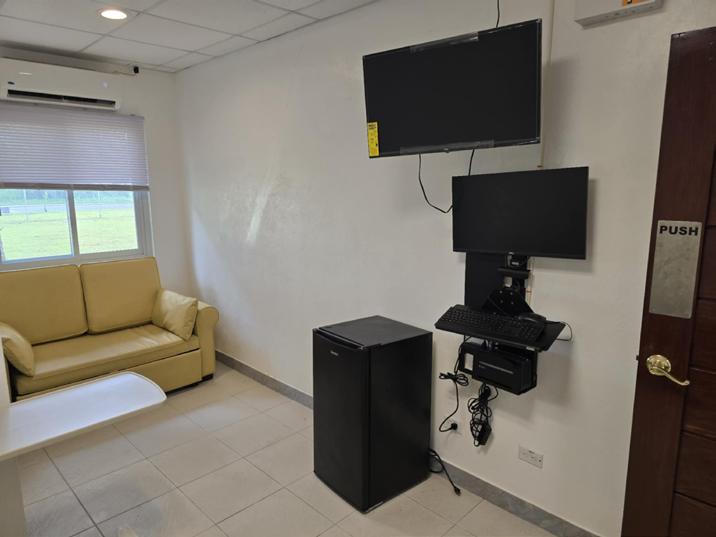
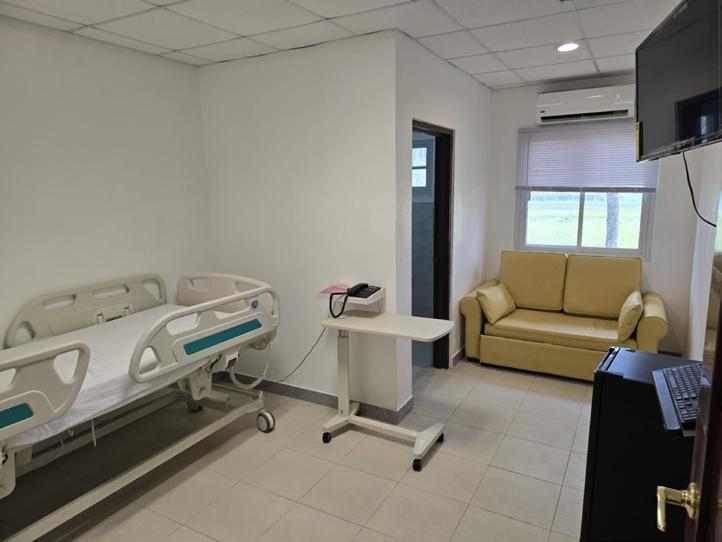

Pohnpei Public Information
October 16, 2024
KOLONIA, Pohnpei—
Governor Stevenson
A. Joseph officiated the swearing-in ceremonies for two key appointments to the Pohnpei State Government. Mr. Thomas Kostka has been appointed to the Board of Directors of the Pohnpei Transportation Authority (PTA), while Mr. Henry Norman joins the Advisory Board of the Office of Fisheries and Aquaculture (OFA).
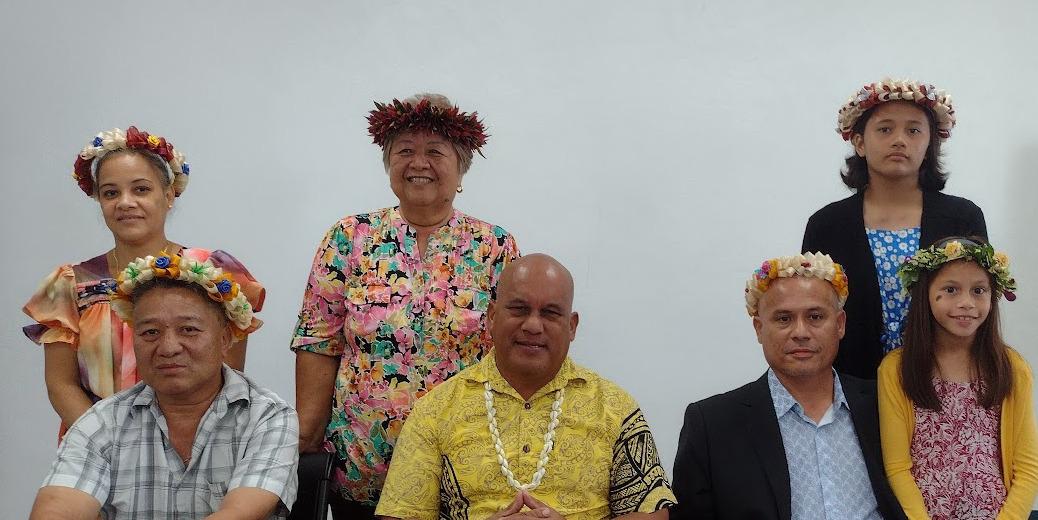
Pacific Island Forum Secretariat
October 08, 2024
Geneva--On the May 24, 2024 Pacific Island countries celebrated a significant milestone as member states of the World Intellectual Property Organization (WIPO) concluded negotiations on the groundbreaking WIPO Treaty on Intellectual Property, Genetic Resources, and Associated Traditional Knowledge.
The event took place at the Office of Fisheries and Aquaculture conference room, where Governor Joseph delivered the oaths of office and presented certificates of appointment to both appointees. This moment marks a significant step in the continued efforts to improve the state's infrastructure and fisheries management.
In their remarks following the ceremony, both Mr. Kostka and Mr. Norman expressed their sincere gratitude to Governor Joseph and the Legislature for their trust and confidence in their abilities. Both pledged to fulfill the duties and responsibilities placed upon them as members of two important Boards for the State of Pohnpei.
Governor Joseph, speaking at the event, highlighted the importance of both appointments, noting the essential roles that the Transportation Authority and the Office of Fisheries and Aquaculture play in the state's economic development. For PTA, Governor Joseph spoke of the vision of one day becoming a subcomponent of Pohnpei State, in a similar fashion to Pohnpei Utilities Corporation. For OFA, Governor Joseph called for “thinking outside of the box” and to leave no stone unturned in the pursuit of excellence, efficiency, and innovation in both PTA and OFA.
Mr. Kostka and Mr. Norman’s appointments come at a crucial time as Pohnpei continues to pursue sustainable development goals in transportation and fisheries, vital sectors for the state's economy and the well-being of its people.
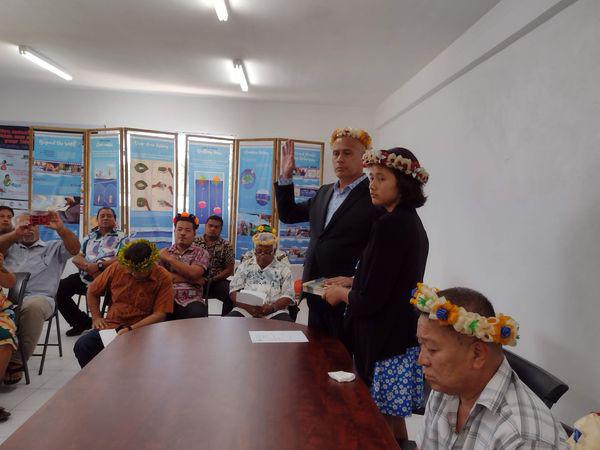
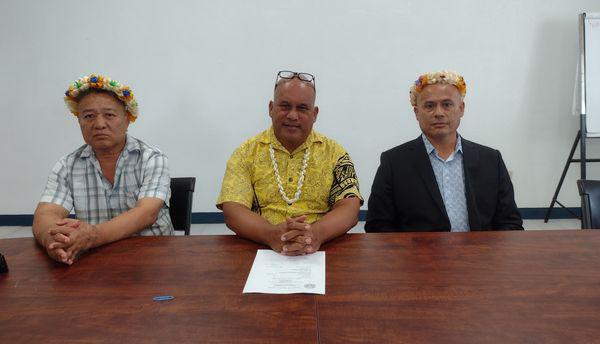
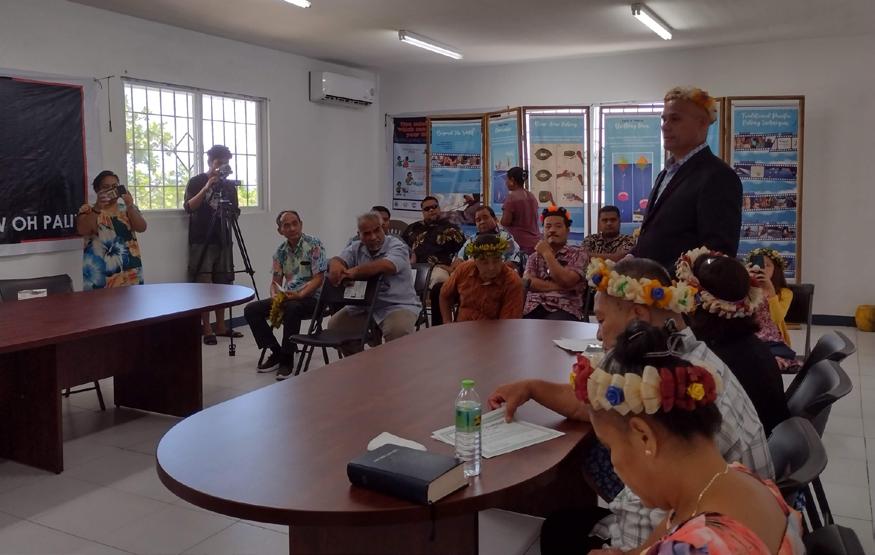
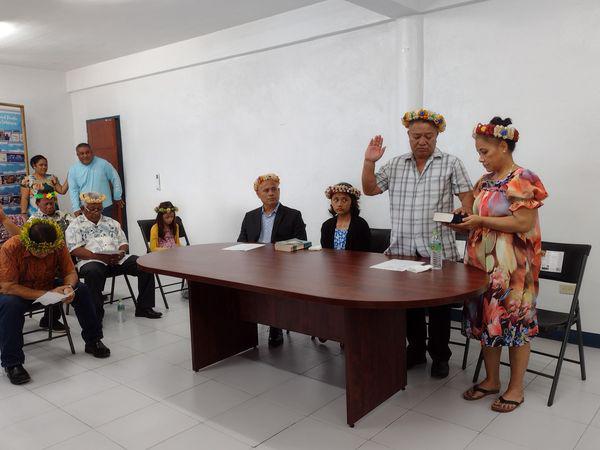
This new international legal framework represents a triumph for nations abundant in traditional knowledge and rich in biodiversity, such as the Pacific region. The treaty establishes new international standards that ensure communities, including Indigenous peoples and local communities, are recognized and safeguarded when their traditional knowledge and genetic resources are utilized by others.
A core aspect of the treaty is its requirement for patent applicants to disclose whether their inventions are based on genetic resources and associated traditional knowledge, as well as the sources of these resources and knowledge. This transparency is expected to support the sustainable use of natural resources while protecting the rights of communities who have stewarded them for generations.
Pacific countries played an active role in these negotiations, with acknowledgment and thanks to the support of the Australian Department of Foreign Affairs and Trade (DFAT). A generous grant of AUD 103,000 from DFAT enabled enhanced participation from the region, as well as specialized technical assistance to inform and coordinate regional positions.
Ambassador James Baxter, representing Australia, expressed pride in the collaborative achievement, stating: “Australia is honoured to have played a role in empowering our Pacific neighbors to actively participate in the negotiations. This treaty is not only a win for biodiversity and traditional knowledge but also a testament to the power of regional cooperation."
Ambassador Falemaka, on behalf of the Pacific Islands Forum, added: "The Pacific has long been a custodian of invaluable traditional knowledge and genetic resources. This treaty will ensure that our communities are protected, recognized, and can share in the benefits of global innovation based on our natural and cultural heritage."
The treaty, which included the Republic of the Marshall Islands, Niue, and Vanuatu amongst the first 36 signatories in May 2024, will enter into force once it is ratified by 15 contracting parties, a step eagerly anticipated by all stakeholders.
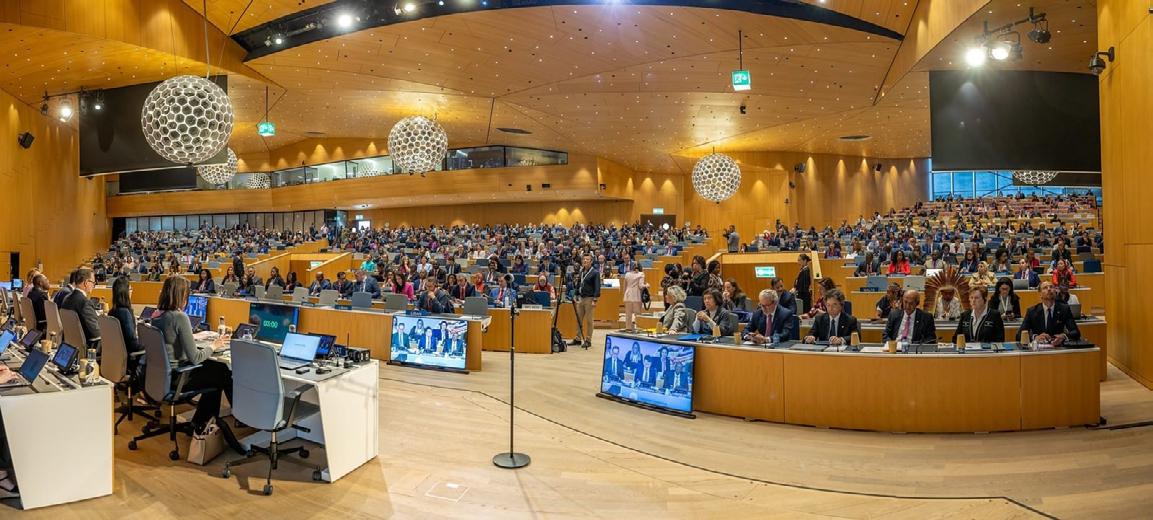

October 10, 2024
PALIKIR, Pohnpei--Today, His Excellency Wesley W. Simina, President of the Federated States of Micronesia (FSM), presided over a formal oath of office ceremony for several newly appointed officials entrusted with vital roles in the administration.
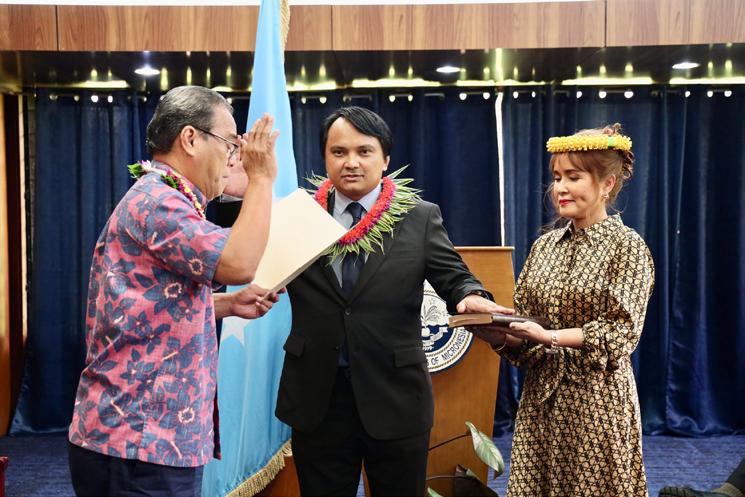
The ceremony marked the swearing-in of the following appointees:
• Mrs. Jane J. Chigiyal as FSM Ambassador Extraordinary and Plenipotentiary to the Commonwealth of Australia;
• Mr. Leonito Bacalando Jr., Esq. as Secretary of the Department of Justice;
• Mr. Jack Harris as Member of the FSM Social Security Board of Directors;
• Mr. Christopher I. Christian as Member of the Board of Directors of FSM PetroCorp;
• Mr. Heinrick Stevenson as National Election Commissioner for Pohnpei state
Following the administration of oaths by President Simina and remarks from each of the appointees, Vice President Aren B. Palik delivered closing remarks, offering congratulations and emphasizing the significance of public service. He noted the importance of the responsibilities placed upon each appointee and encouraged them in the fulfillment of their duties.
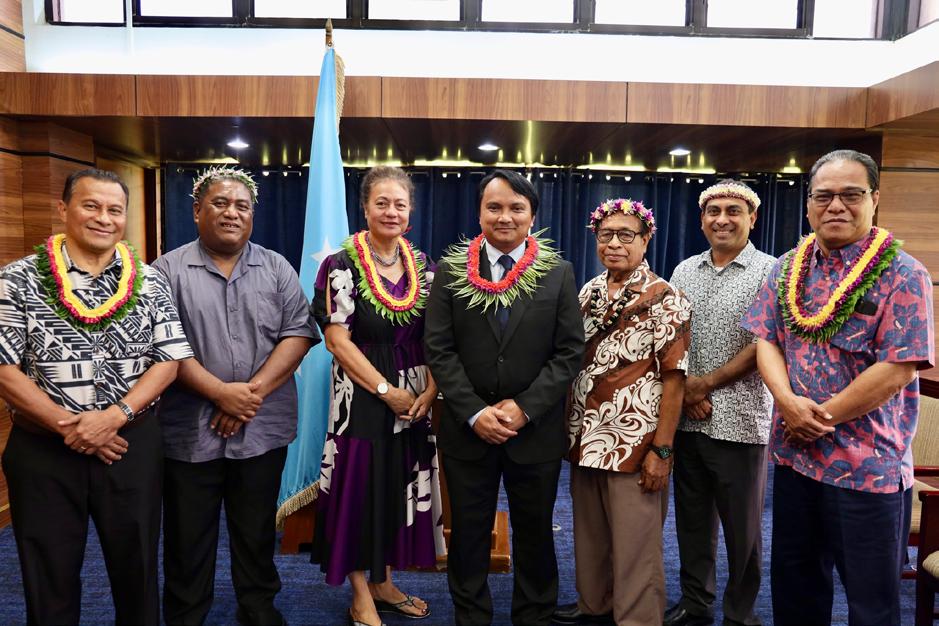
Concluding the ceremony, President Simina delivered a congratulatory toast, recognizing the appointees’ dedication and service. He expressed confidence in their abilities to fulfill their respective roles and to contribute meaningfully to the advancement of the FSM.
The Simina-Palik administration congratulates and thanks each of their appointees and their families for their dedication and service to the nation.
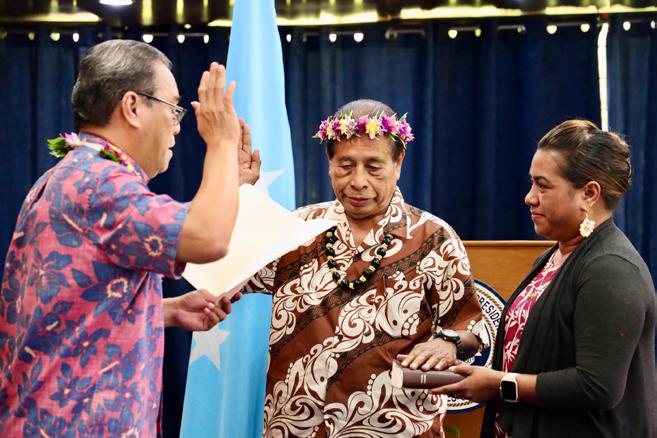
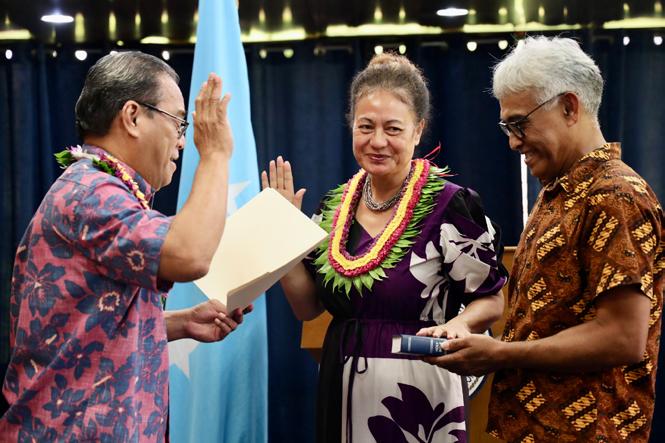
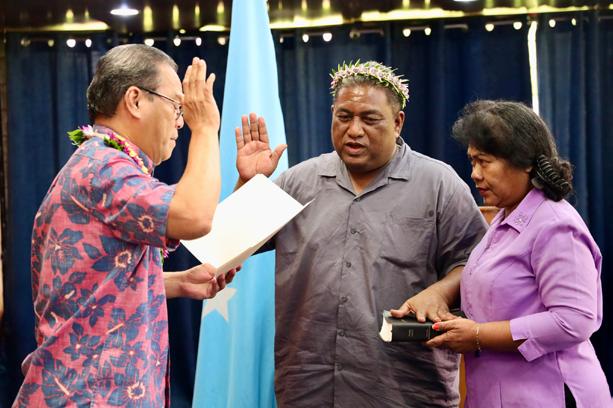
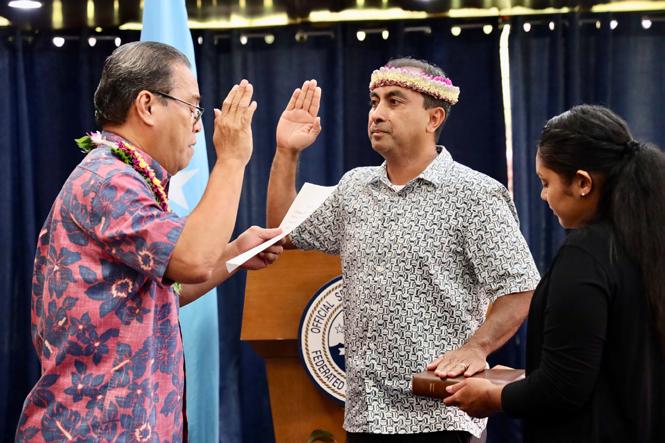


For about 8 years, Kyle Ahlstrom had been contentedly working for Home Depot Corporate in Utah. “My life was a little stagnant, and I hadn’t grown at all,” he said.
All that was about to change.
He began socializing and getting out more —"Dipping my toe a little bit out of my comfort zone,” as Kyle puts it. At a young single adult activity, he met an energetic young teacher named Launi Brent. They fell in love, eloped and at Launi’s behest departed immediately for a small island group in the Pacific called Chuuk.
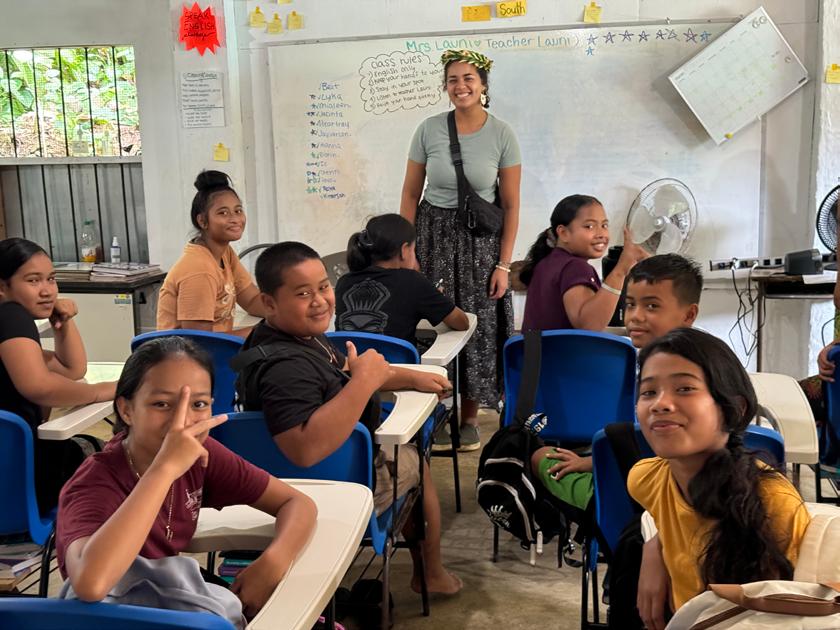
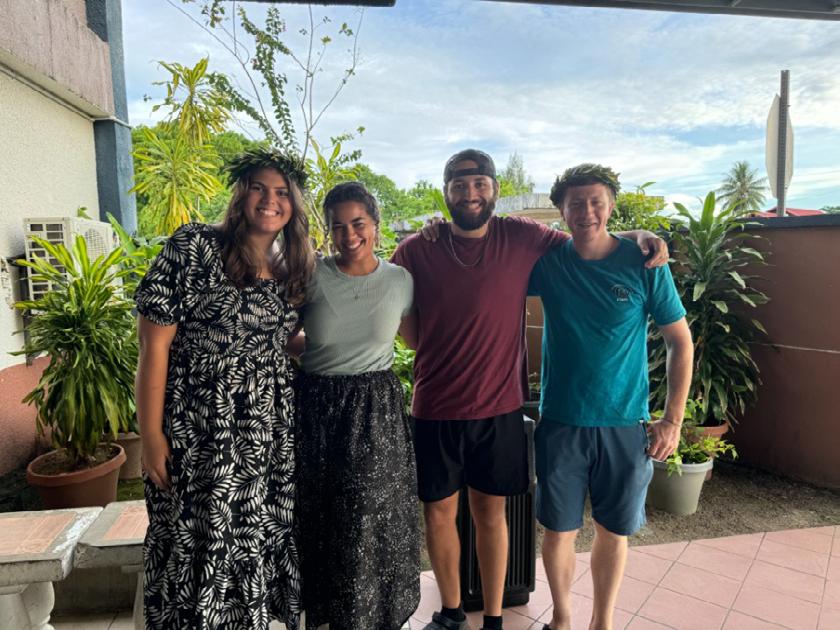
asked.
While students in the States celebrate Fridays and the coming weekend with no school, Kyle found that his students were definitely not thankful it was Friday. They were sad to miss school and their teachers. “They would love to go to school every day if they could,” said Kyle. He was pleasantly surprised at this positive attitude displayed by his young students.
At this point, Kyle went from just dipping his toe out of his comfort zone, to full immersion.
On August 16, 2024, Kyle and Launi arrived in Chuuk in Micronesia, a place that neither had previously heard of, having committed to teach together at Akoyikoyi School on Weno, Chuuk’s main island. Joining them was Launi’s good friend Jenna Watson from Payson, Arizona.
Jenna Watson was attending BYU-Idaho and teaching art education when Launi recruited her to join them for a teaching adventure at the Akoyikoyi School. “It was totally uncharacteristic of me to commit to travel halfway around the world to live and teach on a distant island which I had never heard of,” explained Jenna, but she decided to consider the invitation.
Of particular concern to Jenna, her brother James was about to return home after having served an extended military deployment in the Middle East. She had been looking forward to being there with the rest of her family to celebrate his safe homecoming. If she committed to teach at Akoyijoyi, she would miss this reunion.
Jenna prayed for guidance on what she should do. When she spoke with James about the matter, he strongly encouraged her to go to Chuuk and take advantage of such a great opportunity. “Why not take a chance on something that’s going to be an amazing experience,” she decided, “and this will help me see if I truly enjoy teaching.” She then began making arrangements to meet her friends in Chuuk.
Meanwhile, Chad Hall from Southern Utah, who 5 yours previously had served as a young missionary on Chuuk, was feeling that his life was “stuck in the same place,” and was looking for an opportunity to grow. He had worked as an FSY
His former companion from the Micronesia/ Guam Mission, Logan Thompson, reached out, asked if he missed his mission area, and suggested that he go back to teach at Akoyikoyi School. “I thought about it and was impressed that this would be the best place for me to go for my next growing experience,” Chad said.
The Island and the Experience
Two aspects of Chuuk stood out to the newly arrived teachers: The beauty of the island and the friendliness of the islanders.
They enjoyed the beauty of the lush jungles, the fresh local produce, and a little swimming in the warm, tropical waters.
“It’s the most beautiful place I’ve ever been,” said Launi. “I was surprised by that.”
But the friendliness of the Chuukese islanders perhaps made the biggest impression.
Each school day the teachers travel down a narrow road that cuts through dense tropical vegetation to the school. Islanders greet them with smiles and friendly waves as they pass by. On Sundays they walk to the Mechitiw Branch of the Church of Jesus Christ of Latter-day Saints to gather and worship with local Church members.
At Akoyikoyi, the students and parents are sincerely grateful for these enthusiastic, positive young teachers who are willing to leave the comforts of home and serve.
“Utah is a friendly place, but here it’s a whole new level of friendliness, with everyone wanting to say hi to you and be your friend,” explained Launi, who teaches 7th grade. "The kids and parents bring us gifts, like earrings and skirts. They are very interested in us. They want to know all about how Kyle and I met. The students like to draw pictures of Kyle proposing to me. It is so easy to like the students and their parents!”
Jenna, who teaches 3rd and 5th grade, describes how important it has been for her to make personal connections with her students. “I care about the students,” explained Jenna. “I let them know that I care about them, that I want them to succeed, and they trust me.” She notes that they are typical kids and can have normal classroom issues, but when you connect with them personally you create an environment where learning can happen.
Jenna’s students reciprocate the compassion and love that she shows to them. “If I’m having a little bit of a down day, they sense it and try to make me feel better,” she explained. “Even a tiny cut will bring sympathy. They offer to do things for me all the time.”
Kyle, who teaches 1st and 4th grade, learned a lesson about classroom management and island culture at the same time. He had decided that a consequence of failing to follow proper class procedures and rules would be staying after class to clean up the room, assuming this would be perceived as a negative consequence.
To his surprise, it turned out the students saw cleaning the classroom as a positive and would fight over who got to clean up at the end of class.
Kyle made adjustments to his classroom management plan. “Now cleaning up is a reward,” he explained. “The good students get to clean and use the broom and the mop.”
Kyle also learned another striking difference between the Akoyikoyi students and students in the U.S.
One day early in the semester at the end of one week, he taught them the acronym, TGIF (Thank goodness it’s Friday). The Chuukese students were confused . . . “Why would you be happy that it’s Friday?” they
Chad says that his teaching experience at Akoyikoi has changed his whole outlook on kids in general. He has learned that when you show that you are invested in each of them, they respond positively –They become interested in being in school and learning.
Chad is unique in that he has returned to a place and people that he grew to love as a young Latter-day Saint missionary several years before. The first time he came he was a young man living away from home for the first time and trying to learn a new language, a different culture, and how to avoid Chuuk’s aggressive dogs. “It made life a little hectic,” he explained with a smile.
He has been happy to have the chance to return with his prior knowledge and experience and take the opportunity to relax and enjoy Chuuk more. “I’m learning that I can go and do things that seem a little crazy at first,” said Chad. “I’m learning that I can teach in front of a classroom.”
Both Chad and Kyle expressed the personal growth they have experienced. “I’ve gained confidence that I can survive and even thrive out of my comfort zone,” said Kyle. Jenna says that she has learned to appreciate more the blessings she has enjoyed in her life, and strive to share those blessings with others. Launi is determined to travel the world with Kyle, teaching and serving people in new and different places.
It goes without saying that all the teachers have grown spiritually as they have experienced a new country, culture, and climate. Their courage in being willing to leave their comfort zones and serve others has helped them to grow and prepare for a successful and meaningful life of service.
The group recommends for others the opportunity to serve at Akoyikoyi. Anyone interested can find Akoyikoyi School’s contact information online. https://www. ship-hoops.org/

October 10, 2024
PALIKIR, Pohnpei—On October 8, 2024, Vice President Aren B. Palik officially launched the first-ever Migration Taskforce Training in the Federated States of Micronesia (FSM). The training, held at the Central Building in Palikir, is specifically designed for members of the Migration Taskforce, which was formed under Executive Order by President Simina.
In his opening address, Vice President Palik underscored the need for a comprehensive approach to address the challenges posed by migration. “President Simina’s executive order reflects the need to thoroughly examine the issues surrounding the migration of FSM citizens. A holistic approach is crucial, as the challenges we face are interconnected and complex,” he stated. He also highlighted that feedback from recent administration outreach efforts has revealed a growing demand for greater support for citizens impacted by migration.
“The Taskforce has a critical role in
studying the facts, trends, and issues that inform our decision-making process. By understanding the full scope of migration impacts, both individually and collectively, the Taskforce will be able to deliver comprehensive, reliable, and sensible recommendations to the Administration.”
The Vice President also underscored the significance of recent outreach activities conducted by the SiminaPalik Administration, both within FSM and abroad, to gather feedback from citizens facing migration-related issues.
“It has become evident that our citizens require more services and support from the National Government,” he said. “Determining how best to deliver these services effectively and comprehensively is one of the key challenges we must address.”
Vice President Palik further acknowledged the role of the Amended Compact in facilitating visa-free entry for FSM citizens into the United States for education, healthcare, and other lawful purposes. While recognizing the benefits, he also expressed concern about the growing number of FSM
citizens being deported back to the islands and the absence of reintegration programs to support them. “We need to develop reintegration programs to prevent the potential negative impacts deportees could have on our communities,” he stressed.
Additionally, Vice President Palik pointed to the potential link between migration and climate change, emphasizing the need for further study to better understand the extent of climate-induced migration within FSM. He encouraged the Taskforce to consider this in its work.
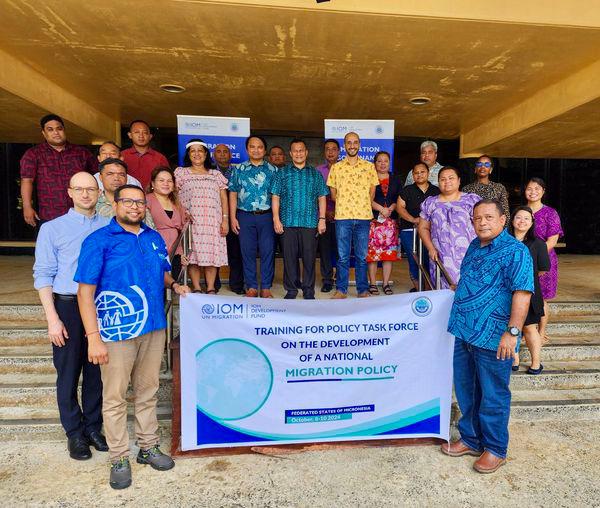
members with the skills and knowledge to craft a National Migration Policy tailored to the unique needs and priorities of FSM. The program runs from October 8 to October 10, 2024.
The Vice President expressed his gratitude to the International Organization for Migration (IOM) for partnering with the FSM Government on this initiative. “IOM’s expertise will be invaluable in supporting the efforts of the Taskforce,” he said.
The training, led by the International Organization for Migration (IOM), focuses on equipping taskforce
Among the attendees were IOM Chief of Mission Salvatore Sortino, Secretary of the Department of Resource & Development Hon. Elina Akinaga, Secretary of the Department of Education Hon. Gardenia Aisek, and newly appointed Secretary of the Department of Justice Hon. Leonito Bacalando Jr.
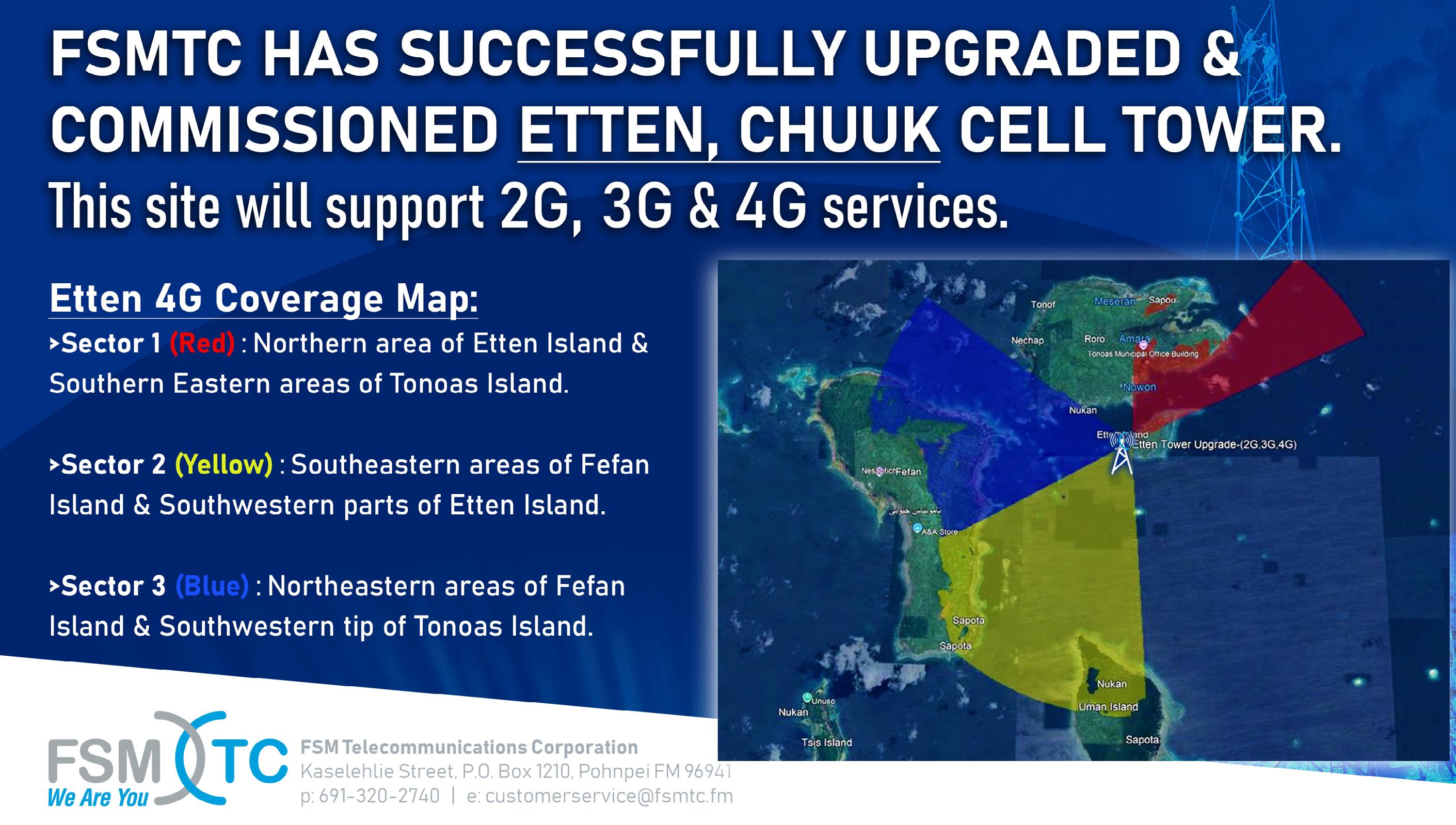

October 16, 2024
PALIKIR, Pohnpei—On October 8, 2024, the Honorable Vice President Aren B. Palik administered the Oath of Office to former Governor Reed B. Oliver, marking his reappointment to the Federated States of Micronesia (FSM) Banking Board.
Vice President Palik, in his capacity as the appointing authority, formally welcomed Mr. Oliver back to the FSM Banking Board, recognizing his decades of experience and service. Mr. Oliver has been a dedicated member of the Board for nearly 30 years, contributing significantly to the financial stability and growth of the FSM’s banking sector.
Following the oath, Mr. Oliver expressed his gratitude for the trust placed in him and shared his
enthusiasm for continuing to serve the nation. He emphasized the importance of the FSM Banking Board’s role in safeguarding the financial system and reaffirmed his commitment to working collaboratively with the new administration, board staff, and fellow members to ensure the continued success of the institution.
Vice President Palik, in his closing remarks, commended Mr. Oliver’s long-standing dedication to public service and expressed his confidence in the leadership and expertise Mr. Oliver brings to the FSM Banking Board. He also extended his thanks to the FSM Congress for their swift confirmation of Mr. Oliver’s appointment, highlighting the importance of experienced leadership in advancing the nation’s financial regulatory framework.

The ceremony was attended by members of the Cabinet, family members, and other distinguished guests, all of whom gathered to witness the reaffirmation of Mr. Oliver’s commitment to public service for the FSM.
The FSM Banking Board plays a critical role in overseeing the financial institutions within the country, ensuring their soundness, and protecting the interests of the public.
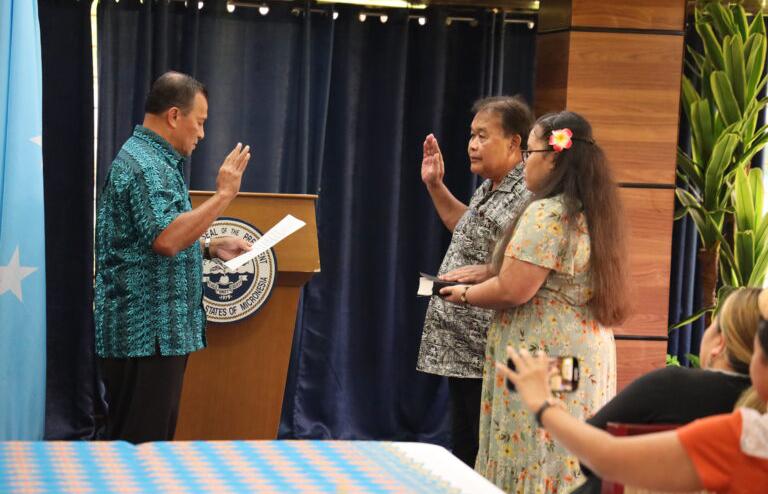
FSM Information Services
October 10, 2024
KOROR, Palau—The Honorable Aren B. Palik, Vice President of the Federated States of Micronesia (FSM) traveled to Koror, Palau, at the invitation of President Surangel Whipps Jr., to participate in the Republic of Palau’s 30th Independence Day celebrations. Vice President Palik arrived in Palau on September 30, 2024, to represent FSM in this significant milestone for the nation.
Upon his arrival, Vice President Palik paid a courtesy visit to President Whipps. The two leaders discussed key areas of mutual interest, reaffirming their commitment to enhancing regional cooperation, solidarity, and unity among the Micronesian nations. A particular focus of their conversation was strengthening ties within the Micronesian Presidents’ Summit, the next of which will be hosted by the Republic of Kiribati.
The central event of the celebrations took place on October 1, 2024, at the 24th Olechotel Belau Fair, held at the Palau Capital Government Building. Vice President Palik was among
the distinguished guests present as President Whipps delivered a keynote address to commemorate the occasion.
In addition to attending the Independence Day events, Vice President Palik met with FSM students enrolled at Palau Community College (PCC) and members of the FSM community living in Palau. These meetings allowed the Vice President to engage with FSM citizens abroad and underscore the importance of education and community ties.
Vice President Palik was accompanied on this official visit by Second Lady Adelita Palik, as well as a delegation from the FSM Office of the President and the Department of Foreign Affairs.
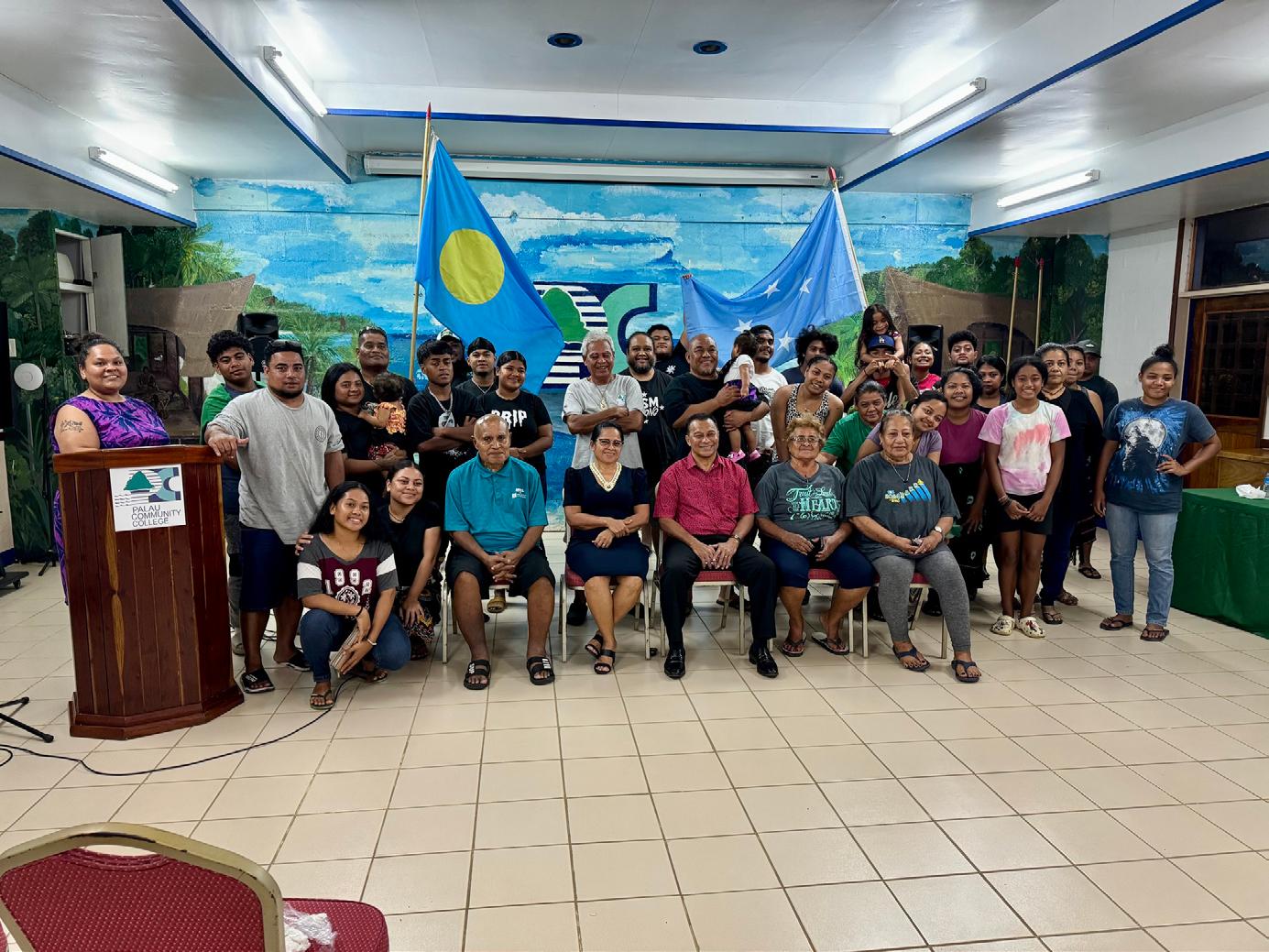
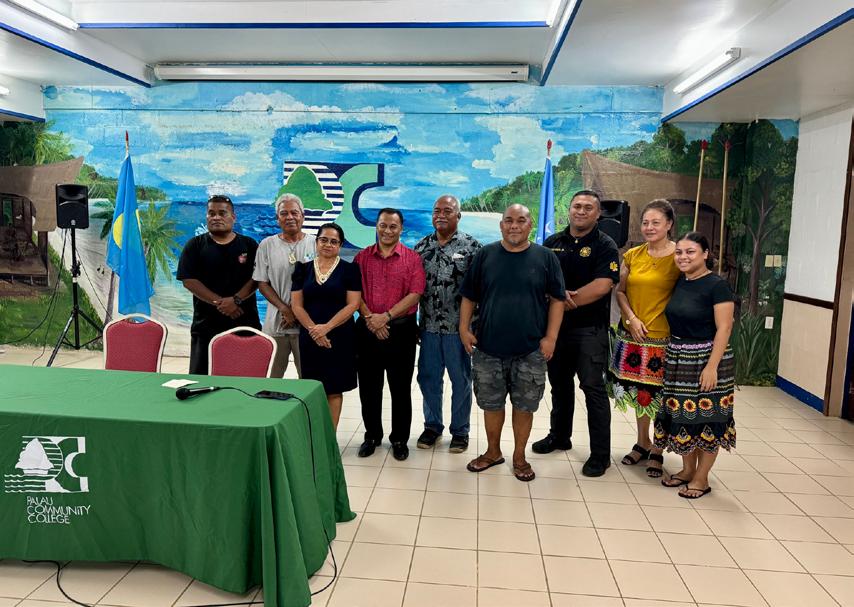
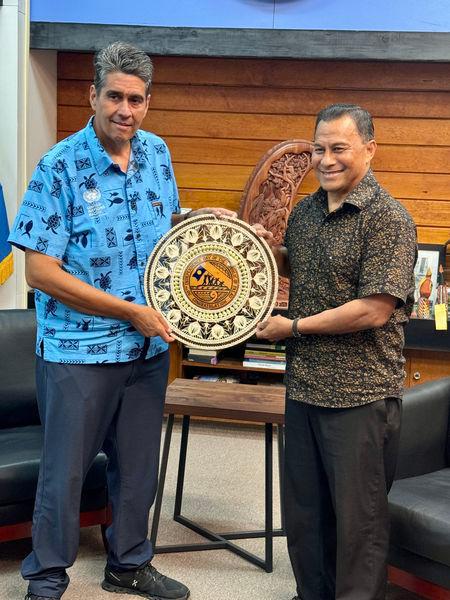
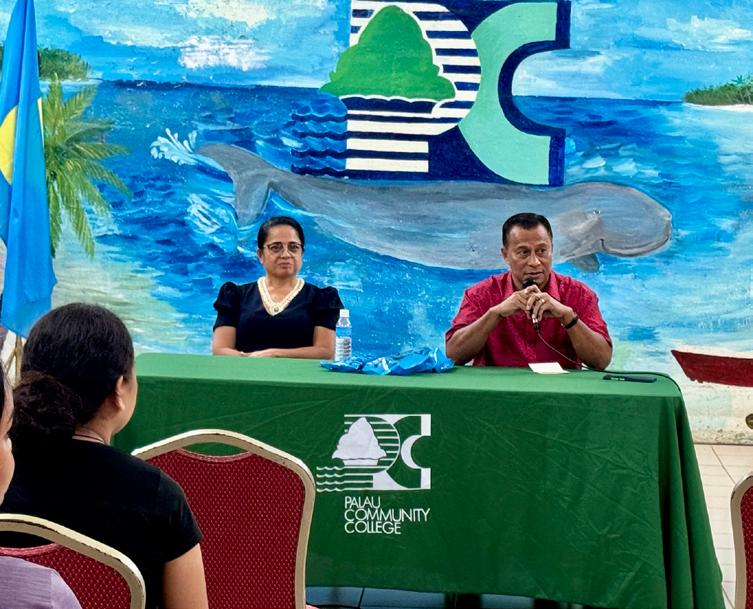

October 7, 2024
KOROR, Palau--His Excellency
Wesley W. Simina, President of the Federated States of Micronesia (FSM) met with a bipartisan U.S. Congressional delegation (CODEL) led by Senator Joe Manchin (D-WV), Chair of the Senate Committee on Energy and Natural Resources, to discuss the ongoing implementation of the Compact of Free Association (COFA) Amendments Act of 2024. The delegation, which also included Senator Lisa Murkowski (R-AK), Congressman David Trone (D-MD), Congressman Wiley Nickel (D-NC), Congressman Gregory Pence (R-IN) and Rear Admiral Gregory Huffman, Commander of the Joint Task Force Micronesia, was in the Pacific region to address key national security and energy issues and to strengthen partnerships with the Freely Associated States (FAS).
During the meeting, President Simina expressed his gratitude for the U.S. Congress’ leadership in securing the passage of the COFA Amendments Act. “I want to sincerely thank Chairman Manchin, Senator Murkowski, and the entire U.S. Congress for their bipartisan efforts in ensuring the successful passage of the COFA Act earlier this year,” said President Simina. “This landmark agreement reaffirms our strong and enduring partnership with the United States and enhances opportunities for the FSM and its citizens.”
President Simina emphasized the importance of timely and comprehensive implementation of the COFA Amendments Act, which promises expanded social services, education, and healthcare access for FSM citizens living both within the FSM and abroad, particularly in the United States. He expressed optimism that continued collaboration with U.S. federal agencies will ensure the smooth rollout of these services.
“We have seen tangible benefits from the Compact agreements already, but there are still areas where timely implementation is critical,” President Simina noted. “For example, we are awaiting further guidance from the Social Security Administration on
eligibility for Supplemental Security Income and hope to see progress soon. Additionally, we are eager for the Department of Health and Human Services to appropriate the necessary funding for Head Start programs in FSM to provide early childhood education support for our young citizens.”
A key topic of discussion was the care and support for FSM veterans who have served in the U.S. Armed Forces.
President Simina thanked Senator Murkowski for her leadership in addressing longstanding access issues through the Care for COFA Veterans Act but raised concerns over delays in engagement from the U.S. Department of Veterans Affairs.
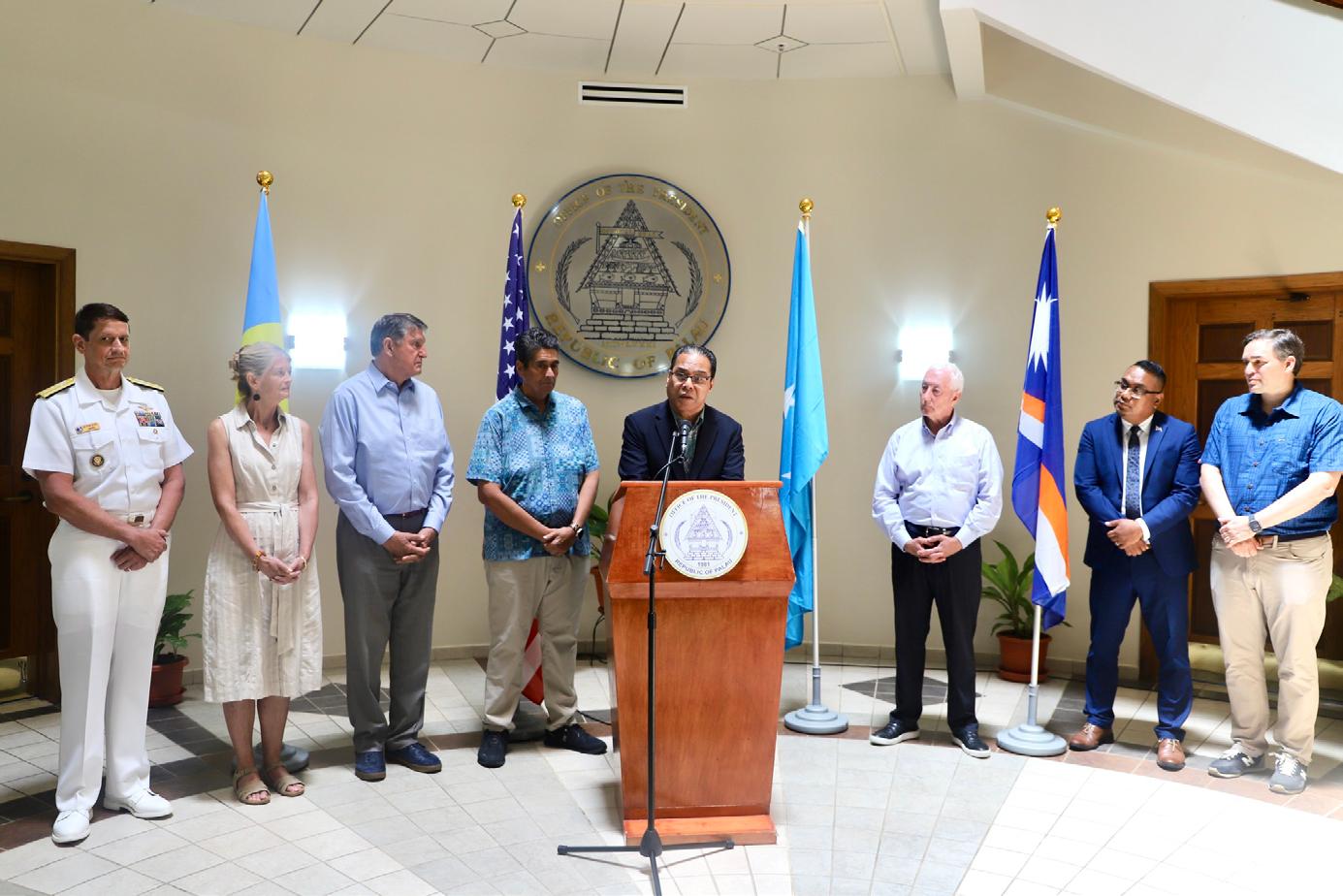
“Our service members sacrifice greatly in service of our common and shared values, and it is imperative that they receive the healthcare services and support they deserve,” President Simina stated. “We are hopeful that our recent meetings with the VA will lead to improved collaboration and solutions that address the needs of our veterans.” We are encouraged that our first official bilateral engagement with the U.S. VA is currently scheduled for within the next week.
Looking to the future, President Simina expressed his eagerness to explore new opportunities for deepening the U.S.-FSM relationship, including the potential restoration of the Peace Corps program in the FSM.
During a press conference President Simina highlighted his recent citizens outreach events in Texas and Hawaii stating “I am encouraged by the renewed and expanded services now available to FSM citizens through the Compact. The tangible benefits, from social services to educational opportunities, are making a real difference in the lives of our people abroad. As we move ahead, I look forward to maintaining momentum on Compact implementation to ensure these vital services are accessible to all those who need them, as we all envisioned.”
“We are deeply grateful for the continued support of the U.S. Congress, and I look forward to working together with the U.S. congress and executive branch to ensure that our Compact agreements are fully realized for the benefit of our citizens and our shared future,” President Simina concluded.
The U.S. Congressional delegation will continue their Pacific tour with additional stops in Australia and the Philippines.
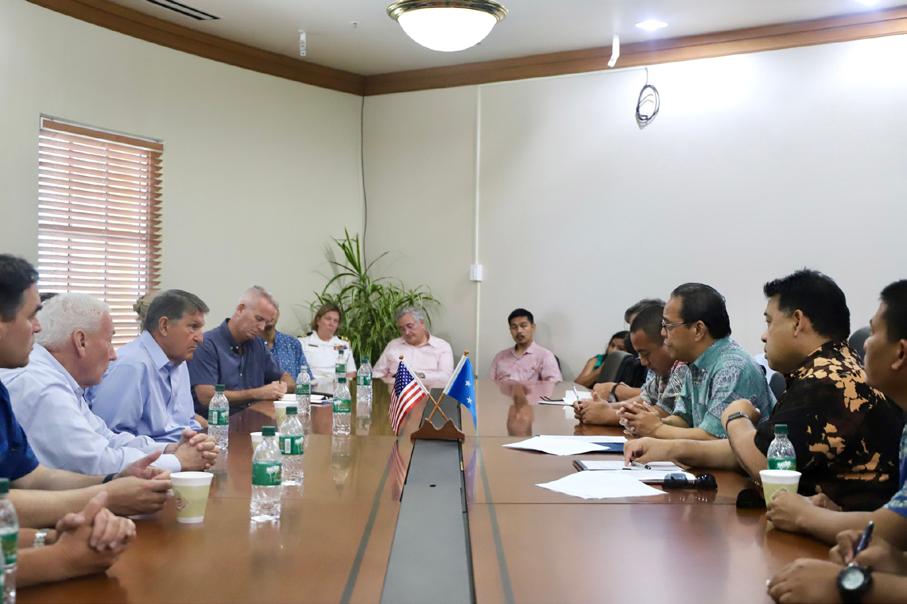
Embassy of the People’s Republic of China to the FSM
October 5, 2024
Pohnpei—On October 5, 2024, China Medical Team arrived in Pohnpei. The Chinese Ambassador to the FSM, H.E. Wu Wei, and the Acting Director of Pohnpei State Department of Health Services, Ms. Marcelle Gallen,
welcomed the team at the airport.
The team is composed of 7 people, who will start their medical services at the Pohnpei State Hospital, for a year.
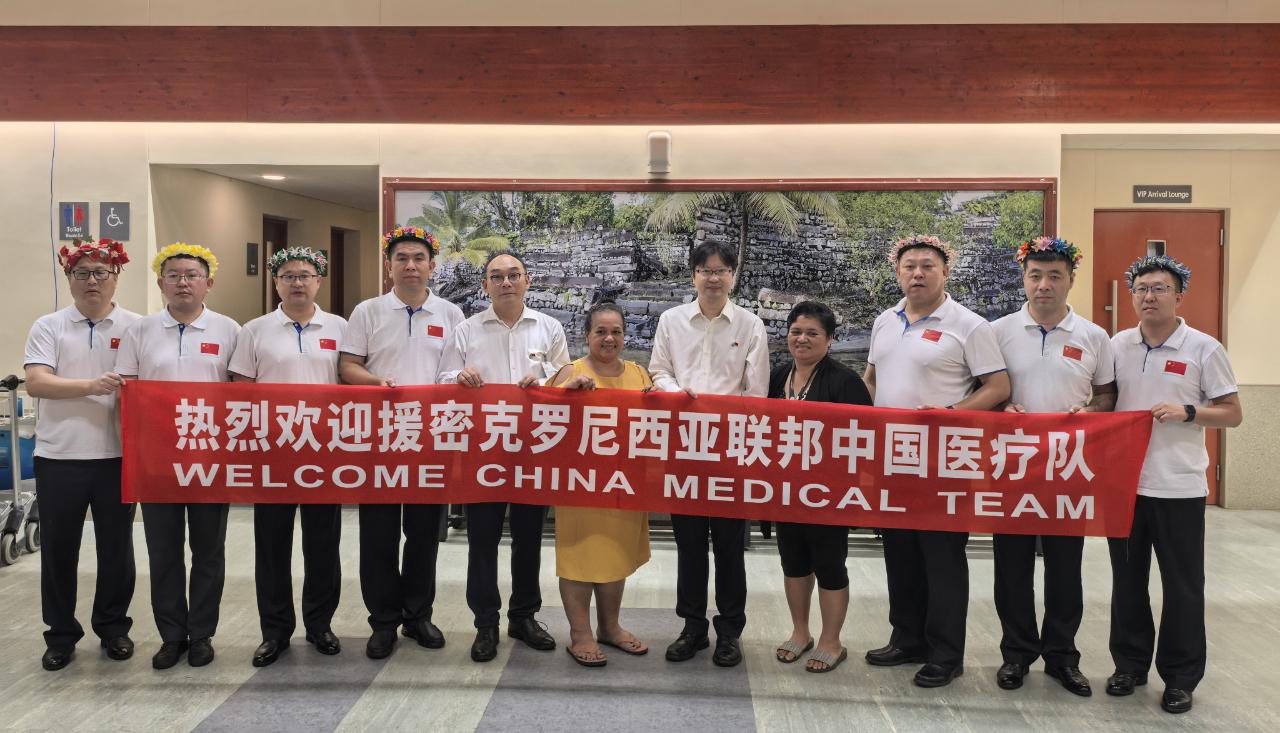

Yap Department of Youth and Civil Affair
October 17, 2024
Yap, FSM—An oversight hearing was held Wednesday regarding the operational issues surrounding the Hapilmohol 2 vessel, which serves as a vital link for the transportation of goods and passengers. The hearing, originally scheduled for last week, was delayed due to scheduling conflicts. Legislators and key officials gathered to address the challenges faced during the most recent voyage, which was abruptly canceled due to mechanical issues with the ship’s engine.
The oversight committee, led by Chairman Mafel, explained the difference between oversight hearings
and public hearings, noting that oversight serves as a tool to monitor and evaluate the implementation of legislation and public services. The purpose of this particular session was to assess the efficiency and reliability of the H2 vessel operations.
The hearing opened with remarks from Senator Masiwemai, who highlighted that the issue of the H2 vessel's performance has been ongoing for some time. The senator emphasized that the problems seem to be worsening, expressing concerns over service quality provided to the community.
Testimony from officials, including the ship’s chief engineer, detailed that the voyage was halted due to a leak in the lube oil cooler of one of the main
engines. Despite attempts to fix the issue overnight, the necessary repairs could not be completed in time, leading to the suspension of the trip. Safety concerns were cited as the primary reason for the decision, as the vessel could not operate safely with only one functional engine.
The hearing also addressed broader concerns related to service standards and port operations. Some senators voiced dissatisfaction with how passengers and cargo are managed, citing complaints of long wait times, difficulties in accessing the ship during inclement weather, and confusion around parking and security at the port. Officials from the Public Works Department and port management responded by outlining the security
regulations that govern port operations, noting that these rules are part of international shipping and port security standards.
Further discussions involved the future resumption of services, as officials are awaiting the arrival of replacement parts from China to repair the engine. The timeline for the resumption of regular services remains uncertain, pending the arrival and installation of the necessary components.
The oversight committee plans to continue monitoring the situation and will explore potential improvements to port infrastructure, including the possible construction of a dedicated terminal to improve passenger and cargo handling.
U.S. Department of Agriculture Forest Service
October 21, 2024
The Institute of Pacific Islands Forestry (IPIF) of the USDA Forest Service is conducting outreach for the USDA Forest Service - US-Affiliated Pacific Islands (US-API) Graduate Fellowship at the University of Hawai’i at Hilo for Fall 2025. We are pleased to announce the availability of one graduate fellowship for a student dedicated to a career in forestry, conservation biology, and environmental science in the US-API at UH Hilo in the Tropical Conservation Biology and Environmental Science (TCBES) Graduate Program (http:// tcbes.uhh.hawaii.edu/). In addition to working with a faculty member in TCBES, the student will also be mentored by a research scientist at IPIF (https://research.fs.usda.gov/psw/ programs/ipif#people) to develop a project in the US-API (Guam, American Samoa, Commonwealth of the Northern Mariana Islands, Republic of Palau, Republic of the Marshall Islands, and the Federated States of Micronesia). The fellowship comes with generous support for 2 years, including a stipend, tuition costs, health insurance, and costs for travel and supplies needed to conduct research work associated with the research project. The fellowship recipient is expected to work with their IPIF mentor part-time in the school year
and full-time in the summer break.
Through research, knowledge sharing, and partnership the Institute provides scientific and technical information needed to restore, conserve, and sustain tropical forests and wetlands of the Pacific. The overall goal of the USFS graduate fellowship program in TCBES is to help develop the next generation of forestry and environmental leaders in the US-API. The following eligibility criteria apply: (i) acceptance to the TCBES graduate program for Fall 2025 and pursuing a M.S. degree in TCBES (either Thesis Track or Professional Internship Track); (ii) have a letter of support from an IPIF scientist stating acceptance to serve as a mentor for the fellowship; (iii) have a letter of support from a natural resource agency/organization based in the US-API; (iv) track record of supporting the US-API’s environment (e.g., internships, volunteer opportunities) or demonstrated leadership potential (academic, extracurricular, and/or professional); and (v) commitment to attaining and pursuing a long-term career in forestry, conservation biology, or environmental science in the US-API.
Application Details:
• If you are not currently a TCBES graduate student, you must first apply to the TCBES program submitting all required material for admissions to TCBES (either Thesis Track or Professional Internship Track). The priority deadline for TCBES is December 1, but applications will continue to be accepted after that on a rolling basis until all slots are filled. See the Graduate School Admission website for more information (https://hilo.hawaii.edu/academics/ graduate/) and the TCBES website (http://tcbes.uhh. hawaii.edu/apply). Once you have been accepted into the TCBES program, you can then apply for the IPIF US-API Graduate Fellowship.
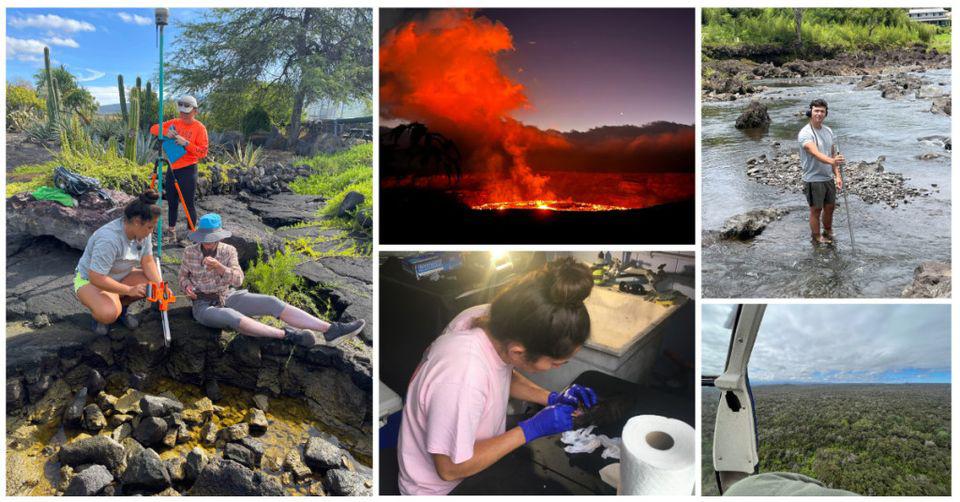
• Current TCBES graduate students are eligible, but preference may be given towards incoming students.
• Applications for the IPIF US-API Graduate Fellowship will be accepted starting January 1, 2025 with a March 1, 2025 deadline for priority consideration. Applications will be accepted after March 1st on a rolling basis until the fellowship is filled.
• Send a complete application packet to: Amanda Uowolo (Amanda.L.Uowolo@usda.gov) with “IPIF US-API Graduate Fellowship Application Fall 2025” in the subject line. A complete application includes:
• A copy of the TCBES acceptance letter
• Undergraduate and/or post-graduate transcript(s) (unofficial are fine)
• A personal statement (1000 words maximum), written as a coherent narrative that tells your story. The personal statement should address the following: (i) What experiences have led you to want to pursue a Master's degree in tropical conservation and environmental science? (ii) How will acquiring a Master's degree in tropical conservation and environmental science support your short-term and long-term career goals, as well as benefit the US-API? (iii) What personal attributes make you well-suited and committed to studying and stewarding the environment in the US-API?

International Organization for Migration Asia and Pacific Regional Office
October 17, 2024
FSM—The Federated States of Micronesia (FSM) continues to make strides in the development of a national migration policy. From 8 to 10 October, the FSM Migration Policy Development Task Force, launched in August 2024, and the International Organization for Migration (IOM) successfully concluded their first in-depth migration governance training.
The Essentials of Migration Policymaking training, IOM’s flagship migration governance programme, served as a platform for key government stakeholders to examine migration trends within the FSM, align the trends with regional and global frameworks, and develop skills in policy design and implementation.
The Vice President of the FSM, The Honourable Aren B. Palik, opened the event, emphasizing the importance of a whole-ofgovernment approach inclusive of national and state actors. “We must begin and take a holistic and comprehensive approach because many of the challenges encountered in relation to migration are multifaceted,” he stated.
He urged the task force to critically examine and identify relevant migration-related issues that will inform the government’s decision-making processes. He also highlighted the importance of effective reintegration programmes for FSM citizens returning to their places of origin from the United States.
The Honourable Leonito Bacalando Jr., Secretary of the Department of Justice and Chairman of the Migration Policy Development Task Force, said, “Migration policy is crucial for several reasons. Among others, it provides a roadmap for human rights protection, especially of vulnerable migrant populations. Migration can also harness the skills and talents of migrants; many FSM citizens who find opportunities overseas contribute significantly to the FSM's economic development once they return home.”
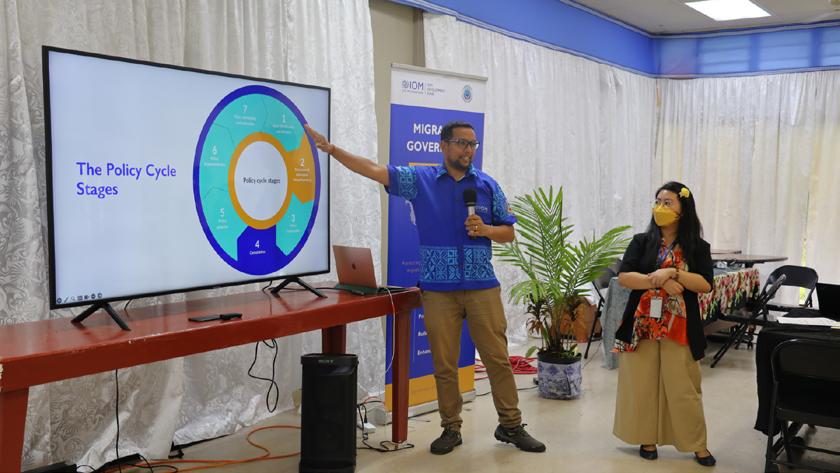
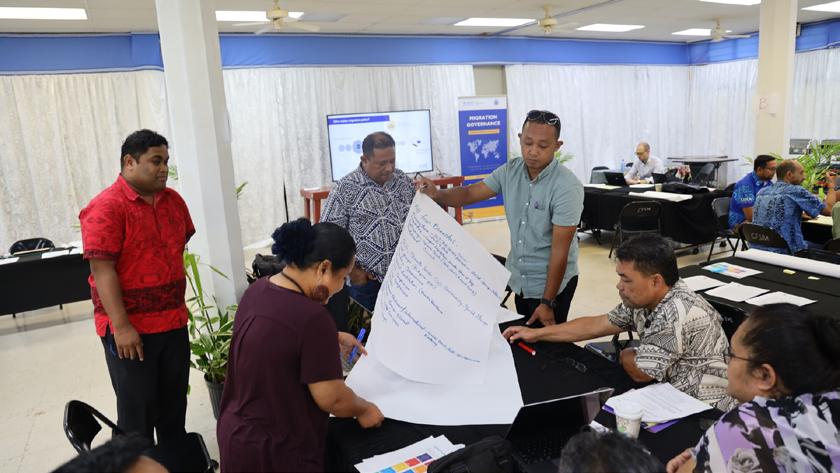
Migration policy development is particularly beneficial to the FSM because of its Compact of Free Association Agreement with the United States, which allows FSM citizens to live and work in the United States without a visa. This agreement provides opportunities for youth who wish to pursue work and education abroad, leading to a steady outflow of young, skilled citizens who live in the United States for extended periods.
Hon. Bacalando underlined the importance of developing programmes to engage FSM diaspora populations in the United States. These programmes, he noted, would maximize the benefits of remittances, boost the local economy, and support communities in the FSM.
The training sessions included the components of the policy cycle, migration-related legislation, migration and climate change, and an experience-sharing session with IOM Solomon Islands on return and reintegration.
IOM Micronesia Chief of Mission, Salvatore Sortino, commended the FSM’s efforts in strengthening migration governance. He reiterated “IOM's commitment to supporting the Government of FSM in establishing sound migration governance strategies and programmes, which can respond to the challenges and opportunities identified during the training.”
Supported by the IOM Development Fund, IOM works to
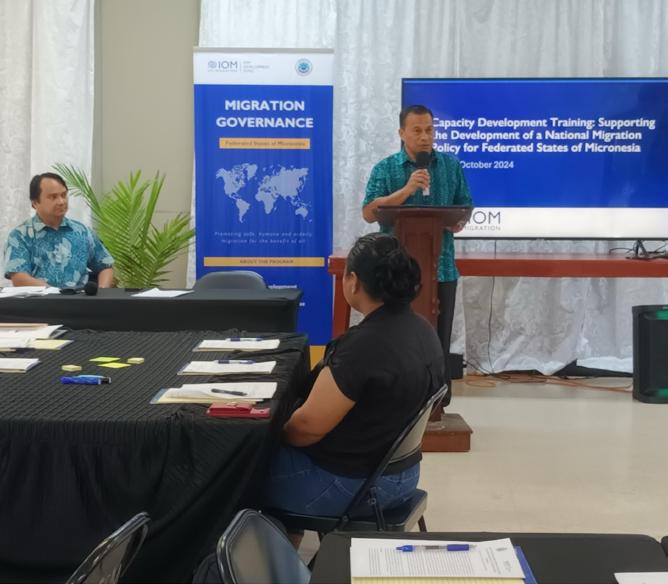
strengthen the capacities of governments and other stakeholders to develop, implement, review and revise policies that leverage migration as a resource for sustainable development and as part of the solution to pressing challenges.
Looking ahead, the Migration Policy Development Task Force will concentrate on spearheading the consultations with relevant stakeholders, including the state governments, non-government entities, and migrant communities. Additionally, IOM is conducting research to identify migration trends and patterns that will inform the migration policy development for the FSM.
Australian Embassy to the FSM
October 10, 2024
Pohnpei—Fourteen FSM community participants who completed the Australian Volunteers Program Online Grant Writing training course have received certificates from Ambassador Jenny Grant-Curnow.
The training was delivered over four sessions by volunteer Australian Janet Dawson between July and August 2024 to 180 participants from more than 40 organizations across the Pacific. Participants learned how to write a compelling application, develop a budget and deliver financial reporting.
In her remarks, the Ambassador noted the importance of good grant writing to help community organizations access funding. She underscored the good work of the Australian Volunteers Program in the North Pacific.
The training was timely as our Direct Aid Program (DAP) fund applications is now open. https://fsm. embassy.gov.au/phpi/110110.html
The Australian Volunteers Program is planning more on-line and in-country training. Discover more about how the Australian Volunteer Program works with partner organisations at https://www. australianvolunteers.com/partners
Congratulations to all the participants.
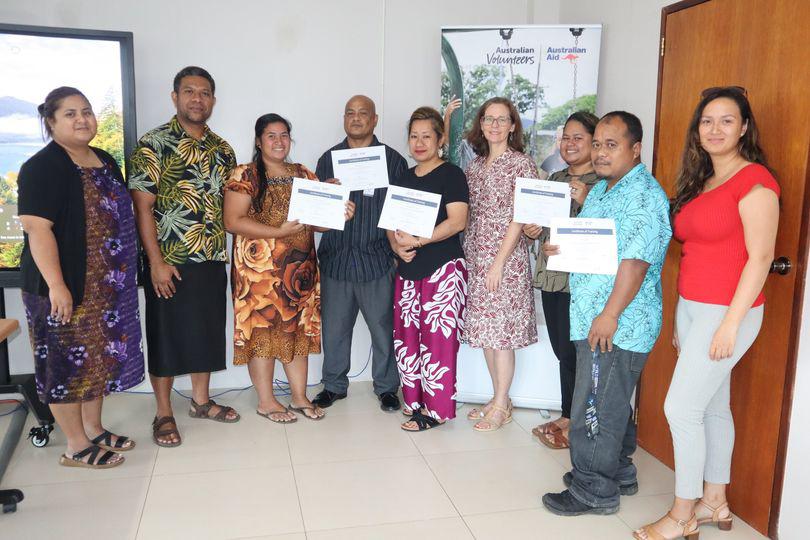

October 17, 2024
Manila, Philippines—According to a new report released today, countries in the World Health Organization (WHO) Western Pacific Region experienced the smallest decline in life expectancy during the COVID-19 pandemic compared to other WHO regions. Life expectancy in the Western Pacific fell by only 0.07 years during 2020-21, a minimal drop compared to the global average decline of 1.7 years. The Western Pacific now has the highest life expectancy among WHO’s six regions, rising from 72.0 years in 2000 to 77.4 years in 2021.
However, despite this progress, the Region – comprising 37 countries and areas across Asia and the Pacific – is still grappling with critical challenges and is off-track in achieving the healthrelated Sustainable Development Goals (SDGs). The SDGs are the global goals adopted by world leaders to end poverty and inequality, protect the planet and ensure that all people enjoy health, justice and prosperity by 2030. The new WHO report, Health statistics in the Western Pacific Region 2023: Monitoring health for the SDGs, highlights advancements made across the Region while also emphasizing the urgent need for action. The report shows that while the COVID-19 pandemic may have done less damage to life expectancy in the Western Pacific
than other regions, it nevertheless exacerbated health inequalities and disrupted progress in other areas.
diseases on the rise
While infectious diseases and injuries were previously major causes of illness and death in the Western Pacific, the Region is undergoing a significant epidemiological shift. Noncommunicable diseases (NCDs) like heart disease, stroke, diabetes and cancer now account for nearly nine in 10 deaths. While the probability of premature death from NCDs has declined in the Region by over 25% since 2000, major challenges remain. Moreover, the Region is experiencing rapid population ageing. There are now more than 245 million people aged 65 and older in the Region – a number that is projected to double by 2050. And many older people are living with NCDs.
A major risk factor for NCDs is alcohol and tobacco use. Consumption of alcohol in the Region has risen by 40% since 2000. Despite a decline from 7.2 litres per capita per year in 2015 to 6.1 litres in 2019, the overall increase highlights an ongoing concern for public health. Similarly, although tobacco use declined from 28.0% of adults smoking in 2000 to 22.5% in 2022, this was still above the global average of 20.9%.
Mental health issues are also taking their toll on the population, with alarmingly high suicide rates in some countries of the Western Pacific Region, influenced by factors such as stigma, limited access to mental health services and socioeconomic challenges.
Climate- and environment-related health concerns are yet another major challenge. While air pollution in urban areas of the Region was found to have decreased from 2010 to 2019, air quality levels are still much worse than the WHO-recommended levels. Populations living in urban areas are therefore continuing to breathe unhealthy air.
Mixed progress towards universal health coverage
Universal health coverage (UHC) is another important SDG target for which the Western Pacific Region has had mixed progress. The UHC service coverage index measures access to essential health services such as reproductive, maternal, newborn and child care, and prevention and treatment services for both NCDs and infectious diseases. Over the past 20 years, the overall UHC service coverage index in the Western Pacific increased impressively, from 49 to 79 points out of 100 between 2000 and 2021. However, people’s ability to access health-care services varies
greatly across the Region. In some countries, the UHC service coverage index score is as low as 30, meaning many people struggle to access basic health care, while in others, it exceeds 80, indicating a much higher level of service availability and coverage. Despite these advancements, progress has slowed and stagnated since the adoption of the SDGs in 2015, and particularly since 2019.
Despite the growing burden of noncommunicable diseases, access to essential health services for NCDs did not improve significantly, increasing only slightly from 52 points in 2000 to 58 points in 2010. Even more troubling, there has been no further progress since 2010, and access to services remains low, particularly in Pacific island countries and areas.
In contrast, access to services for infectious diseases improved significantly, rising from just 18 points in 2000 to 82 points in 2021. Immunization coverage for the WHOrecommended three doses against diphtheria, tetanus and pertussis, or DTP3, showed mixed results from 2000 to 2023: coverage increased in 15 countries, while four countries experienced no change and eight saw a decrease.
In the Western Pacific Region, average health spending has increased
See continuation on next page
Australian Department of Foreign Affairs and Trade
October 16, 2024
Australia and Palau are pleased to announce Qantas has been selected to operate the Palau Paradise Express, a direct flight service connecting Brisbane, Australia and Koror, Palau.
This service, which commenced in May this year, is supported by the Government of Australia and the Government of Palau and is expected to operate through to at least November 2025.
The Palau Paradise Express boosts air connectivity in the Pacific promoting tourism, trade and stronger people to people links.
This announcement comes as Australia and Palau celebrate 30 years of diplomatic relations, demonstrating the warmth and strength of our relationship.
Quote attributable to:
“We appreciate Australia for partnering with us to promote economic activity between our two nations. The flight makes it easier
for tourists and businesspeople to travel between our two nations and encourages trade and commerce,” President Surangel S. Whipps, Jr. President of the Republic of Palau said. “It also provides opportunities to work together, building people to people relationships, supporting education, and work force training that is already taking place. We look forward to welcoming more Australians to Palau and trust that this continued partnership in aviation will further extend our already broad and warm relationship with Australia.”
Quote attributable to:
“Australia and Palau have partnered to expand connectivity in the Pacific, and increase tourism, trade and business opportunities”, said Australia’s Minister for Foreign Affairs, Senator the Hon Penny Wong. “The Palau Paradise Express is a demonstration of the closeness of our partnership with Palau.
“Australia is working with the Pacific, and investing in a resilient and sustainable aviation sector which supports a more connected and prosperous region,” she said.
Continued from previous page
substantially, tripling from around US$ 383 per person in 2000 to US$ 1336 in 2021. On average, health spending accounted for 6.6% of gross domestic product (GDP) at country level in 2000, and rose to 8.2% by 2021. However, despite efforts to increase public spending for health, the proportion of people in the Western Pacific experiencing catastrophic health expenditure − defined as spending more than 10% of their income on health-care − has nevertheless doubled, rising from 9.9% in 2000 to 19.8% in 2019.
Critical action needed to achieve SDGs
“While we celebrate the significant health gains that the Western Pacific Region has achieved, we must also acknowledge urgent challenges in sustaining progress,” said Dr Saia Ma’u Piukala, WHO Regional Director for the Western Pacific. “We are living longer than ever, and more than any other region of the world, but this isn’t enough. We’re off-track to meet many of the SDG targets, and the COVID-19 pandemic exacerbated health disparities. Now is the time for concerted action to address these issues. We look forward to working with health leaders from across the Region next week to finalize our new vision to weave health for families, communities and societies.”
Ministers of health and other senior officials are preparing for discussions at the seventy-fifth session of the WHO Regional Committee for the Western Pacific in Manila on 21−25 October 2024. The meeting will focus on the most pressing health needs in the Region and chart a course to address them.
Weaving health for families, communities and societies in the Western Pacific Region (2025-2029): Working together to improve health, well-being and save lives is the
proposed new vision for the Region. The vision centres on the analogy of weaving a mat – a traditional activity across Asia and the Pacific
– symbolizing the collaborative efforts required by WHO, governments and partners to improve population health and well-being. The vision centres on five vertical strands of action led by governments interwoven with three horizontal strands of action by WHO.
The five vertical strands of action led by governments, working with WHO and other stakeholders include:
1. Transformative primary health care for UHC
2. Climate-resilient health systems
3. Resilient communities, societies and systems for health security
4. Healthier people throughout the life course
5. Technology and innovation for future health equity.
The three horizontal strands of action by WHO are:
1. Country offices equipped with skills for scaling up and innovation
2. Nimble support teams in the Regional Office
3. Effective communication for public health.
These strands reflect the reality that the Western Pacific Region faces complex health challenges that cannot be addressed by the health sector alone. Achieving the goals of SDG 3 − Good health and well-being – will require a concerted effort from multiple sectors. Social determinants of health, including education, housing, employment, social protection, gender equality and the environment, significantly impact health outcomes. Therefore, collaboration between the health, education, urban planning, agriculture and environmental sectors, to name but a few, is crucial. Collaboration can create synergies and co-benefits for all these sectors while accelerating progress towards achieving SDG 3.
“The commitment of governments, WHO and partners to achieving the Sustainable Development Goals by 2030 is a commitment to health and well-being for all,” added Dr Piukala. “We must work together to ensure that no one is left behind as we weave a healthier future.”
In addition to the vision, the Regional Committee will also consider new regional action frameworks on digital health and on health financing to achieve UHC and sustainable development. There will be panel discussions on climate-resilient health-care facilities, transformative primary health care and oral health, as well as a special event on the Investment Round to resource WHO’s work for 2025–2028.

October 15, 2024
Suva, Fiji— The World Bank today launched its latest Pacific Economic Update, calling for a major boost in investment to address the region's slowing economic growth. The report, Diminishing Growth amid Global Uncertainty: Ramping Up Investment in the Pacific, underscores the urgent need for targeted investment to create jobs, improve infrastructure, and build resilience against climate change amid global uncertainty. These actions are crucial for improving the livelihoods of Pacific communities and narrowing the income gap with higher-income nations.
The report highlights that growth across the Pacific has fallen to 3.6 percent in 2024, down from 5.8 percent in 2023 as the post-pandemic rebound fades. Growth is settling into a slower pace, signaling a weaker outlook compared to past performance. This slowdown is attributed to weaker investment, increasing climate risks, and structural challenges, all amid continuing global uncertainty that continues to hold back progress. The report emphasizes that without immediate action to ramp up investment, Pacific nations may struggle to reduce poverty or generate new economic opportunities for the region’s people.
"The Pacific faces mounting challenges, but there is also an opportunity for transformation," said Stephen N. Ndegwa, World Bank Country Director for the Pacific and PNG. "By prioritizing investments in key sectors and increasing efficiency, Pacific countries can unlock economic growth that directly benefits local communities, creates jobs, and strengthens resilience to the impacts of climate change."
The Pacific Economic Update offers six key recommendations to drive investment and ensure local communities benefit from economic growth. These include greater investment in high-potential sectors like agriculture, sustainable tourism, and the blue economy, which can create jobs and support rural livelihoods. Improving infrastructure—such as roads, ports, and energy systems—will boost connectivity, enabling businesses to expand and creating more job opportunities.
Building fiscal and climate resilience is also critical. Investing in climate-resilient infrastructure, improving disaster preparedness, and building up financial reserves will protect communities from future shocks and ensure stability. Attracting private investment will require regulatory reforms to make it easier for businesses to operate, which will promote growth in key sectors and foster local development.
Finally, enhancing access to finance, particularly for small businesses, will be essential for promoting sustainability and driving long-term growth. The report stresses the need to leverage international financial support to drive high-impact projects that directly benefit Pacific communities.
The Economic Update highlights that with the right policies boosting investment, Pacific nations can overcome current economic challenges, build a more resilient future, and create tangible benefits for communities, businesses, and governments across the region.